gender pay gap
description: average difference in remuneration amounts between men and women
90 results
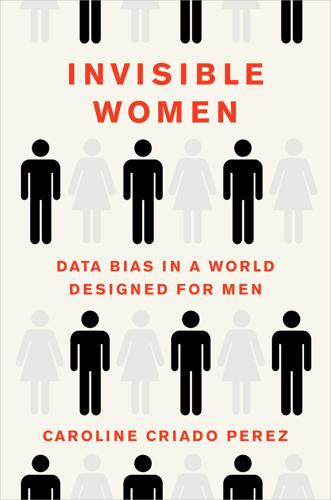
Invisible Women
by
Caroline Criado Perez
Published 12 Mar 2019
In any case, fifty year’s worth of US census data46 has proven that when women join an industry in high numbers, that industry attracts lower pay and loses ‘prestige’,47 suggesting that low-paid work chooses women rather than the other way around. This choice-that-isn’t-a-choice is making women poor. A recent Organisation for Economic Co-operation and Development (OECD) study found that the gender pay gap in hourly wages is substantially higher in countries where women spend a large amount of time on unpaid care compared to men.48 In the UK, women make up 61% of those earning below the living wage,49 and the Institute for Fiscal Studies has found that the gender pay gap widens over the twelve years after a child is born to 33%, as women’s careers – and wages – stagnate.50 The US pay gap between mothers and married fathers is three times higher than the pay gap between men and women without children.51 Over time, these pay gaps add up.
…
A recent paper expressed bafflement at how ‘many OECD countries’ were passing legislation in an attempt to reduce the gender pay gap while at the same time effectively increasing it through their family tax and transfer systems.24 Two such countries are the UK and Australia where, although married couples file separate income tax returns, most benefits and tax credits still breach the principle of independent taxation. The UK’s Marriage Allowance gives the main wage earner (usually the man) a tax break in couples where the lower earner is on £11,500 or less.25 This bolsters the gender pay gap on two fronts: supplementing male income, while also creating a perverse incentive for women to work fewer paid hours.
…
: Women Scientists with Feminine Appearance are Deemed Less Likely to be Scientists’, Sex Roles, 75:3–4, 95–109 43 Bian, Lin, Leslie, Sarah-Jane and Cimpian, Andrei (2017), ‘Gender stereotypes about intellectual ability emerge early and influence children’s interests’, Science, 355: 6323, 389–391 44 https://genderedinnovations.stanford.edu/institutions/bias.html 45 https://www.theguardian.com/commentisfree/2016/may/31/women-science-industry-structure-sexist-courses-careers 46 Grunspan, Daniel Z., Eddy, Sarah L., Brownell, Sara E., Wiggins, Benjamin L., Crowe, Alison J., Goodreau, Steven M. (2016), ‘Males Under-Estimate Academic Performance of Their Female Peers in Undergraduate Biology Classrooms’, PLoS ONE, 11:2 47 Schmader, Toni, Whitehead, Jessica and Wysocki, Vicki H. (2007), ‘A Linguistic Comparison of Letters of Recommendation for Male and Female Chemistry and Biochemistry Job Applicants’, Sex Roles, 57:7–8, 509–14; Madera, Juan M., Hebl, Michelle R. and Martin, Randi C. (2009), ‘Gender and letters of recommendation for academia: Agentic and communal differences’, Journal of Applied Psychology, 94:6, 1591–9; Dutt, Kuheli, Pfaff, Danielle L., Bernstein, Ariel F., Dillard, Joseph S. and Block, Caryn J. (2016), ‘Gender differences in recommendation letters for postdoctoral fellowships in geoscience’, Nature Geoscience, 9, 805–8 48 Madera et al. (2009) 49 https://www.nature.com/news/women-postdocs-less-likely-than-men-toget-a-glowing-reference-1.20715 50 Trix, Frances and Psenka, Carolyn (2003), ‘Exploring the Color of Glass: Letters of Recommendation for Female and Male Medical Faculty’, Discourse & Society, 14:2, 191–220 51 Ibid. 52 Madera at al. (2009) 53 Nielsen, Mathias Wullum, Andersen, Jens Peter, Schiebinger, Londa and Schneider, Jesper W. (2017), ‘One and a half million medical papers reveal a link between author gender and attention to gender and sex analysis’, Nature Human Behaviour, 1, 791–6 54 http://gap.hks.harvard.edu/effects-gender-stereotypic-and-counter-stereotypic-textbook-images-science-performance 55 https://www.cs.cmu.edu/afs/cs/project/gendergap/www/papers/anatomy-WSQ99.html 56 Light, Jennifer S. (1999), ‘When Computers Were Women’, Technology and Culture, 40:3, 455–483 57 Ensmenger, Nathan L. (2010), The Computer Boys Take Over: Computers, Programmers, and the Politics of Technical Expertise, Cambridge MA 58 https://www.theatlantic.com/business/archive/2016/09/what-programmings-past-reveals-about-todays-gender-pay-gap/498797/ 59 http://thecomputerboys.com/wp-content/uploads/2011/06/cosmopolitan-april-1967–1-large.jpg 60 https://www.theatlantic.com/business/archive/2016/09/what-programmings-past-reveals-about-todays-gender-pay-gap/498797/ 61 Ensmenger, Nathan L. (2010) 62 Ibid. 63 https://www.hfobserver.com/exclusive-content/q4-top-recruiting-department-hires-and-an-acquisition/ 64 https://www.theguardian.com/science/2016/sep/01/how-algorithms-rule-our-working-lives 65 https://www.theatlantic.com/technology/archive/2013/11/your-job-their-data-the-most-important-untold-story-about-the-future/281733/ 66 https://onlinelibrary.wiley.com/doi/abs/10.1111/j.1471–6402.2008.00454.x; Hannah Riley Bowles, Linda Babcock and Lei Lai (2007), ‘Social incentives for gender differences in the propensity to initiate negotiations: Sometimes it does hurt to ask’, Organizational Behavior and Human Decision Processes, 103, 84–103. 67 https://www.nytimes.com/2012/08/23/technology/in-googles-inner-circle-a-falling-number-of-women.html 68 https://www.physiology.org/doi/10.1152/advan.00085.2017 69 https://www.newyorker.com/magazine/2017/11/20/the-tech-industrys-gender-discrimination-problem 70 https://medium.com/@triketora/where-are-the-numbers-cb997a57252 71 http://www.independent.co.uk/news/business/news/workplace-gender-quotas-incompetence-efficiency-business-organisations-london-school-economics-lse-a7797061.html 72 http://web.mit.edu/fnl/volume/184/hopkins.html 73 http://www.cwf.ch/uploads/press/ABusinessCaseForWomen.pdf 74 https://madebymany.com/stories/can-a-few-well-chosen-words-improve-inclusivity 75 Gaucher, D., Friesen, J. and Kay, A.
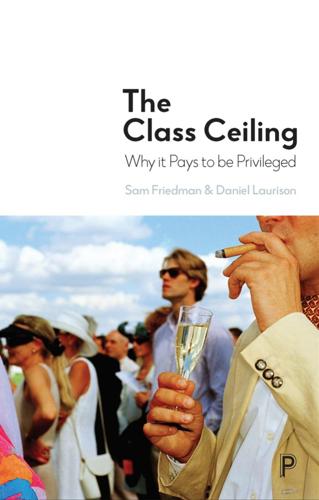
The Class Ceiling: Why It Pays to Be Privileged
by
Sam Friedman
and
Daniel Laurison
Published 28 Jan 2019
Both are longstanding and much-loved BBC personalities, yet in 2017 Balding earned only one-tenth of Lineker’s £1.75m salary.1 In the days following the report, countless prominent figures – both inside and outside the organisation – lined up to denounce a normalised culture of gender discrimination at the BBC.2 The embattled BBC Director-General, Tony Hall, took swift action, authorising an immediate audit of staff pay,3 promising to end the gender pay gap by 2020 and later agreeing to reduce the salaries of six highly paid male presenters.4 This scandal is significant for several reasons. First and foremost, it reveals the sheer scale of gender inequality at the upper echelons of British society. At the same time, however, it also shows the significant progress that has been made in elevating the gender pay gap to the top of the public agenda. After decades of campaigning and countless high-profile studies, pay gaps by gender (and, to a lesser extent, ethnicity) are now 45 The Class Ceiling finally being meaningfully and pragmatically addressed.
…
For the US, see Jencks et al (1972), Pfeffer (1977) and Torche (2011); for Sweden, see Hällsten (2013); for Norway, see Flemmen (2009) and Hansen (2001); for Scandinavia see (Hansen, 2001; Flemmen, 2009; Hällsten, 2013), and France (Falcon, nd). The scale and patterning of the UK gender pay gap is explored more extensively in Olsen (2010) and Olsen et al (2018), and the UK ethnicity pay gap in Longhi et al (2013) and Longhi and Brynin (2017). Recall that the gender pay gap in top jobs is on average £10,000 a year and the class pay gap (between those from privileged and working-class origins) is £6,400. Working-class women, however, earn £18,900 less than privileged men. Woodhams et al (2015).
…
O’Brien, D., Allen, K., Friedman, S. and Saha, A. (2017) ‘Producing and consuming inequality: A cultural sociology of the cultural industries’, Cultural Sociology, 11(3), 271-82 (https://doi.org/10.1177/1749975517712465). Olsen, W. (2010) The gender pay gap in the UK 1995–2007, London: Government Equalities Office (www.escholar. manchester.ac.uk/uk-ac-man-scw:75226). Olsen, W., Gash, V., Kim, S. and Zhang, M. (2018) The gender pay gap in the UK: Evidence from the UKHLS, London: Government Equalities Office (www.gov.uk/government/publications/thegender-pay-gap-in-the-uk-evidence-from-the-ukhls). 348 References Notes ONS (Office for National Statistics) (2016) Quarterly Labour Force Survey, 2013–2016, UK Data Archive, Social Survey Division, Northern Ireland Statistics and Research Agency, Central Survey Unit (https://discover.ukdataservice.ac.uk/ series/?
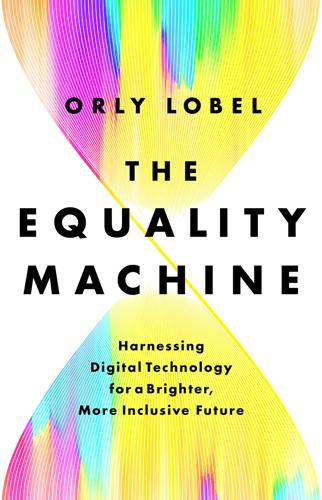
The Equality Machine: Harnessing Digital Technology for a Brighter, More Inclusive Future
by
Orly Lobel
Published 17 Oct 2022
Claire Cain Miller, “For Working Mothers, a Price to Pay,” New York Times, September 7, 2014. 6. The Simple Truth About the Gender Pay Gap (Washington, DC: American Association of University Women, 2017), 4. 7. Alex Needham, “Sony Emails Reveal Jennifer Lawrence Paid Less than Male Co-stars,” Guardian, December 13, 2014, https://www.theguardian.com/film/2014/dec/12/sony-email-hack-jennifer-lawrence-paid-less-american-hustle; Libby Copeland, “Sony Pictures Hack Reveals Stark Gender Pay Gap,” Slate, December 5, 2014, https://slate.com/human-interest/2014/12/sony-pictures-hack-reveals-gender-pay-gap-at-the-entertainment-company-and-deloitte.html. 8. Lauren Collins, “What Women Want,” New Yorker, July 23, 2018, 34–43. 9.
…
The wars not only created space for women in the workforce but also led to unions supporting equal pay; unions realized that if women were paid less for the same work, then management would lower male workers’ wages after they returned from war. Then came the pivotal legislation: almost a hundred years after it first addressed the gender pay gap, Congress passed the Equal Pay Act of 1963, mandating equal pay for equal work. The following year, Congress again addressed pay discrimination by passing Title VII of the Civil Rights Act of 1964. Soon after, most states followed suit and enacted equal pay laws of their own. Despite the landmark law, for decades the story of the gender pay gap has been one of stagnation. In 1974, the U.S. Supreme Court wrote in a wage gap decision that “the wage structure of many segments of American industry has been based on an ancient but outmoded belief that a man, because of his role in society, should be paid more than a woman even though his duties are the same.”4 This outmoded belief continues to affect compensation, resources, and promotions today.
…
Over the course of that tumultuous year, hundreds of employees—both male and female—organized a private WhatsApp group to expose the BBC’s pervasive gender pay gap. Colleagues shared pay and pension information using secure digital spreadsheets. Members of the group went so far as to wear lapel badges emblazoned with their salaries when meeting with upper management.10 As a result of the movement, the United Kingdom now requires employers with more than 250 employees to annually report their gender pay gaps. Mandatory reporting allows government agencies to mine through the data to better investigate complaints and enforce compliance.
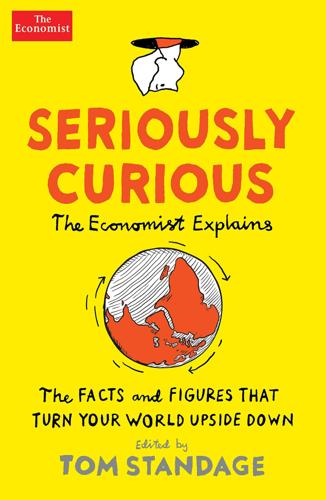
Seriously Curious: The Facts and Figures That Turn Our World Upside Down
by
Tom Standage
Published 27 Nov 2018
For more explainers and charts from The Economist, visit economist.com Index A Africa child marriage 84 democracy 40 gay and lesbian rights 73, 74 Guinea 32 mobile phones 175–6 see also individual countries agriculture 121–2 Aguiar, Mark 169 air pollution 143–4 air travel and drones 187–8 flight delays 38–9 Akitu (festival) 233 alcohol beer consumption 105–6 consumption in Britain 48, 101–2 craft breweries 97–8 drink-driving 179–80 wine glasses 101–2 Alexa (voice assistant) 225 Algeria food subsidies 31 gay and lesbian rights 73 All I Want for Christmas Is You (Carey) 243 alphabet 217–18 Alternative for Germany (AfD) 223, 224 Alzheimer’s disease 140 Amazon (company) 225 America see United States and 227–8 Angola 73, 74 animals blood transfusions 139–40 dog meat 91–2 gene drives 153–4 size and velocity 163–4 and water pollution 149–50 wolves 161–2 Arctic 147–8 Argentina gay and lesbian rights 73 lemons 95–6 lithium 17–18 Ariel, Barak 191 Arizona 85 arms trade 19–20 Asia belt and road initiative 117–18 high-net-worth individuals 53 wheat consumption 109–10 see also individual countries Assange, Julian 81–3 asteroids 185–6 augmented reality (AR) 181–2 August 239–40 Australia avocados 89 forests 145 inheritance tax 119 lithium 17, 18 shark attacks 201–2 autonomous vehicles (AVs) 177–8 Autor, David 79 avocados 89–90 B Babylonians 233 Baltimore 99 Bangladesh 156 bank notes 133–4 Bateman, Tim 48 beer consumption 105–6 craft breweries 97–8 Beijing air pollution 143–4 dogs 92 belt and road initiative 117–18 betting 209–10 Bier, Ethan 153 Bils, Mark 169 birds and aircraft 187 guinea fowl 32–3 birth rates Europe 81–3 United States 79–80 black money 133–4 Black Power 34, 35 Blade Runner 208 blood transfusions 139–40 board games 199–200 body cameras 191–2 Boko Haram 5, 15–16 Bolivia 17–18 Bollettieri, Nick 197 bookmakers 209–10 Borra, Cristina 75 Bosnia 221–2 brain computers 167–8 Brazil beer consumption 105, 106 Christmas music 243, 244 end-of-life care 141–2 gay and lesbian rights 73 murder rate 45, 46 shark attacks 202 breweries 97–8 Brexit, and car colours 49–50 brides bride price 5 diamonds 13–14 Britain alcohol consumption 101–2 car colours 49–50 Christmas music 244 cigarette sales 23–4 craft breweries 98 crime 47–8 Easter 238 gay population 70–72 housing material 8 inheritance tax 119 Irish immigration 235 life expectancy 125 manufacturing jobs 131 national identity 223–4 new-year resolutions 234 police body cameras 191 sexual harassment 67, 68, 69 sperm donation 61 see also Scotland Brookings Institution 21 Browning, Martin 75 bubonic plague 157–8 Bush, George W. 119 C cables, undersea 193–4 California and Argentine lemons 95, 96 avocados 90 cameras 191–2 Canada diamonds 13 drones 188 lithium 17 national identity 223–4 capitalism, and birth rates 81–2 Carey, Mariah 243 Carnegie Endowment for International Peace 21 cars colours 49–50 self-driving 177–8 Caruana, Fabiano 206 Charles, Kerwin 169 cheetahs 163, 164 chess 205–6 Chetty, Raj 113 Chicago 100 children birth rates 79–80, 81–3 child marriage 84–5 in China 56–7 crime 47–8 and gender pay gap 115–16, 135–6 obesity 93–4 Chile gay and lesbian rights 73 lithium 17–18 China air pollution 143–5 arms sales 19–20 avocados 89 beer consumption 105 belt and road initiative 117–18 childhood obesity 93 construction 7 dog meat 91–2 dragon children 56–7 flight delays 38–9 foreign waste 159–60 lithium 17 rice consumption 109–10 Choi, Roy 99 Christian, Cornelius 26 Christianity Easter 237–8 new year 233–4 Christmas 246–7 music 243–5 cigarettes affordability 151–2 black market 23–4 cities, murder rates 44–6 Citizen Kane 207 citrus wars 95–6 civil wars 5 Clarke, Arthur C. 183 Coase, Ronald 127, 128 cocaine 44 cochlear implants 167 Cohen, Jake 203 Colen, Liesbeth 106 colleges, US 113–14 Colombia 45 colours, cars 49–50 commodities 123–4 companies 127–8 computers augmented reality 181–2 brain computers 167–8 emojis 215–16 and languages 225–6 spam e-mail 189–90 Connecticut 85 Connors, Jimmy 197 contracts 127–8 Costa Rica 89 couples career and family perception gap 77–8 housework 75–6 see also marriage cows 149–50 craft breweries 97–8 crime and avocados 89–90 and dog meat 91–2 murder rates 44–6 young Britons 47–8 CRISPR-Cas9 153 Croatia 222 Croato-Serbian 221–2 D Daily-Diamond, Christopher 9–10 Davis, Mark 216 De Beers 13–14 death 141–2 death taxes 119–20 democracy 40–41 Deng Xiaoping 117 Denmark career and family perception gap 78 gender pay gap 135–6 sex reassignment 65 Denver 99 Devon 72 diamonds 13–14, 124 digitally remastering 207–8 Discovery Channel 163–4 diseases 157–8 dog meat 91–2 Dorn, David 79 Dr Strangelove 207 dragon children 56–7 drink see alcohol drink-driving 179–80 driverless cars 177–8 drones and aircraft 187–8 and sharks 201 drugs cocaine trafficking 44 young Britons 48 D’Souza, Kiran 187 E e-mail 189–90 earnings, gender pay gap 115–16, 135–6 Easter 237–8 economy and birth rates 79–80, 81–2 and car colours 49–50 and witch-hunting 25–6 education and American rich 113–14 dragon children 56–7 Egal, Muhammad Haji Ibrahim 40–41 Egypt gay and lesbian rights 73 marriage 5 new-year resolutions 233 El Paso 100 El Salvador 44, 45 emojis 215–16 employment gender pay gap 115–16, 135–6 and gender perception gap 77–8 job tenure 129–30 in manufacturing 131–2 video games and unemployment 169–70 English language letter names 217–18 Papua New Guinea 219 environment air pollution 143–4 Arctic sea ice 147–8 and food packaging 103–4 waste 159–60 water pollution 149–50 Equatorial Guinea 32 Eritrea 40 Ethiopia 40 Europe craft breweries 97–8 summer holidays 239–40 see also individual countries Everson, Michael 216 exorcism 36–7 F Facebook augmented reality 182 undersea cables 193 FANUC 171, 172 Federer, Roger 197 feminism, and birth rates 81–2 fertility rates see birth rates festivals Christmas 246–7 Christmas music 243–5 new-year 233–4 Feuillet, Catherine 108 films 207–8 firms 127–8 5G 173–4 flight delays 38–9 Florida and Argentine lemons 95 child marriage 85 Foley, William 220 food avocados and crime 89–90 dog meat 91–2 lemons 95–6 wheat consumption 109–10 wheat genome 107–8 food packaging 103–4 food trucks 99–100 football clubs 211–12 football transfers 203–4 forests 145–6, 162 Fountains of Paradise, The (Clarke) 183 fracking 79–80 France career and family perception gap 78 Christmas music 244 exorcism 36–7 gender-inclusive language 229–30 job tenure 130 sex reassignment 66 sexual harassment 68–9 witch-hunting 26, 27 wolves 161–2 G gambling 209–10 games, and unemployment 169–70 Gandhi, Mahatma 155 gang members 34–5 Gantz, Valentino 153 gas 124 gay population 70–72 gay rights, attitudes to 73–4 gender sex reassignment 65–6 see also men; women gender equality and birth rates 81–2 in language 229–30 gender pay gap 115–16, 135–6 gene drives 153–4 Genghis Khan 42 genome, wheat 107–8 ger districts 42–3 Germany beer consumption 105 job tenure 130 national identity 223–4 sexual harassment 68, 69 vocational training 132 witch-hunting 26, 27 Ghana 73 gig economy 128, 130 glasses, wine glasses 101–2 Goddard, Ceri 72 Google 193 Graduate, The 207 Greece forests 145 national identity 223–4 sex reassignment 65 smoking ban 152 Gregg, Christine 9–10 grunting 197–8 Guatemala 45 Guinea 32 guinea fowl 32–3 guinea pig 32 Guinea-Bissau 32 Guo Peng 91–2 Guyana 32 H Haiti 5 Hale, Sarah Josepha 242 Hanson, Gordon 79 Hawaii ’Oumuamua 185 porn consumption 63–4 health child obesity 93–4 life expectancy 125–6 plague 157–8 and sanitation 155 high-net-worth individuals (HNWIs) 53 Hiri Motu 219 holidays Easter 237–8 St Patrick’s Day 235–6 summer holidays 239–40 Thanksgiving 241–2 HoloLens 181–2 homicide 44–6 homosexuality attitudes to 73–4 UK 70–72 Honduras 44, 45 Hong Kong 56 housework 75–6, 77–8 Hudson, Valerie 5 Hungary 223–4 Hurst, Erik 169 I ice 147–8 Ikolo, Prince Anthony 199 India bank notes 133–4 inheritance tax 119 languages 219 rice consumption 109 sand mafia 7 sanitation problems 155–6 Indonesia polygamy and civil war 5 rice consumption 109–10 inheritance taxes 119–20 interest rates 51–2 interpunct 229–30 Ireland aitch 218 forests 145 St Patrick’s Day 235–6 same-sex marriage 73 sex reassignment 65 Italy birth rate 82 end of life care 141–2 forests 145 job tenure 130 life expectancy 126 J Jacob, Nitya 156 Jamaica 45 Japan 141–2 Jighere, Wellington 199 job tenure 129–30 jobs see employment Johnson, Bryan 168 junk mail 189 K Kazakhstan 6 Kearney, Melissa 79–80 Kennedy, John F. 12 Kenya democracy 40 mobile-money systems 176 Kiribati 7 Kleven, Henrik 135–6 knots 9–10 Kohler, Timothy 121 Kyrgyzstan 6 L laces 9–10 Lagos 199 Landais, Camille 135–6 languages and computers 225–6 gender-inclusive 229–30 letter names 217–18 and national identity 223–4 Papua New Guinea 219–20 Serbo-Croatian 221–2 Unicode 215 World Bank writing style 227–8 Latimer, Hugh 246 Leeson, Peter 26 leisure board games in Nigeria 199–200 chess 205–6 gambling 209–10 video games and unemployment 169–70 see also festivals; holidays lemons 95–6 letter names 217–18 Libya 31 life expectancy 125–6 Lincoln, Abraham 242 lithium 17–18 London 71, 72 longevity 125–6 Lozère 161–2 Lucas, George 208 M McEnroe, John 197 McGregor, Andrew 204 machine learning 225–6 Macri, Mauricio 95, 96 Macron, Emmanuel 143 Madagascar 158 Madison, James 242 MagicLeap 182 Maine 216 Malaysia 56 Maldives 7 Mali 31 Malta 65 Manchester United 211–12 manufacturing jobs 131–2 robots 171–2 summer holidays 239 Maori 34–5 marriage child marriage 84–5 polygamy 5–6 same-sex relationships 73–4 see also couples Marteau, Theresa 101–2 Marx, Karl 123 Maryland 85 Massachusetts child marriage 85 Christmas 246 Matfess, Hilary 5, 15 meat dog meat 91–2 packaging 103–4 mega-rich 53 men career and family 77–8 housework 75–6 job tenure 129–30 life expectancy 125 polygamy 5–6 sexual harassment by 67–9 video games and unemployment 169 Mexico avocados 89, 90 gay and lesbian rights 73 murder rate 44, 45 microbreweries 97–8 Microsoft HoloLens 181–2 undersea cables 193 migration, and birth rates 81–3 mining diamonds 13–14 sand 7–8 mobile phones Africa 175–6 5G 173–4 Mocan, Naci 56–7 Mongolia 42–3 Mongrel Mob 34 Monopoly (board game) 199, 200 Monty Python and the Holy Grail 25 Moore, Clement Clarke 247 Moretti, Franco 228 Morocco 7 Moscato, Philippe 36 movies 207–8 Mozambique 73 murder rates 44–6 music, Christmas 243–5 Musk, Elon 168 Myanmar 118 N Nadal, Rafael 197 national identity 223–4 natural gas 124 Netherlands gender 66 national identity 223–4 neurostimulators 167 New Jersey 85 New Mexico 157–8 New York (state), child marriage 85 New York City drink-driving 179–80 food trucks 99–100 New Zealand avocados 89 gang members 34–5 gene drives 154 water pollution 149–50 new-year resolutions 233–4 Neymar 203, 204 Nigeria board games 199–200 Boko Haram 5, 15–16 population 54–5 Nissenbaum, Stephen 247 Northern Ireland 218 Norway Christmas music 243 inheritance tax 119 life expectancy 125, 126 sex reassignment 65 Nucci, Alessandra 36 O obesity 93–4 oceans see seas Odimegwu, Festus 54 O’Reilly, Oliver 9–10 Ortiz de Retez, Yñigo 32 Oster, Emily 25–6 ostriches 163, 164 ’Oumuamua 185–6 P packaging 103–4 Pakistan 5 Palombi, Francis 161 Papua New Guinea languages 219–20 name 32 Paris Saint-Germain (PSG) 203 Passover 237 pasta 31 pay, gender pay gap 115–16, 135–6 Peck, Jessica Lynn 179–80 Pennsylvania 85 Peru 90 Pestre, Dominique 228 Pew Research Centre 22 Phelps, Michael 163–4 Philippe, Édouard 230 phishing 189 Phoenix, Arizona 177 Pilgrims 241 plague 157–8 Plastic China 159 police, body cameras 191–2 pollution air pollution 143–4 water pollution 149–50 polygamy 5–6 pornography and Britain’s gay population 70–72 and Hawaii missile alert 63–4 Portugal 145 Puerto Rico 45 punctuation marks 229–30 Q Qatar 19 R ransomware 190 Ravenscroft, George 101 Real Madrid 211 religious observance and birth rates 81–2 and Christmas music 244 remastering 207–8 Reynolds, Andrew 70 Rhodes, Cecil 13 rice 109–10 rich high-net-worth individuals 53 US 113–14 ride-hailing apps and drink-driving 179–80 see also Uber RIWI 73–4 robotaxis 177–8 robots 171–2 Rogers, Dan 240 Romania birth rate 81 life expectancy 125 Romans 233 Romer, Paul 227–8 Ross, Hana 23 Royal United Services Institute 21 Russ, Jacob 26 Russia arms sales 20 beer consumption 105, 106 fertility rate 81 Rwanda 40 S Sahara 31 St Louis 205–6 St Patrick’s Day 235–6 salt, in seas 11–12 same-sex relationships 73–4 San Antonio 100 sand 7–8 sanitation 155–6 Saudi Arabia 19 Scotland, witch-hunting 25–6, 27 Scott, Keith Lamont 191 Scrabble (board game) 199 seas Arctic sea ice 147–8 salty 11–12 undersea cables 193–4 secularism, and birth rates 81–2 Seles, Monica 197 self-driving cars 177–8 Serbia 222 Serbo-Croatian 221–2 Sevilla, Almudena 75 sex reassignment 65–6 sexual harassment 67–9, 230 Sharapova, Maria 197 sharks deterring attacks 201–2 racing humans 163–4 shipping 148 shoelaces 9–10 Silk Road 117–18 Singapore dragon children 56 land reclamation 7, 8 rice consumption 110 single people, housework 75–6 Sinquefeld, Rex 205 smart glasses 181–2 Smith, Adam 127 smoking black market for cigarettes 23–4 efforts to curb 151–2 smuggling 31 Sogaard, Jakob 135–6 Somalia 40 Somaliland 40–41 South Africa childhood obesity 93 diamonds 13 gay and lesbian rights 73 murder rate 45, 46 South Korea arms sales 20 rice consumption 110 South Sudan failed state 40 polygamy 5 space elevators 183–4 spaghetti 31 Spain forests 145 gay and lesbian rights 73 job tenure 130 spam e-mail 189–90 sperm banks 61–2 sport football clubs 211–12 football transfers 203–4 grunting in tennis 197–8 Sri Lanka 118 Star Wars 208 sterilisation 65–6 Strasbourg 26 submarine cables 193–4 Sudan 40 suicide-bombers 15–16 summer holidays 239–40 Sutton Trust 22 Sweden Christmas music 243, 244 gay and lesbian rights 73 homophobia 70 inheritance tax 119 overpayment of taxes 51–2 sex reassignment 65 sexual harassment 67–8 Swinnen, Johan 106 Switzerland sex reassignment 65 witch-hunting 26, 27 T Taiwan dog meat 91 dragon children 56 Tamil Tigers 15 Tanzania 40 taxes death taxes 119–20 Sweden 51–2 taxis robotaxis 177–8 see also ride-hailing apps tennis players, grunting 197–8 terrorism 15–16 Texas 85 Thailand 110 Thanksgiving 241–2 think-tanks 21–2 Tianjin 143–4 toilets 155–6 Tok Pisin 219, 220 transgender people 65–6 Trump, Donald 223 Argentine lemons 95, 96 estate tax 119 and gender pay gap 115 and manufacturing jobs 131, 132 Tsiolkovsky, Konstantin 183 Turkey 151 turkeys 33 Turkmenistan 6 U Uber 128 and drink-driving 179–80 Uganda 40 Ulaanbaatar 42–3 Uljarevic, Daliborka 221 undersea cables 193–4 unemployment 169–70 Unicode 215–16 United Arab Emirates and Somaliland 41 weapons purchases 19 United Kingdom see Britain United States and Argentine lemons 95–6 arms sales 19 beer consumption 105 chess 205–6 child marriage 84–5 Christmas 246–7 Christmas music 243, 244 drink-driving 179–80 drones 187–8 end of life care 141–2 estate tax 119 fertility rates 79–80 food trucks 99–100 forests 145 gay and lesbian rights 73 getting rich 113–14 Hawaiian porn consumption 63–4 job tenure 129–30 letter names 218 lithium 17 manufacturing jobs 131–2 murder rate 45, 46 national identity 223–4 new-year resolutions 234 plague 157–8 police body cameras 191–2 polygamy 6 robotaxis 177 robots 171–2 St Patrick’s Day 235–6 sexual harassment 67, 68 sperm banks 61–2 Thanksgiving 241–2 video games and unemployment 169–70 wealth inequality 121 unmanned aerial vehicles (UAVs) see drones V video games 169–70 Vietnam weapons purchases 19 wheat consumption 110 Virginia 85 virtual reality (VR) 181, 182 Visit from St Nicholas, A (Moore) 247 W Wang Yi 117 Warner, Jason 15 wars 5 Washington, George 242 Washington DC, food trucks 99 waste 159–60 water pollution 149–50 wealth getting rich in America 113–14 high-net-worth individuals 53 inequality 120, 121–2 weather, and Christmas music 243–5 Weinstein, Harvey 67, 69 Weryk, Rob 185 wheat consumption 109–10 genome 107–8 Wilson, Riley 79–80 wine glasses 101–2 Winslow, Edward 241 wireless technology 173–4 witch-hunting 25–7 wolves 161–2 women birth rates 79–80, 81–3 bride price 5 career and family 77–8 child marriage 84–5 housework 75–6 job tenure 129–30 life expectancy 125 pay gap 115–16 sexual harassment of 67–9 suicide-bombers 15–16 World Bank 227–8 World Health Organisation (WHO) and smoking 151–2 transsexualism 65 X Xi Jinping 117–18 Y young people crime 47–8 job tenure 129–30 video games and unemployment 169–70 Yu, Han 56–7 Yulin 91 yurts 42–3 Z Zubelli, Rita 239
…
Alcohol consumption is falling around the world Why wheat has a more complex genome than humans Asian countries are eating more wheat By the numbers: economical, with the truth The easiest way to get rich in America Why women still earn much less than men Why China is rebuilding the old Silk Road Why “death taxes” have fallen out of favour Wealth inequality has been increasing since the stone age What makes something a commodity? Does longevity always increase with national wealth? Why do companies exist? Millennial Americans are just as loyal to their employers as previous generations Why old-fashioned manufacturing jobs aren’t coming back Why India scrapped its two biggest bank notes The roots of the gender pay gap lie in childhood Department of white coats: science, health and the environment Can young blood really rejuvenate the old? What people want at the end of life How China reduced its air pollution Why forests are spreading in the rich world The Arctic could be ice-free by 2040, 30 years sooner than expected Why there’s something in the water in New Zealand Measures to discourage smoking are spreading around the world Why “gene drives” have yet to be deployed in the wild Why it is so hard to fix India’s sanitation problems Why some deadly diseases are hard to eradicate Why China is sick of foreign waste Why are wolves coming back in France?
…
But with 99% of the money accounted for, the dividend would have amounted to only 100 rupees per person. The whole episode dented the RBI’s reputation for independence and competence. It also hit national pride: the demonetisation scheme constrained economic growth, thus handing back to China India’s coveted crown of being the world’s fastest-growing large economy. The roots of the gender pay gap lie in childhood It is well known that parenthood tends to hurt women’s careers but not men’s. Numerous studies have shown that having children lowers women’s lifetime earnings, an outcome known as the “child penalty”. A wide range of individual decisions account for this effect. Some women work fewer hours, or not at all, when their children are young.
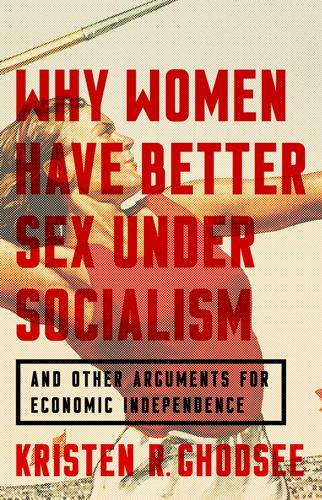
Why Women Have Better Sex Under Socialism: And Other Arguments for Economic Independence
by
Kristen R. Ghodsee
Published 20 Nov 2018
Although societal attitudes have evolved in this regard, our idealization of motherhood means that most of us still believe that baby needs mama a whole lot more than papa—at least until the child is old enough to play sports. Others will argue that unregulated capitalism is not bad for all women. Yes, for those women lucky enough to sit at the top of the income distribution, the system works pretty well. Although women at the executive level still face gender pay gaps and remain underrepresented in leadership positions, on the whole things aren’t too shabby for the Sheryl Sandbergs of the world. Of course, sexual harassment still hinders progress even for those at the top, and too many women believe that if you want to run with the big dogs, you may have to suck it up and ignore the groping and unwanted advances.
…
These findings led the ILO to conclude that the “analysis of data on women’s participation in economic activity in the USSR and the socialist countries of Europe shows that men and women in these countries enjoy equal rights in all areas of economic, political, and social life. The exercise of these rights is guaranteed by granting women equal opportunities with men in access to education and vocational training and in work.”9 Of course, women’s own accounts complicate the rosy picture painted by the ILO in 1985. Gender pay gaps still existed in East European countries. And despite the attempts to funnel women into traditionally male employment, there remained a gendered division of labor whereby women worked in white-collar professions, the service sector, and light industry, compared to men who worked in the higher-paid sectors of heavy industry, mining, and construction.
…
Niall McCarthy, “Scandinavia Leads the World in Public Sector Employment,” Forbes, July 21, 2017, www.forbes.com/sites/niallmccarthy/2017/07/21/scandinavia-leads-the-world-in-public-sector-employment-infographic/#19dd03061820; OECD, Government at a Glance, 2017, 96, www.oecd.org/gov/government-at-a-glance-22214399.htm; Sheila Wild, “The Growing Gender Pay Gap in the Public Sector Is a Problem for Us All,” Guardian (London), Nov. 9, 2016, www.theguardian.com/public-leaders-network/2015/nov/09/growing-gender-gap-public-sector-equal-pay-day. 13. Michael Greenstone and Adam Looney, “Should the United States Have 2.2 Million More Jobs?” The Hamilton Project, May 3, 2013, www.hamiltonproject.org/papers/does_the_united_states_have_2.2_million_too_few_jobs. 14.
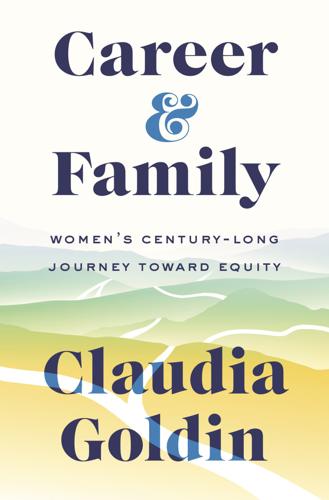
Career and Family: Women’s Century-Long Journey Toward Equity
by
Claudia Goldin
Published 11 Oct 2021
A single company slapped on the wrist, one more woman who makes it to the boardroom, a few progressive tech leaders who go on paternity leave—such solutions are the economic equivalent of tossing a box of Band-Aids to someone with bubonic plague. These responses haven’t worked to erase the differences in the gender pay gap. And they will never provide a complete solution to gender inequality, because they treat only the symptoms. They will never enable women to achieve both career and family to the same degree as men. If we want to eradicate or even narrow the pay gap, we must first plunge deeper toward the root of these setbacks and give the problem a more accurate name: greedy work.
…
The private equity associate who sees the deal through from beginning to end, who did the difficult modeling, and who went to every meeting and late-night dinner, will have maximum chance for a big bonus and the sought-after promotion. Rising inequality in earnings may be one important reason why the gender pay gap among college graduates has remained flat in the last several decades, despite improvements in women’s credentials and positions. It may be the reason why the gender earnings gap for college graduates became larger than that between men and women in the entire population in the late 1980s and early 1990s.
…
All these findings—that the gender earnings gap widens with family formation, that women shift into lower-paying firms, and that they do not advance as much as men do within firms—beg an examination of earnings gaps by occupation for the college-graduate group. There are large differences in the gender pay gap across occupations. Are some more conducive to gender equality and couple equity? What are the occupational characteristics that render occupations more or less friendly to women (and to couples more generally)? Consider those who have been awarded among the most prestigious advanced degrees: JD, MBA, MD, and PhD.

Your Life in My Hands: A Junior Doctor's Story
by
Rachel Clarke
Published 14 Sep 2017
The vast majority of the doctors I have encountered respect their male and female colleagues equally. Indeed, medicine has a justifiable reputation for being one of the UK’s more progressive professions when it comes to gender equality. But that does not mean medicine is a level playing field. As with so many jobs in Britain, it has an established gender pay gap as well as a gendered distribution of doctors among the various medical specialities, with many of the more ‘prestigious’ roles such as neurosurgery and cardiology remaining predominantly male. The disproportionate number of men in these roles increases the higher ones climbs up the hierarchy.
…
One of the most disappointing aspects of the junior doctor dispute was that the government, far from ensuring the NHS remained a trailblazer for gender equality, turned out to be just as willing as Lawson to cast female doctors as a financial barrier to a seven-day NHS. After his 2015 general election victory, David Cameron briefly sought to present himself as the face not only of compassionate conservatism and family values, but also of female emancipation. He took an impressively progressive lead on gender equality by vowing unequivocally to ‘end the gender pay gap in a generation’.34 But the insincerity of that commitment was swiftly exposed when, in early 2016, the government belatedly published its equality assessment of the new junior doctor contract. The assessment, a legal requirement under European law, analysed whether any specific groups were likely to be systematically disadvantaged as a result of the new contract.
…
In fact, the Department’s own analysis admitted that women might lose out disproportionately, while dismissing that fact with the statement that, ‘Any adverse effect on women is a proportionate means of achieving a legitimate end.’35 In essence, the pay of part-time doctors, 80 per cent of whom are women, was set to rise more slowly under the new contract, even though their antisocial hours would increase, creating a need for expensive additional childcare. The new contract would therefore widen the very gender pay gap the Prime Minister had pledged to eradicate. Women’s salaries, it turned out, were mere collateral damage and women, in David Cameron’s eyes, were almost equal to men – just that little bit cheaper. While admitting the new contract would, ‘disproportionately disadvantage those who need to arrange childcare’,35 the government proposed an outlandish solution.
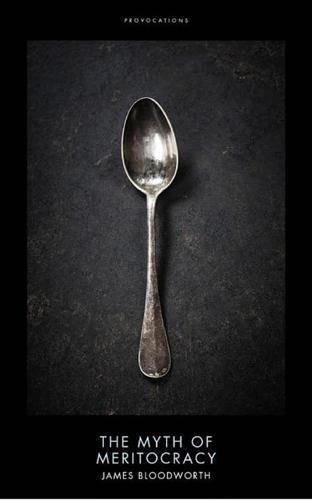
The Myth of Meritocracy: Why Working-Class Kids Still Get Working-Class Jobs (Provocations Series)
by
James Bloodworth
Published 18 May 2016
In this wretched incident, despite serious allegations of sexual assault being made against a senior party member of the SWP – ‘Comrade Delta’ – the female accusers were discouraged from going to the police on the basis that socialists should have ‘no faith in the bourgeois court system to deliver justice’.103 Again, rudimentary women’s rights had to wait until the victory of the glorious revolution. Nor is 21st-century Britain a meritocratic utopia for women and ethnic and sexual minorities. A gender pay gap evidently exists,104 even if there is a debate to be had over its size. Young black men are incarcerated in Britain at a much higher rate than young white men and are far more likely to be living in poverty.105 It is fashionable to emit a liberal sneer at the flagrant racism of the American justice system, but according to the Equality and Human Rights Commission, there is now greater disproportionality in the number of black people in prisons in the UK than in the US.106 Despite the state’s recognition of gay marriage, there also remain areas of Britain – and particularly within minority communities – where being openly gay is to risk physical injury or even death.
…
A six-month unpaid internship at a prestigious newspaper – or an unpaid internship in any job, for that matter – is as off limits to a white working-class boy as it is to anyone else who lacks the sufficient funds. Professor Savage’s analysis of the British Class Survey found evidence of a social class pay gap comparable to the gender pay gap that rightly induces so much opprobrium in liberals. Those from the most elite backgrounds were often paid as much as 25 per cent more than those from more modest backgrounds for doing the same work.111 Equality of opportunity along the lines envisioned by proponents of identity politics would be an unquestionable improvement on the status quo.
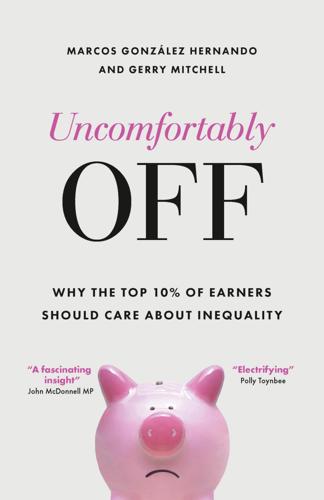
Uncomfortably Off: Why the Top 10% of Earners Should Care About Inequality
by
Marcos González Hernando
and
Gerry Mitchell
Published 23 May 2023
Notwithstanding big differences among European countries, EU‑SILC data show that although women were slightly over 50% of the European workforce in 2016, they were around 70% 29 Uncomfortably Off of the poorest 10% of workers and around 33% of the top 10%. This tendency doesn’t stop even within the top decile, as they are only 17% of the top 1%.26 According to the ONS, the gender pay gap increases substantially in high-paying jobs in the UK, driving up the overall gender pay gap numbers, a gap that is also much more pronounced for workers below the age of 40.27 Coincidentally, the highest average incomes in terms of age and gender are concentrated in men aged 45–49 and 50–54 (£55,300 and £54,100, respectively), while women of the same age can expect to earn much less (on average £36,300 and £35,200).28 Regarding race and ethnic origin, ONS data show that White, Chinese and Indian are the only ethnicities well represented in the top quintile, meaning at least 20% are part of the 20% of highest earners.
…
Release: 19 October. www.ons.gov.uk/ peoplepopulationandcommunity/populationandmigration/ populationestimates/adhocs/12386populationbyindexofmulti pledeprivationimdengland2001to2019 ONS (2021a) Visualisation: What are the regional differences in income and productivity? Release: 17 May. www.ons.gov.uk/ visualisations/dvc1370 ONS (2021b) Gender pay gap in the UK: 2021; Differences in pay between women and men by age, region, full-time and part-time, and occupation. Release: 21 October. www. ons.gov.uk/employmentandlabourmarket/peopleinwork/ earningsandworkinghours/bulletins/genderpaygapintheuk/2021 ONS (2021c) National statistics: Distribution of median and mean income and tax by age range and gender.
…
A abortion, top 10% attitudes towards 6, 16 academics/academia 5, 9–10, 54 knowledge production and enabling of the wealthy 132–3 acceleration, of the pace of life 128–9 accountancy firms 67, 68, 108, 109, 126 accumulation 135–6 Advani, A. 179, 180 affluence 22, 144, 162, 180 see also top 1%; top 10%; wealth age profile of the top 10% 8 agency 49 Alamillo-Martinez, Laura 73 Amazon 180 Ambler, L. 132–3 anti-elitism 12, 46, 96 anxiety 72, 130, 150 and status 135, 165 see also mental health ‘anywheres’ 96 ascriptive identities 153 attitudes to cultural issues 42, 84 to economic issues 6, 8, 11, 16, 18–19, 42, 42, 77, 92–3, 161–4 to political issues 8, 16–17, 42, 76–99 to social issues 6, 8, 16, 18–19, 42, 65–71, 77, 92, 92–3, 161–3, 164–6 austerity policies 10, 11, 13, 16, 76, 78–9, 105, 115–16, 169–70 automation 79, 158, 160 B Bangladeshi ethnicity, in the top 10% 30 Bank of England 78, 105, 164, 175 ‘bank of mum and dad’ 29, 111 Barber, Rob 1, 2, 4, 181 Barclay family 121 BBC 11 Beck, U. 64 Bell, Torsten 2, 6 Berman, Y. 34 Berry, C. 82 Bezos, Jeff 144 Biden, Joe 142 Big Four accountancy firms 67, 68 see also accountancy firms Bill of Rights 121 Bitcoin 143 Black African/British/Caribbean ethnicity, in the top 10% 30 Black Lives Matter 113 Black Report 1977 115 Blair, Tony 9, 84, 185 Blakeley, Grace 139, 176 Bolsonaro, Jair 96, 98 ‘boundary work’ of elites 45 Bourdieu, Pierre 40 Brahmins 38, 41–2, 43, 44, 45, 46, 47, 50, 51, 59, 61, 68, 73, 74–5, 84, 96, 167, 185 ‘brain drain’ 124 see also mobility Brexit 11, 16, 76, 80, 86–7, 97, 101–2, 125 Brown, Gordon 175 Bullough, Oliver 113–14 bunkers 130, 131, 144, 187 Burgon, Richard 1, 3, 6 business support schemes, COVID-19 pandemic 15, 104, 126–7, 140, 151 C Cambridge University 28–9, 119 Cameron, David 84 capital, income from 33–4 capital flight 124 capital tax, global 180 car ownership 153 carbon emissions 54, 114–15, 135, 143, 145, 171, 172, 178 see also climate change 236 Index care see social care Centre for Economic Performance 163 Chancel, L. 176–7 charitable donations 70–1 charitable sector 132 child poverty 170 see also poverty children of the top 10% 27, 35–6, 100–1, 109, 111–12, 183–4, 186 ‘bank of mum and dad’ 29, 111 childcare costs 135–6 downward social mobility 31–2, 162 social reproduction 135–7 US 57 Chinese ethnicity, in the top 10% 30 class 39–40 cultural signifiers of 39, 40–1 ‘death of ’ 39 and education 40–1, 46, 51, 58–9 inherited nature of 148 middle class 33, 39, 40, 133, 136, 148 and social mobility 57–8 terminology of 38–9 upper class 38–9, 133 upper-middle class 4, 16, 27, 31–2, 38–54, 39 (see also top 10%) working class 24, 39, 57, 101–2, 148 climate change 54, 100, 101, 114–15, 125, 135, 141, 171–2 carbon emissions 54, 114–15, 135, 143, 145, 171, 172, 178 need for collective action on 122–3 net zero 174, 176–7 coalition government (Conservative/ Liberal Democrat) 78 collective denial 139–42 common sense 11, 19, 74, 89, 90, 108, 126, 130, 147 community gender and community involvement 70 top 10%’s lack of awareness of/ involvement in 45–6, 49–50, 127–31, 131, 150–1, 154–7, 164–6 ‘compensatory consumption’ 129, 134 Conservative Party/Conservatives 3, 16, 53, 76–7, 84, 85, 88, 97, 99, 120, 179 leadership election, 2022 39 taxation policy 3, 53 traditional supporters 44 consumption 152–4, 169, 171, 178 ‘compensatory consumption’ 129, 134 environmental impact of 135 luxury consumption, and climate change 114–15 Corbyn, Jeremy 11, 16, 80, 84, 85, 87, 96, 97 corporate governance 174 corporate responsibility 70–1 corporate sector 46, 51, 59, 64, 65–6, 67–8, 71, 88–9, 108, 128, 153 corporation tax 105–6, 113, 180 cost of living crisis 14, 52, 76, 101, 104, 106, 127, 177–8 council tax 110, 180 COVID-19 pandemic 13, 15, 72–3, 103–4, 116, 126, 134, 142, 144, 151 furlough and business support schemes 15, 104, 126–7, 128, 140, 151 political impact of 87–8 Coyle, Diane 145 crises cost of living crisis 14, 52, 76, 101, 104, 106, 127, 177–8 of democracy 119–21 global financial crisis, 2008 31, 77–9, 126, 140 cryptocurrencies 143–4 cultural attitudes of the top 10% 42, 84 cultural capital 40, 41, 46, 51 cuts, in public services 78–9, 105, 117, 170 D deindustrialisation 28 democracy crisis of 119–21 erosion of 76, 81–2 demographic profile of the top 10% 8 depression 130, 150 see also mental health ‘deserving’, the 23, 57, 74 see also ‘undeserving’, the disability and social mobility 58 welfare benefits 78, 79, 175 Disability Rights UK 175 diversity and inclusion targets 57 domestic work see unpaid work Dorling, Danny 35, 146–7, 156, 183 downward orientation 35, 46, 47 downward social mobility 14, 36, 73, 136, 152, 162, 182 237 Uncomfortably Off children of the top 10% 31–2, 162 income and status insecurity 51–2 Dubai 133 Durose, Oly 39–40 E Earth4All 177 economy economic attitudes of the top 10% 6, 8, 11, 16, 18–19, 42, 42, 77, 92–3, 161–4 economic common sense 89, 90 GDP, as indicator of success 176 Economy 2030 Enquiry 109 EDF 106 Edmiston, Daniel 49 education and class 40–1, 46, 51, 58–9 inequalities 17, 100–1, 117–19, 136 Ofsted ratings and league tables 137 and political attitudes 41, 42 and social capital 60 and social mobility 58–60, 147–8 state education 36, 60, 119, 136, 137, 148, 170 see also higher education; private education Ehrenreich, Barbara 152 Elections Bill 2021 120 Electoral Calculus 173 Electoral Commission 120 electoral system reform 172–3 Eliasoph, Nina 81 elites 39, 44–5, 77 anti-elitism 12, 96 employment 151 blue-collar 28 good jobs 55–61 hard work 48, 50, 61–73, 162 impact on society of 65–71 inequalities 17, 100, 107–9 low-wage work 62, 127 precarity 61, 107–9 presenteeism 64 public sector 109 and purpose 66–7, 71, 75, 162 and self-respect 55–6 and status 55–7, 68, 74 structural labour market change 27–8, 158 top 10% 6, 16, 24, 25, 26–8, 55–75 total British employed 2 white-collar 28 work-life balance 18, 171 workplace reform 71–2 see also unpaid work energy costs 101, 104, 105–7, 175 energy industry privatisation of 177–8 windfall taxes 177 environmental issues 54, 161 carbon emissions 54, 114–15, 135, 143, 145, 171, 172, 178 net zero 174, 176–7 equality of opportunity 57, 153 equality of outcome 57 ESS (European Social Survey) 89, 92 ethnicity see race and ethnic origin Eton College 26, 119 EU-SILC (European Union Statistics on Living Conditions) 24, 28, 29–30, 32, 33 Eurofound 27–8, 36–7 European Convention on Human Rights 121 European Social Survey (ESS) 89, 92 European Union Statistics on Living Conditions (EU-SILC) 24, 28, 29–30, 32, 33 experts, anti-elitist attitudes towards 12 Extinction Rebellion 84 ‘extraction capitalism’ 112 F Farage, Nigel 96 ‘fear of falling’ 152, 182 see also downward social mobility feminism 56 financial sector 51–2, 88–9 food food banks 93, 175 ‘right to’ 178 foreign policy, top 10% attitudes towards 6, 42 formal work see employment ‘fortification mentality’ 134–5 Frank, Robert H. 48 Friedman, Sam 27, 29, 31, 40, 57 furlough scheme, COVID-19 pandemic 15, 104, 128, 140, 151 G Gallup Poll, US 22, 26 Gates, Bill 144 GDP, as indicator of success 176 gender gender profile of the top 10% 8, 29–30 inclusivity 152–3 social mobility 57–8 general election, 2019 1, 76, 97, 120, 173 Generation Z 17, 100, 118 gentrification 133–4 238 Index Germany 159, 169 Gethin, Stephen 121 Ghosh, J. 132–3 Giddens, A. 64 Gilens, Martin 42–3 gilets jaunes (yellow vest) movement, France 115 global financial crisis, 2008 31, 77–9, 126, 140 global warming see climate change globalisation 39 offshoring 79, 109, 158 Good Friday Agreement 121 good jobs 55–61 see also employment Goodhart, David 96–7 Gove, Michael 84 government debt 140 government employees, as members of the top 10% 5 government spending 169–70 see also public services; welfare state Graeber, David 46, 66, 75, 129, 157 Great British Class Survey 2013 39 Green, Duncan 184 Green New Deal 176 Green Party 87, 120, 178 Guinan, J. 82 H House of Commons Committee for Business, Energy and Industrial Strategy 107 household debt 152 housing 52 and climate change 114 house prices 33 housing costs 110, 111 inequalities 17, 100, 107–9, 133–4 insulation grants 176 mortgages 33, 52, 106, 110 and state education 137 see also home ownership; homelessness human rights 121 Human Rights Act 1998 121 I Haldane, Andy 164 hard work 48, 50, 61–73, 162 HC-One 107 healthcare 144, 168 inequalities 112–14, 138, 139 NHS 91, 94, 116, 137, 138, 170 private healthcare 116, 137, 140, 159, 167–8, 182 Hecht, Katharina 62 higher education 30–1, 58, 136, 147–8, 183 elite 17, 26, 28–9, 73, 74, 100 and employment 57, 61 inequalities 17, 100, 117–19 mental health issues 73 post-1992 28 and social capital 118 student debt 37 US 57, 74 Hills, John 168 HMRC, income survey 5–6 hoarding 135–6, 144 home ownership 33, 52, 110, 111 see also housing homelessness 93 see also housing immigration, top 10% attitudes towards 6, 16, 42, 43 income distribution 133, 168 misconceptions around 1–4 Palma ratio 22–3 UK breakdown, 2019/20 7 income from capital 33–4 income tax 178–9, 181 Indian ethnicity, in the top 10% 30 inequalities 53, 77–8, 92–3, 100–23, 129–30, 153–4, 165–6, 183 and the COVID-19 pandemic 127 and education 17, 100–1, 117–19, 136 and employment 17, 100, 107–9 global 177 growth of 14, 32–3 healthcare 112–14, 138, 139 higher education 17, 100, 117–19 housing 17, 100, 107–9, 133–4 intergenerational 14, 17, 100, 109, 111–12, 117–18 labour market 60–1 and politics 87 private sector responsibility 69–71 and the top 10% 8, 17, 101–23 and the ‘undeserving’ 148–50 inflation 101, 105 Inflation Reduction Act 2022, US 169 informal work 56–7 inheritance, and housing inequality 111 Institute for Fiscal Studies 26, 105 Institute for Government 104 insulation 125–7, 130, 144 interdependence 175–6 Intergenerational Commission 118 intergenerational inequalities 14, 17, 100, 109, 111–12, 117–18 International Labour Organization 56 interview panels 40 239 Uncomfortably Off IPCC (Intergovernmental Panel on Climate Change) 114 Ireland 5, 13, 33, 155 isolation 127–31, 131, 144, 150–1 Ivy League universities, US 57 J jobs see employment Johnson, Boris 11, 26, 76, 84, 87, 97, 119, 121 Johnson, Paul 105 Jones, Owen 133, 148 K Kawachi, I. 116–17 key workers 127, 144, 150, 165 Khan, Shamus 152–3 King’s Fund 138 Kwarteng, Kwasi 3, 105 L labour market 60–1, 79–80 Labour Party/ Labour 1, 2, 44, 76, 80, 82–3, 84, 85, 89, 120, 122, 180, 194 New Labour 9, 78, 85 Lamont, Michèle 44–5 land values 110 Lansley, Stewart 112, 114, 151 Laurison, Daniel 27, 29, 31, 40, 57 Lawson, Neal 154 Le Pen, Marine 96, 98 left, the and Brahmins 41 social attitudes of the top 10% 16, 4 2 LGBTQ+ people, top 10% attitudes towards 43 Liberal Democrat Party 76, 84, 85, 86, 102, 120 liberalism small-l liberalism 96, 98, 182 life expectancy 79, 115, 138 Lindner, Christian 169 living standards 23–4 see also cost of living crisis local government 81–3, 117 local politics 81, 82–3 low-wage work 62, 127 luck 48, 59, 61 luxury consumption, and climate change 114–15 Lynch, Mick 178 M Major, John 60 Make Votes Matter 84 management consultants 47, 59, 70, 86, 90, 108, 126, 130, 147 Mandler, Peter 148 manners elite 45 market failures 105–7, 141 marketisation 137–9 Markovits, D. 20 Marmot reports, 2010 and 2020 115–16, 117 Mason, Paul 142 May, Theresa 84, 87 Mazzucato, Mariana 173–4 mean-tested benefits 77, 93–4, 159 media control of 120 as members of the top 10% 5, 26 Members of Parliament (MPs) 5, 76 men community involvement 70 see also gender mental health anxiety 72, 130, 135, 150, 165 depression 130, 150 higher education 73 unequal societies 130 working hours reduction 171 Merchants 38, 41–2, 43, 45, 46, 47, 48, 50, 53, 61, 65, 68, 69, 72, 73, 88–9, 96, 98, 160, 162, 174 meritocracy 6, 11, 18, 19, 20, 39, 47, 58, 65, 68, 74, 100, 109, 111, 118, 146–9, 165, 170, 181, 184–5, 186 middle class 33, 39, 40, 133, 136, 148 Mijs, Jonathan 118, 155–6, 156–7 Milanovic, Branco 14, 34 Millennials 17, 100, 117, 118 minority rights, top 10% attitudes towards 6, 43 mobility 17–18, 124–5, 144, 148, 167 money, cultural taboos around 3 money elite 45 monopolies 140 and energy market failure 106–7 morals elite 45 mortgages 33, 52, 106, 110 MPs (Members of Parliament) 5, 76 multinational companies, taxation of 180 Murdoch, Rupert 120 N NatCen Social Research 24, 39 National Union of Rail, Maritime and Transport Workers 178 240 Index Nationality and Borders Bill 2021 120 neoliberalism 142 net zero 174, 176–7 networking 63 see also social capital New Labour see Labour Party/Labour NFTs (non-fungible tokens) 143–4 NHS 91, 94, 116, 137, 138, 170 Nietzsche, F. 46 Nixon, B. 82 Northern Ireland 121 O Obama, Barack 96 occupation see employment Occupy movement 181 OECD (Organisation for Economic Co-operation and Development) data 23, 31 Office for National Statistics (ONS) 24, 29 offshoring 79, 109, 158 Olson, Dan 144 online shopping, and the COVID-19 pandemic 134 online working see working from home ONS (Office for National Statistics) 24, 29 Organisation for Economic Cooperation and Development (OECD) data 23, 31 overwork 69, 75 see also working hours Oxford Brookes University 29 Oxford University 28–9, 119 P Pakistani ethnicity, in the top 10% 30 Palma ratio 22–3 Parra, Nicanor 32 Parsons, Tony 3 participation, political 80–5, 172–3 ‘partygate’ scandal 76 Paugam, Serge 49–50 pensions, state 138 performance management 72 Personal Independence Payment 79 PFIs (private finance initiatives) 139 Piketty, Thomas 5, 14, 31, 38, 41, 42, 113, 180 Polanski, Jack 178 polarisation, political 14, 85–6, 98, 102, 172 Policing Bill 2021 120 politicians, as members of the top 10% 5, 26 politics 76–99, 181 centre ground 85–8 contemporary context 77–80 party membership 82–3, 84 political change 184–5 political participation 80–5, 172–3 political polarisation 14, 85–6, 98, 102, 172 political reform 172–3 and trust 76, 82 populism 11, 14, 16, 76, 77, 98, 102 positionality of authors 8–11 poverty 59, 78, 93, 151, 174, 175 child poverty 170 and education 118 and the ‘undeserving’ 148–50 precarity, of employment 61, 107–9 presenteeism 64 private education 54, 118–19, 136, 137, 147–8, 159, 162, 167, 170, 182 school fees 26, 33, 35, 36, 37 and social capital 60, 118 see also education private finance initiatives (PFIs) 139 private healthcare 116, 137, 140, 159, 167–8, 182 see also healthcare private sector 19–20 corporate sector 46, 51, 59, 64, 65–6, 67–8, 71, 88–9, 108, 128, 153 financial sector 51–2, 88–9 insecurity in 109 involvement in public services 139, 170 raising expectations of 171 privatisation excess profits of privatised companies 101 of utility companies 177–8 professionals anti-elitist attitudes towards 12, 46, 96 professionals and managers 24, 25, 26–8, 39, 55 see also top 10% property tax 180–1 protest, right of 120 Protestant work ethic 50 public sector employment 109 public services 159, 173 cuts in 78–9, 105, 117, 170 destigmatisation of 170 and marketisation 137–8 private sector involvement in 139, 170 and the top 10% 8, 19, 56, 77, 91–2, 138–9, 140, 144, 159, 163, 166–8, 183 universal 56, 77, 93–5, 144, 159 241 Uncomfortably Off Putnam, Robert 81, 129, 157, 158 Q Question Time, BBC 1, 2, 181 R race and ethnic origin and inclusivity 152–3 and social mobility 58 of the top 10% 8, 30 Raworth, Kate 135 redistribution 139, 161, 163, 182 top 10% attitudes towards 6, 42, 42, 43, 77 Reed, Howard 151 Reich, Robert 141 relocation see mobility renewable energy 141 see also climate change; energy costs Resolution Foundation 2, 34, 112, 163 rich, the see top 1%; top 10% richness 47 right, the 16 and Brexit 102 centre right 89, 97 and control of the media 121 far right 15, 97–8 and Merchants 41 political attitudes of the top 10% 16, 42 rights and responsibilities 158–60 Rivera, Lauren 57, 119 Rosa, Hartmut 129 Rothermere, Lord 120 Russell Group universities 57 Russia-Ukraine war 76, 104, 105–6 S Saez, E. 31 Salvini, Matteo 98 same-sex marriage, top 10% attitudes towards 6, 16, 42 Sandbu, Martin 179 Sandel, Michael 142, 150–1 Sanders, Bernie 96 Savage, Mike 183 savings levels of the top 10% 36 school fees, private education 26, 33, 35, 36, 37 Schor, Juliet 171 Scotland, devolved government 121 Scottish Greens 121 Scottish National Party 121 self-respect, and employment 55–6 Sherman, Rachel 35, 45–6 Shrubsole, Guy 110 ‘sink’ schools 137 Sinn Féin 121 small-l liberalism 96, 98, 182 ‘smart’ working 64 social capital decline in 157–8 and private education 60, 118 social care 117 low pay of care workers 103 market failure in 107 Social Democratic Party of Germany, Programme for the Future 159 social media ‘echo chambers’ 128 social mobility 19, 28, 36, 57–9 downward 14, 36, 73, 136, 152, 162, 182 children of the top 10% 31–2, 162 income and status insecurity 51–2 and education 58–60 meritocracy 6 and networking 63 structural barriers to 62 upward 18, 36, 50, 64, 136 Social Mobility Commission 60 social reproduction 135–7 social security top 10% attitudes towards 77 see also welfare benefits; welfare state society, attitudes to impact of work on 65–71, 74–5 sociological imagination 13, 49, 128, 160 solidarity 94, 127, 142, 157, 158, 159, 170 ‘somewheres’ 96 Soper, Kate 74 Spain 5, 73, 149, 155, 169 stamp duty 110–11 Starmer, Keir 87 state, the 161 raising expectations of 173–6 top 10% attitudes towards 91–5, 92 state education 36, 60, 119, 136, 137, 148, 170 status and employment 55–7, 68, 74 status anxiety and insecurity 14, 51–2, 135, 165 Stevenson, Gary 15 stigma, and unemployment 56 Streib, Jessi 31–2 structure 49 student debt 37 suburbia 40 Summers, A. 179, 180 Sutton Trust 29 Sweden 5, 23, 155 242 Index T tactical voting 172–3 taxation 97, 161, 163, 164, 178–81, 182 corporation tax 105–6, 113, 180 council tax 110, 180 income tax 2, 105–6, 178–9, 181, 185 property tax 180–1 stamp duty 110–11 tax avoidance/evasion 178, 181 tax cuts 169 tax fraud 181 top 10% attitudes towards 8, 42, 43, 77, 88–91, 92 Truss government tax cuts 105–6 wealth tax 179 windfall taxes, energy industry 177 technology and acceleration of the pace of life 129 automation 79, 158, 160 Thatcher, Margaret 105, 180 third sector, as members of the top 10% 5 Thomas, Mark 120 top 1% 2, 4, 13, 14, 15, 32, 41, 52, 64, 65, 93, 126, 128, 162 and employment 58–9 enabling of 131–4 inequality in 155 top 10% 4–7, 8, 11–13, 18, 33 accumulation and hoarding 135–6, 144 and austerity policies 1, 11, 13, 16 barriers to sense of belonging 18, 146–60 collective denial 139–42 contradictory isolation of 53–4 cost of living pressures 14, 15 and the COVID-19 pandemic 13, 15, 18, 127 furlough and business support schemes 15, 104, 126–7, 128, 151 cultural attitudes 42, 84 demographic profile 8 economic attitudes 6, 8, 11, 16, 18–19, 42, 42, 77, 92–3, 161–4 education 28–9, 30–1 employment 6, 16, 24, 25, 26–8, 55–75 enabling the wealthy 131–4 future prospects for 34–7, 95–9, 98, 182-7 gender profile 8, 29–30 HMRC income data 5–6 income and status insecurity 14, 51–2 inequalities 8, 17, 101–23 insulation 125–7, 130, 144 internal diversity of 32 isolation/lack of awareness of others’ lives 45–6, 49–50, 127–31, 131, 150–1, 154–7, 164–6 location 8, 29 and marketisation 137–9 and meritocracy 6, 11, 18, 19, 20, 39, 47, 58, 65, 68, 74, 100, 109, 111, 118, 146–9, 165, 170, 181, 184–5, 186 mobility 17–18, 124–5, 144, 148 overview and profile of 13–15, 21–37, 154–5 perceptions of income distribution 38, 47–51 political attitudes 8, 16–17, 42, 76–99 political participation 80–5 political influence of 5, 11, 76 and public services 8, 19, 56, 77, 91–2, 138–9, 140, 144, 159, 163, 166–8, 183 qualitative analysis of 15–16, 38–54 race and ethnic origin 8, 30 response to social and economic pressures 17–18, 124–45 rights and responsibilities 158–60 and the role of the state 91–5, 92 savings levels 36 social attitudes 6, 8, 16, 18–19, 42, 65–71, 77, 92, 92–3, 161–3, 164–6 social reproduction 135–7 uncertainty and insecurity of 68–9 Törmälehto, Veli-Matti 36–7 Toynbee, P. 89 trade unions 165, 172 membership 72, 157, 158, 163 Trump, Donald 11, 47, 96, 97, 98 Truss, Liz 105, 141, 186 Trussell Trust 175 trust 130–1 and politics 76, 82 Trust for London 23–4 U UBI (Universal Basic Income) 160 UK devolved government 121 Palma ratio 23 UKIP 87 Ukraine-Russia war 76, 104, 105–6 ‘undeserving,’ the 23, 148–50, 163 see also ‘deserving’, the 243 Uncomfortably Off unemployment 56 welfare benefits 138 Universal Basic Income (UBI) 160 universal welfare benefits 93, 168 see also welfare benefits universal public services 56, 77, 93–5, 144, 159 see also public services universities/university education 30–1, 58, 136, 147–8, 183 elite 17, 26, 28–9, 73, 74, 100 and employment 57, 61 inequalities 17, 100, 117–19 mental health issues 73 post-1992 28 and social capital 118 student debt 37 US 57, 74 Unlock Democracy 83 unpaid work 56, 150, 175–6 upper class 38–9, 133 upper-middle class 4, 16, 27, 31–2, 38–54, 39 see also top 10% upward orientation 35, 45–6, 47, 50, 51 upward social mobility 18, 36, 50, 64, 136 US and the COVID-19 pandemic 141 downward social mobility 31–2 elitism in higher education 150–1 employment and social class 57 inequalities and social segregation 156–7 Inflation Reduction Act 2022 169 middle class 33 universities/university education 57, 74 utility companies, privatisation of 177–8 V volunteering 69, 70–1 W Walker, D. 89 water industry, privatisation of 178 wealth distribution of 142 enabling of the wealthy 131–4 historical accumulation of 113 inequalities 112–14 unequal distribution of 14 wealth tax 179 Weber, Max 50 welfare benefits 138, 159–60, 167–8 cuts in 78, 79, 169 increasing of in line with inflation, 2022 175 mean-tested 77, 93–4, 159 universal 93, 168 welfare state 167, 174 anti-welfare attitudes 42, 42–3 top 10% attitudes towards 42, 93–4 and the ‘undeserving’ 149–50 see also public services well-off, the social attitudes and perceptions of 21–2 see also top 1%; top 10% White ethnicity, in the top 10% 30 Whitmarsh, Lorraine 114 Whyte, William 55–6 Williams, Zoe 134, 178 women anti-exclusion policies 43 community involvement 70 gender pay gap 30 life expectancy, decrease in 115 and online working 64 top 10% 8, 29–30 trade union membership 72 unpaid work 56, 150, 175–6 working class, and employment 57 see also gender Woodward, A. 116–17 work hard work 55, 61–73 see also employment work-life balance 18, 171 working class 24, 39, 148 and Brexit 101–2 and employment 57 working from home 27, 64, 104, 126, 128, 165 working hours 64 reduction in 171 World Bank 47 World Inequality Database 13, 32, 54 Wren-Lewis, Simon 78–9, 90 Y yellow vest (gilets jaunes) movement, France 115 Young, Michael 184–5 Younge, Gary 181 Z Zahawi, Nadim 107 244
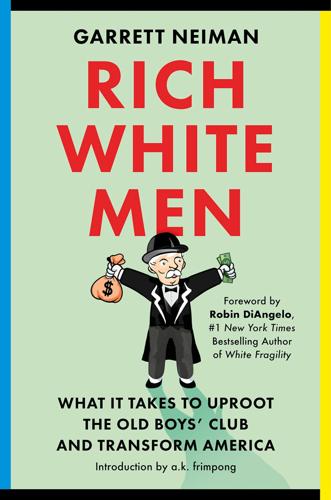
Rich White Men: What It Takes to Uproot the Old Boys' Club and Transform America
by
Garrett Neiman
Published 19 Jun 2023
Recalde, and Lise Vesterlund, “Why Women Volunteer for Tasks That Don’t Lead to Promotions,” Harvard Business Review, July 16, 2018, https://hbr.org/2018/07/why-women-volunteer-for-tasks-that-dont-lead-to-promotions. 4. Babcock, Recalde, and Vesterlund, “Why Women Volunteer.” 5. Amanda Barroso and Anna Brown, “Gender Pay Gap in U.S. Held Steady in 2020,” Pew Research Center, May 25, 2021, https://www.pewresearch.org/fact-tank/2021/05/25/gender-pay-gap-facts/. 6. Stephen Dubner, host, “Is Venture Capital the Secret Sauce of the American Economy?,” Freakonomics Radio (podcast), episode 482, November 10, 2021, https://freakonomics.com/podcast/is-venture-capital-the-secret-sauce-of-the-american-economy/. 7.
…
Julia Boorstin, “VC Funding to Women-Led Companies Falls during the Pandemic,” CNBC, March 17, 2021, https://www.cnbc.com/2021/03/17/vc-funding-to-women-led-companies-falls-during-the-pandemic.html. 9. “Physician Salaries Declined over Last Decade,” Oncology Times 28, no. 15 (August 10, 2006): 30, https://doi.org/10.1097/01.COT.0000293390.79865.16. 10. Claire Cain Miller, “The Gender Pay Gap Is Largely Because of Motherhood,” New York Times, May 13, 2017, https://www.nytimes.com/2017/05/13/upshot/the-gender-pay-gap-is-largely-because-of-motherhood.html. 11. Cyndy Baskin, “Contemporary Indigenous Women’s Roles: Traditional Teachings or Internalized Colonialism?,” Violence against Women 26, no. 15–16 (2020): 2083–2101, https://doi.org/10.1177/1077801219888024. 12.
…
My impression is that McKinsey is more interested in landing seven-figure contracts to advise other companies on diversity and inclusion than it is in cleaning up its own shop internally. Such inaction perpetuates disparities that produce compounding unearned advantages for men. Over the past fifteen years, the gender pay gap hasn’t budged: in 2020, women earned 84 percent of what men earned, according to a Pew Research Center analysis of median hourly earnings of both full- and part-time workers.5 Some of that gap is due to direct gender discrimination—different pay for the same work—but there are other factors, too.
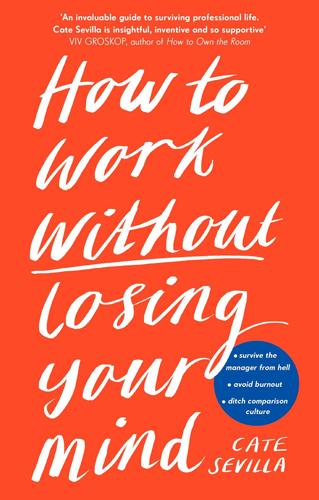
How to Work Without Losing Your Mind
by
Cate Sevilla
Published 14 Jan 2021
Hilda Burke says she thinks there’s extra pressure on women to act ‘sisterly’ towards each other at the moment, given the current political climate: I see so many Instagram posts about how women support each other and pick each other up. That’s all well and good, but the net impact of such generic messages is often guilt in many around experiencing quite natural feelings of envy and jealousy towards other women. Due to the gender [pay] gap, a man getting ahead, winning what looks like an easy promotion, can be dismissed as just being down to the fact that he’s a man. Whereas with another woman, one might feel that we could get what she has – so why haven’t we? It gets even more complicated when we feel unsupported and let down by a female manager or leadership figure.
…
Actions speak louder than company-wide emails It’s all well and good to set up ‘unconscious bias’ training sessions for your team, or to sit on a Diversity & Inclusion panel and make earnest declarations about how important it is to you and your organization. You can even create a ‘Head of D&I’ position and send emails about what you stand for, or tweet about the gender pay gap, and ‘celebrate’ International Women’s Day in the office – but it’s your actions that matter. It’s the things you say, and the way you say them, when nobody other than your team is around to hear you. Do you say you care about Black Lives Matter and diversity but consistently hire cis, white, straight people while claiming, ‘It’s just really hard to attract diversity in this industry’?
…
If you care about diversity and inclusion, and when you walk into the office for the first time to find a sea of white faces, which you feel in your gut is going to be a problem – is this something that’s important enough for you to create a potentially awkward situation now, rather than a more painful one later? Is it worth saying something like, ‘I really loved your article in Campaign about how D&I is so important to this agency; what’s your strategy and approach for building a more diverse and inclusive workforce here?’ If you’re passionate about closing the gender pay gap and about gender balance in the workplace and you notice the company you’re thinking of joining only has one woman on its board, how do you approach this? Do you say something like, ‘I’m really passionate about creating gender balance in the workplace, particularly when it comes to senior management – can you tell me a bit about Platypus Associates’ strategy towards creating a gender-balanced workplace?’
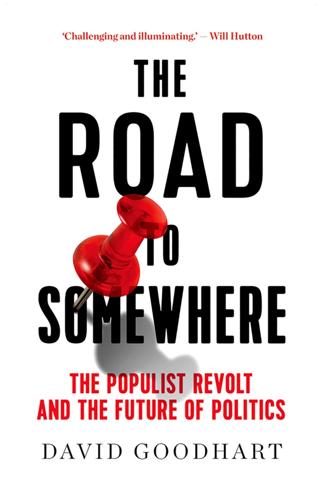
The Road to Somewhere: The Populist Revolt and the Future of Politics
by
David Goodhart
Published 7 Jan 2017
Here is Caroline Dinenage, a Conservative minister, addressing the UN in March 2016 on female autonomy: ‘I agree with Gloria Steinem that, “nothing changes the gender equation more significantly than women’s economic freedom.” So we have given very high priority to maximising women’s life chances in the workplace.’ And in Theresa May’s first speech as prime minister she included in her list of injustices to be tackled the fact that ‘if you’re a woman, you will earn less than a man.’ Yet there is only a small gender pay gap for men and women doing the same work, especially for those under forty (as Alison Wolf shows in her book The XX Factor). Indeed, since 2009 women working full time aged twenty-two to twenty-nine have been earning more than men. The gap May refers to is only generated by conflating the earnings of women of all ages, occupations and full-time/part-time status and comparing them with the same male total—and because many more women work part-time (43 per cent to 13 per cent for men) and are concentrated in some of the lowest paying sectors, such as cleaning and care, the average pay of women is still nearly 20 per cent less per hour than men.
…
The gap May refers to is only generated by conflating the earnings of women of all ages, occupations and full-time/part-time status and comparing them with the same male total—and because many more women work part-time (43 per cent to 13 per cent for men) and are concentrated in some of the lowest paying sectors, such as cleaning and care, the average pay of women is still nearly 20 per cent less per hour than men. And to the extent that the gender pay gap for full time employees persists—it was 9.4 per cent in 2015—it is mainly because men and women are concentrated in different sectors of the labour market.13 Another reason for the domination of Anywhere priorities in family policy is that the mix of feminism (in its many varieties) and individualism are quintessential 1960s liberal baby boomer values and the liberal baby boomer generation now dominates British society and politics.
…
‘Families and households in the UK: 2016’, Office for National Statistics, 4 November 2016, https://www.ons.gov.uk/peoplepopulationandcommunity/birthsdeathsandmarriages/families/bulletins/familiesandhouseholds/2016 9.One Plus One, ‘Children Affected by Separation’, http://www.oneplusone.org.uk/content_topic/breaking-up/limiting-the-effects-of-separation-on-children/ 10.John Bingham and Ashley Kirk, ‘Divorce rate at lowest level in 40 years after cohabitation revolution’, The Telegraph, 23 November 2015, www.telegraph.co.uk/news/uknews/12011714/Divorce-rate-at-lowest-level-in-40-years-after-cohabitation-revolution.html 11.Ann Berrington and Juliet Stone, ‘Cohabitation trends and patterns in the UK’, ESRC Centre for Population Change, February 2015, www.cpc.ac.uk/publications/Cohabitation%20trends%20and%20patterns%20in%20the%20UK.pdf 12.This is the point made by Charles Murray in Coming Apart, his book about white America and the patterns of behaviour in the two imaginary towns Belmont and Fishtown. Charles Murray, Coming Apart: The State of White America, 1960–2010, Crown, 2013. 13.Equal Pay Portal, ‘United Kingdom Data on the Gender Pay Gap’, http://www.equalpayportal.co.uk/statistics/ 14.Office for National Statistics, ‘How is the Welfare budget spent?’, http://visual.ons.gov.uk/welfare-spending/ 15.Relationships Foundation, ‘Counting the Cost of Family Failure’, http://knowledgebank.oneplusone.org.uk/wp-content/uploads/2016/03/Counting-the-Cost-of-Family-Failure-2016-Update.pdf 16.Office for National Statistics, ‘Working and Workless Households: 2015’, http://www.ons.gov.uk/employmentandlabourmarket/peopleinwork/employmentandemployeetypes/bulletins/workingandworklesshouseholds/2015–10–06#households 17.Paul Johnson, ‘IFS Budget Analysis 2014: Introductory Remarks’, https://www.ifs.org.uk/budgets/budget2014/opening_remarks.pdf 18.British Social Attitudes 30, ‘Gender Roles, An incomplete revolution?’

Brotopia: Breaking Up the Boys' Club of Silicon Valley
by
Emily Chang
Published 6 Feb 2018
“We believe everyone deserves”: “Career Opportunities,” Slack, accessed Nov. 20, 2017, https://slack.com/careers#openings. Glassdoor, a company: Andrew Chamberlain, “Demystifying the Gender Pay Gap,” Glassdoor, March 23, 2016, https://www.glassdoor.com/research/studies/gender-pay-gap/. For computer programming: Andrew Chamberlain, “The Widest Gender Pay Gaps in Tech,” Glassdoor, Nov. 15, 2016, https://www.glassdoor.com/research/studies/gender-pay-gap/. In 2015, Slack performed: “Inclusion and Diversity at Slack,” Slack, Sept. 9, 2015, https://slackhq.com/inclusion-and-diversity-at-slack-e42f93845732. The company is also contributing: “Diversity at Slack,” Slack, April 26, 2017, https://slackhq.com/diversity-at-slack-d44aba51d4b6.
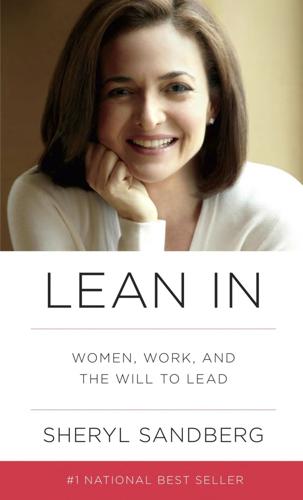
Lean In: Women, Work, and the Will to Lead
by
Sheryl Sandberg
Published 11 Mar 2013
Government Printing Office, 2011), 12, http://www.census.gov/prod/2011pubs/p60-239.pdf. Statistics cited are drawn from calculations of the gender pay gap based on median annual earnings. According to Dr. Pamela Coukos, a senior program advisor at the Department of Labor’s Office of Federal Contract Compliance Programs, the most commonly cited estimate of the gender pay gap is based upon the difference between men’s and women’s median annual earnings. Another widely used estimate of the gender pay gap is based upon the difference between men’s and women’s median weekly earnings. Some scholars believe weekly earnings are more accurate because they can better account for differences in the total number of hours worked, and since men often work more hours than women, this difference can account for some of the pay gap.
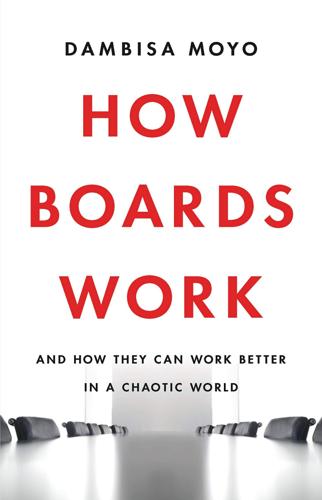
How Boards Work: And How They Can Work Better in a Chaotic World
by
Dambisa Moyo
Published 3 May 2021
How Might the Changing Face of Shareholder Activism Affect Your Company? New York: PwC 2019. www.pwc.com/us/en/governance-insights-center/publications/assets/pwc-how-might-the-changing-face-of-shareholder-activism-impact-your-company.pdf. Government Equalities Office. “100% of UK Employers Publish Gender Pay Gap Data.” News release, August 1, 2018. www.gov.uk/government/news/100-of-uk-employers-publish-gender-pay-gap-data. Green, Francis. “Occupational Pension Schemes and British Capitalism.” Cambridge Journal of Economics 6, no. 3 (September 1982): 267–283. https://doi.org/10.1093/oxfordjournals.cje.a035513. Green, Jeff. “#MeToo Snares More Than 400 High-Profile People.”
…
Michaels, Ed, Helen Handfield-Jones, and Beth Axelrod. The War for Talent. Boston: Harvard Business School Publishing, 2001. Microsoft. “TEALS Program.” www.tealsk12.org. Miller, Claire Cain. “How a Common Interview Question Hurts Women.” New York Times, May 1, 2018. www.nytimes.com/2018/05/01/upshot/how-a-common-interview-question-fuels-the-gender-pay-gap-and-how-to-stop-it.html. Milt, David Jinks. 2030: The Death of the High Street. Brentford, UK: ParcelHero, 2017. www.parcelhero.com/content/downloads/pdfs/high-street/deathofthehighstreetreport.pdf. Minghui, Ren. “Ending the Epidemics of High-Impact Communicable Diseases.” World Health Organization, October 1, 2018. www.who.int/news-room/commentaries/detail/ending-the-epidemics-of-high-impact-communicable-diseases.
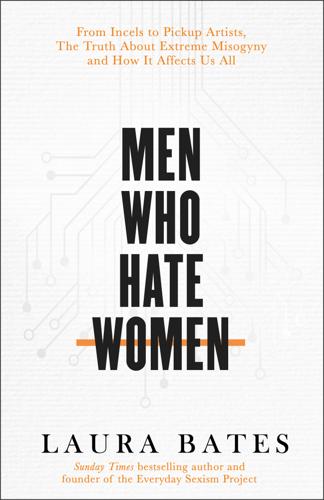
Men Who Hate Women: From Incels to Pickup Artists, the Truth About Extreme Misogyny and How It Affects Us All
by
Laura Bates
Published 2 Sep 2020
A year before I started writing this book, it wasn’t a community Alex had ever heard of either. Alex was a disillusioned young white man in his early twenties. He wasn’t a hardened misogynist, just a bored guy surfing the internet. A bored guy with a vague awareness of people talking a lot about sexual harassment and the gender pay gap on the news, and an uneasy sense that maybe that wasn’t great for him. Alex was twenty-four and had never had a girlfriend. He didn’t have a lot of money and he felt frustrated and lonely. It didn’t seem fair that people were complaining about women’s needs when his lot in life, as a supposedly ‘privileged’ white guy, didn’t seem so splendid.
…
When we automatically reach for the word ‘bitch’ to describe a woman who has acted in a way we don’t like. This is not extreme misogyny, but it is there nonetheless, and it has an impact. Fifty per cent of men are not extremist misogynists. But a recent survey found that almost half of all American men believe the gender pay gap is ‘made up to serve a political purpose’.24 That is what extremely successful fear-mongering looks like. And so you find yourself sitting on a panel at a literary festival, faced with a male audience member, who seems very nice and well-meaning, asking you, half-apologetically, how men are supposed to support movements like #MeToo when there is ‘evidence’ that thousands of innocent men have lost their jobs for no reason.
…
Particular themes started cropping up again and again. Why should we listen to you when women lie about rape? Feminism is a man-hating conspiracy designed to let women take over the world when men are the real victims of gender inequality in today’s society. Men are actually more likely to be victims of domestic violence than women. The gender pay gap is a myth. The tone was breathless and defiant; the pose adopted was one of crusaders, speaking truth to power. The boy who quite calmly accused me of lying about my own sexual assault was not an outlier. He was part of something bigger. Now, having spent many months immersed in the manosphere, the arguments and their wording are immediately recognisable.

Flowers of Fire: The Inside Story of South Korea's Feminist Movement and What It Means for Women's Rights Worldwide
by
Hawon Jung
Published 21 Mar 2023
But behind the facade of its economic, technological, and cultural dominance also lies a history of deep-seated gender discrimination that, despite all the country’s modern advances and reputation, has changed relatively little over the years. South Korea has such dire records in women’s rights within the industrialized world that it hovers at the bottom of many surveys on women’s status among advanced nations. The country has recorded the largest gender pay gap in the Organization of Economic Co-operation and Development (OECD)’s annual survey every single year since its inception three decades ago. Similarly, it has remained at the bottom of the Economist’s glass-ceiling index without fail since the magazine’s annual measure of the “role and influence of women in the workforce” was launched in 2013.
…
Still, the situation at Samsung was better than at most workplaces in the country. At the time, nearly 70 percent of South Korean companies listed on the local stock markets—more than 1,400 firms—did not have a single female executive. Overall, women accounted for only 4 percent of seats in corporate boardrooms.28 Meanwhile, South Korea still had the biggest gender pay gap according to the Organization of Economic Co-operation and Development. Despite decades of promising improvements, South Korea had been the unchallenged worst performer—by a large margin—out of nearly forty advanced economies since the OECD began its annual survey in 1995.29 In another reminder of just how difficult it was for women to climb up the ladder—or to be on the ladder at all—many firms, including the country’s top banks, secretly slashed the written-test and interview scores of hundreds of female applicants—including a woman who recorded the highest score—and boosted those of less-qualified men to hire them instead.30 Sure, women had made great inroads into elite civil services and outnumbered men in newly appointed diplomat or court judge positions.
…
“The government kept telling women to have more children,” she said, “but how can we, in a country like this?” Many women like Park, pressured to leave their jobs, later—once their children are old enough—get temporary jobs with lower pay and little job security, a major reason behind South Korea’s vast gender pay gap that has remained the largest among the OECD member nations for decades (the current gap stands at 31 percent as of 2021, nearly three times the OECD average of 11.7 percent). Under the “iron ceiling” created by the patriarchal norm in family and corporate life, the country also continues to hover near the bottom of many global surveys on women’s status at workplaces.
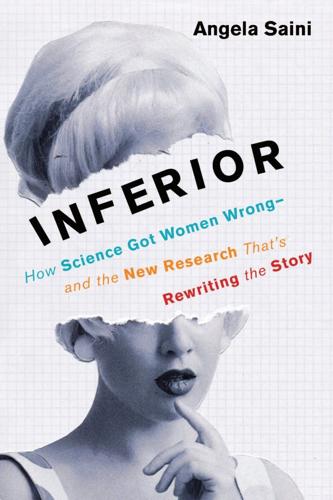
Inferior: How Science Got Women Wrong-And the New Research That's Rewriting the Story
by
Angela Saini
Published 29 May 2017
The Institute for Women’s Policy Research in the United States estimates that in 2015 women working full time earned only seventy-nine cents for every dollar that a man earned. In the United Kingdom, the Equal Pay Act was passed in 1970. But today, according to the Office for National Statistics, a gender pay gap of more than 18 percent still exists, although it’s falling. In the scientific and technical activities sector this gap is as big as 24 percent. Housework and motherhood aren’t the only things affecting gender balance. There’s outright sexism, too. In a study published in 2012, psychologist Corinne Moss-Racusin and a team of researchers at Yale University explored the possibility of gender bias in recruitment by sending out fake job applications for a vacancy of laboratory manager.
…
A New Science Says Yes” (Playboy), 124 ducks, mallard, 130 Dyble, Mark, 116–17 Eddy, Sarah, 5–6 education, sexism in, 8 Ehrenberg, Israel, 177 Eliot, Lise, 85 empathizing-systemizing theory (Baron-Cohen): critiques, 63, 67–70; supporting evidence, popularity, 52–55, 57, 63 endocrinology. See estrogen; hormone therapy for menopause; sex hormones; testosterone Engels, Friedrich, 146 the Enlightenment, view of science during, 16 Equal Pay Act, UK, and the gender pay gap, 5 The Essential Difference (Baron-Cohen), 54–55 essentialism, 93 Estioko-Griffin, Agnes, 114–15 estrogen: loss of, and menopausal symptoms, 159–60; in men, discovery of and implications, 25–26. See also hormone replacement therapy for menopause; menopause; sex hormones Eté, Democratic Republic of the Congo, alloparenting among, 102 Evans, Herbert, 26 Eve, as subservient woman, 19 evolutionary biology: data on sex differences, 94–95; and the development of language and intelligence, 112–13; explanations for female orgasm, 145; explanations for menopause and postmenopausal survival, 161–63, 165, 168–69; and the importance of primate research, 98–99, 154; sexist assumptions, 19, 14–22, 98–99, 116–17, 134, 136; and sexual selection theory, 121–25 evolutionary psychology, and gender-based concepts of monogamy and polygamy, 125–26 The Evolution of Desire: Strategies of Human Mating (Buss), 126 The Evolution of Human Sexuality (Symons), 125 The Evolution of Sex (Geddes and Thomson), 17 The Evolution of Woman, an Inquiry into the Dogma of Her Inferiority to Man (Gamble), 20 extended families, and the grandmother hypothesis, 163 extended longevity hypothesis, 165, 168 Facts and Fictions of Life (Gardener), 74 fathers, fathering, 103, 106–7.
…
See also alloparents; partible patrimony Fausto-Sterling, Anne: on fetal sex hormones and brain development, 70; on human beings as developmental systems, 70; newborn and baby research, 55, 71–72; on Victorian concepts of femininity, 25; on Wilson’s sexist language, 160 female dominance, animals that show, 151–53 female genital mutilation (FGM), 139–41 females, women: and alloparents, 101–2; biases against in high-achieving disciplines, 2–5, 66; as biologically predetermined, 3, 120–21, 131, 133, 143; childcare role, and development of language, 112–13; and choice of mate, benefits to children, 130; and concepts of femaleness, femininity, 16, 23–28, 90; cooperation among, 156; disease incidence and virulence in, 36–37, 40–41; economic limitations and restrictions, 17–18; educational limitations and restrictions, 8; endurance and strength, 31–33, 113–14, 177; experience of, brain effects, 89; as gatherers, work involved in, 109–10; and the gender pay gap, 5; as hunters, 110, 114–15; intelligence and skill acquisition, 63–65, 72–76, 84, 90, 110; and the maternal instinct, 103–4; and mate selectivity, 133; monthly cycles, physiology of, 159; as natural leaders, 177–78; as naturally monogamous, 121–26; pro-male gender bias shown by, 5; sexual assertiveness, 128; sex-related response to medications, 44–45; unique characteristics, 61–62; unpaid labor performed by, 4–5; violence against, 178–79.
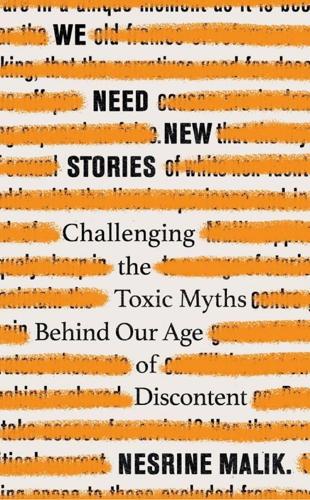
We Need New Stories: Challenging the Toxic Myths Behind Our Age of Discontent
by
Nesrine Malik
Published 4 Sep 2019
This contract is a sort of bargain, where one gives up some rights voluntarily to create an order in which everyone can pursue individual happiness. Every day, women are giving up rights involuntarily to live in an order which is not optimised for the pursuit of their individual or collective happiness. It is not even optimised for their safety. As hard-won abortion rights in the US are rolled back, as the gender pay gap continues to persist and even widen, and as cyber sexual harassment and online abuse becomes an everyday part of a woman’s life, women are told not only that things are fine, but that they have in fact, never been better. I was used to this logic, this myth of gender equality, but did not expect to see it spread in the boardrooms of London, the respectable media of Britain and the United States, and the polite society of ostensibly liberal circles in those two countries.
…
Peterson’s position on women is that they also, because of their genetic make-up, should not wander from their natural perch in the order. He attributes their modern distress at being torn between the demands of work and home to the fact that women went walkabout off the nature reserve. According to Peterson, the gender pay gap, the average difference between the remuneration for men and women in employment (around 20 per cent to the benefit of men in the US and the UK) is largely a natural reflection of existing differences between men and women. These differences are explained in his adaptation of the ‘Big Five personality traits’ taxonomy: openness to experience, conscientiousness, extraversion, agreeableness and neuroticism.
…
Immediately after his inauguration, Trump also instituted a policy known as the ‘Global Gag Rule’ that makes non-governmental organisations receiving US funds for global health issues prove they do not use their other funding to provide abortions or talk about the option with patients. NGOs could not use US aid for abortion services before this rule. Trump also stopped an Obama-crafted rule from going into effect that would make companies track payment data based on race and gender. The data was meant to help close the gender pay gap. On a global level, according to the 2017 World Economic Forum report on gender equality, there has been a similar reversal in positive trends. Now in its eleventh year, the Global Gender Gap Report has given WEF an opportunity to identify long-term trends in gender equality, and the picture that is emerging shows that there is a sort of terminal velocity that has been reached.
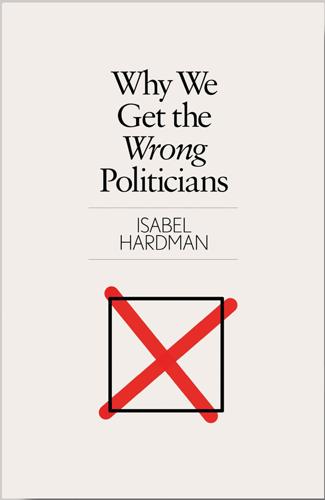
Why We Get the Wrong Politicians
by
Isabel Hardman
Published 14 Jun 2018
The cost seems to disproportionately affect women, too: a survey of 3,107 Labour members by the Fabian Society found that 49 per cent of women who have stood for selection for Parliament, Europe or a devolved administration couldn’t afford what they needed for their campaign. Just 27 per cent of men said the same.3 Presumably this is because of the gender pay gap, and because the bulk of childcare responsibilities fall upon women, meaning they have less access to savings. Polly Billington stood for Labour in Thurrock in 2015. After 18 years with a Labour MP, the seat had fallen to the Tories in 2010, albeit by only 92 votes. Billington was horrified when she first visited the constituency, because she couldn’t believe her party had managed to lose a working-class seat.
…
INDEX abortion, 66–7, 113 Abu Qatada, 157 abuse, 6, 28–30, 74, 154, 164–7 addiction, xviii–xx, 6, 30, 160–62 adoption, xvi, 233 Advice Plus, 67 Afghanistan War (2001–14), 257 Airports Commission, 212 alcohol, xvii, xviii, 44, 140, 141, 157–62 Alcohol Concern, 160, 162 All-Party Parliamentary Group on Fire Safety, 203 all-women shortlists (AWS), 15 Alternative Vote referendum (2011), 270 Altmann, Rosalind, 196 ambition, 120 Amin, Afzal, 7–8, 18 anorexia, 162 Antcliffe, Katherine, 143 anti-Semitism, xii, 99, 154, 165, 179 asbestos, 232 Asda, xiv Ashfield, Nottinghamshire, xxv al-Assad, Bashar, 258 asylum, 61 Atkinson, Andrew, 21 Atlantic, The, 260 Atlas Stones, 3 Atos Healthcare, 242, 243 Austen, Jane, 165 Australia, 65, 109 aviation policy, 211–13 Bad Laws (Johnston), 226 Bailey, Bex, 147 Baker, Kenneth, 226 Baker, Steve, 77–8 Balls, Edward, 53, 186, 195 Bank of England, 89 Barker, Greg, 174 Barwell, Gavin, 204 Bath, Somerset, 29, 178–9 Batley and Spen, Yorkshire, 72–4 bedroom tax, 234–41 benefits, xx, 28, 61, 68, 87, 94, 107, 198, 234–45 Benghazi, Libya, 259 Benn, Anthony ‘Tony’, 172 Bennett, Kate, 143 Bercow, John, 55–6, 112, 269–70, 271, 274 bereavement, 122 Berger, Luciana, 165 Bermondsey and Old Southwark, London, 117 Best, Richard Stuart, Baron Best, 238 Billington, Polly, 9–10, 31 bills, 85–100, 105–6, 113–5, 127, 136–7, 273 ‘Christmas tree bills’, 105–6 Crime and Courts Bill (2012–13), 223–6 European Union Withdrawal Bill (2017–), 93, 262 Health and Social Care Bill (2011–12), 88, 127–8, 245–52 Immigration Bill (2014), 93 Investigatory Powers Bill (2015–16), 87 Legal Aid, Sentencing and Punishment of Offenders Bill (2011–12), 98, 230–34 and rebellion, 17, 92, 94–6, 136–7, 229 Welfare Reform Bill (2011–12), 235–41 Birmingham Yardley, 75 Birstall, Yorkshire, 73 black pudding, 109 Blackford, Ian, 22 Blackman, Robert ‘Bob’, 104–5 Blackwood, Nicola, 78 Blair, Anthony ‘Tony’, xx, 27, 175, 177, 216, 251 and Field’s welfare reform proposals, 129–30 and Iraq invasion (2003), 254–6, 259 Royal Commission on social care, 216 ‘sofa government’, 259 Teenage Pregnancy Strategy (1999), 135 Blears, Hazel, 154 bobbing, 52 de Bois Nick, 181, 182 Boles, Nicholas, 130 Bolsover, Derbyshire, 54 Bonehill-Paine, Joshua, 165 Borwick, Victoria, 202, 205 Botting, Peter, 10–11, 17 Brady, Graham, 85, 89, 268 Brand, Russell, xi–xii Bray, Angie, 104–5 bread-throwing, 78 Brennan, Kevin, 91 Brexit, x, 65, 93, 136, 175, 212, 262–5, 270–71 Brexit Select Committee, 265 Bridgen, Andrew, 239 British Broadcasting Corporation (BBC), xi–xii, 99, 203, 205, 222, 258 British Medical Association, 248 Brixton, London, 193 Brooke, Heather, 45 Brown, Gordon, 65, 121, 134, 196, 258 Buck, Karen, 67–70, 79, 205, 238 Budgets, 53, 101, 110, 134, 157, 194–8, 235 Building Control Alliance, 206 Bundestag, 273 Burn Book, 277 Burnham, Andrew, 216, 220, 279 Burstow, Paul, 248 Bush, George Walker, 255 Butler Review (2004), 258 by-elections, 6, 9 2012 Rotherham, 15 2014 Clacton, 139 2016 Richmond Park, 212 Byrne, Liam, xviii, 161 Cable, Vince, 41 Cairns, Alun, 79 Cameron, David, xv, xix, 12, 30, 58, 112, 127, 175, 196 constituency work, 64–7, 175, 234 EU negotiations (2016), 54 EU referendum (2016), 175 expenses scandal (2009), 45 Forestry Commission privatisation (2011), 117 and Halfon, 122 Health and Social Care Bill (2011–12), 127, 246, 248–9, 251 and Heathrow Airport third runway, 212 Islamic State airstrikes (2014), 259 legal aid cuts U-turn (2016), 64, 82, 233–4 Libya intervention (2011), 259–62 Lopresti–Jenkyns affair (2015), 142 on Major, 175 and Morgan, 127 National Security Council, establishment of (2010), 259 ‘neighbours from hell’, 223 ‘new politics’, 88 and pay rise, 48 and peerages, 98 and phone hacking, 223–4 reshuffles, 121 resignation (2016), 175–6, 177 and riots (2011), 222 and Smith, 134 and Syria debate (2013), 258 ‘We’re all in this together’, 194 and women’s issues, 201–2 Cameron, Ivan, 66 Cameron, Samantha, 201–2 Camira Fabrics, 109 Campaign to Protect Rural England, 116 Campbell, Menzies, 53–4, 161 Canada, 79 Cann, Jamie, 160 caravan tax, 195 Care Quality Commission, 65, 217 Carlton Club, 34 Carswell, Douglas, 96, 139 cash-for-access scandals, xii Census of Local Authority Councillors, xxiv Chakrabarti, Shami, 99 Champion, Sarah, 15 Change.org, 117 Channel Four, 150 charity tax, 196 Chaytor, David, 46 Chief Medical Officer, 67 Chilcot inquiry (2009–16), 255, 256, 258, 261 children, 9, 16, 28, 154–6, 280 child benefit, 198 childcare, 9, 16, 280 China, 109 Choudhry, Roshonara, 76 ‘Christmas tree bills’, 105–6 church roof tax, 196 Churchill, Winston, 57, 60 circular chamber, 56–7 City Seats Initiative, 26 clapping, 52 Clarke, Kenneth, 174–5 Clarke, Mark, xxi–xxii, 8, 18, 24 Clegg, Nicholas, 12, 99, 248, 249 Clifford Chance, xxi Coalition government (2010–15) Crime and Courts Bill (2012–13), 223–6 Dilnot Commission, 216–17 and fire regulations, 207 Fixed Term Parliaments Act (2011), 184, 213 Health and Social Care Bill (2011– 12), 88, 127, 245–52 House of Lords Reform Bill (2012), 272 legal aid cuts, 64, 82, 229–34 and National Trust, 116 Omnishambles Budget (2012), 134, 194–7 and petitions, 118 and Wright report (2010), 271–2, 274 Welfare Reform Bill (2011–12), 235–41, 242 Coffey, Therese, 52, 80 Colne Valley, Yorkshire, 109 Colorado, United States, 3 committee rooms, 37 Communities and Local Government, 106, 130, 133, 203, 222, 236–7 community charge, 193, 197 Cones Hotline (1992), 226–7 conferences, 6, 7 Conservative Party Amin scandal (2015), 7–8, 18 and bills, scrutiny of, 84, 85, 88, 89–90, 93, 96–7 Budgets, 101, 134, 194–8, 235 Carswell defection (2014), 96, 139 City Seats Initiative, 26 Cones Hotline (1992), 226–7 constituency work, 64–7, 77–9, 80 cost of candidacy, 18, 19, 21, 32 Criminal Injuries Compensation Scheme (2012), 103–5 Dangerous Dogs Act (1991), 226 divorce rates, 138 Education Regulations (2015), 102–3 EU Withdrawal Bill (2017–), 93, 262 expenses scandal (2009), 45 Health and Social Care Bill (2011–12), 88, 127, 245–52 and Heathrow Airport third runway, 211–13 heckling, 53–4 and homosexuality, 16, 29 and housing benefit, 235 and incapacity benefit, 242 Immigration Bill (2014), 93 Islamic State airstrikes (2014), 259 Johnson, suicide of (2015), xxi and legal aid, 64, 82, 229–34 legislation, scrutiny of, 84, 85, 88, 89–90, 93, 96–7 Libya intervention (2011), 259–62 long-term economic plan, 110 losing candidates, 34, 178–83 membership figures, xxii National Security Council, establishment of (2010), 259 and National Trust, 116 1922 Committee, 85, 89, 176, 268 parliamentary assessment boards, 7–8, 14 parliamentary private secretaries (PPSs), 125 partners and spouses event (2015), 140 peers, 98 and phone hacking, 223–6 Plebgate (2012), 167 and pointless questions, 109–12 poll tax (1989–90), 193, 197, 219 Reckless defection (2014), 158 and riots (2011), 222 Road Trip, xxi selection process, 7–8, 9, 10–11, 12, 14, 16, 17–18 sex scandals, 142–3, 146–7, 152 and social care, 214, 216–20 Syria debate (2013), 258, 259 Treasury Questions (2014), 109–10 Victims of Overseas Terrorism Compensation Scheme (2012), 103–5 voter contact targets, 26 ‘We’re all in this together’, 194 Welfare Reform Bill (2011–12), 235–41 whipping, 89, 90, 93, 96–7 Women2Win, 14, 15 youth wing, xxi–xxii ConservativeHome, 18, 132 consideration of amendments, 100 constituency work, 38, 40, 42–4, 60–82, 139, 173, 192, 198, 205, 207, 229, 275 Conway, Derek, 45 Cook, Chris, 205–6 Cook, Robin, 254 Corbyn, Jeremy, 210–11 constituency work, 40 and heckling, 54 and House of Lords, 99 leadership election (2015), xxiii, 102, 210–11 Marris resignation (2016), 92 and Prime Minister’s Questions, 56, 217–18, 275 rebellions, 95, 136 and Venezuela, 277 cost of candidacy, 18–23, 32, 35 councillors, xxiv–xxv, 21, 80 Cowdy, Serena, 143 Cox, Brendan, 73, 74 Cox, Helen Joanne ‘Jo’, 63, 72–4, 76, 165 Crabb, Stephen, 145 Creasy, Stella, 15, 165 Crewe, Ivor, 90, 273 Crime and Courts Bill (2012–13), 223–6 Criminal Injuries Compensation Scheme (2012), 103–5 cross-benchers, 97 Crouch, Tracey, 155, 163 Croydon South, London, 11 Cumbria, England, 70–71 Daily Mail, 136, 143 Daily Politics, 123 Daily Telegraph, 45 Dalyell, Thomas ‘Tam’, 257 Dangerous Dogs Act (1991), 226 Davies, Howard, 212 Davies, Philip, 114 Davis, David, 264–5 Davis, Rowenna, 4–5 death penalty, 113 death tax, 216, 220 dementia tax, 215, 219–20 dementia, 65–6, 209, 215 demotions, 133–5, 174 Denham, John, 4 Department of Health, 132, 133 departmental question sessions, 108–13 depression, 163, 167–8 Devine, James ‘Jim’, 46 Devizes, Wiltshire, 14 Devon, England, 88 Dickens, Charles, 54 Dilnot Commission, 216–17 disabled people, xiv, 66 Dismore, Andrew, 114 divorce, 6, 30, 80, 138–41, 163 Dobson, Frank, 84 domestic violence, xx, 199, 201, 232, 237 Don Valley, Doncaster, xvi dopamine, xix Dorrell, Stephen, 252 Dorries, Nadine, 35 Down’s syndrome, 66–7 Doyle-Price, Jackie, 31 draft bills, 87 Draft Criminal Injuries Compensation Scheme (2012), 103–5 Draft Victims of Overseas Terrorism Compensation Scheme (2012), 103–5 dressing-downs, 26 Dugher, Michael, 53 Duncan Smith, Iain, 257 dysfunctional upbringings, xvi East Ham, London, 76 East Worthing and Shoreham, Sussex, 79 eating disorders, 161, 162 Economic and Social Research Council, xxiii Ecorys, 222 Education Department, 135–6 Education Regulations (2015), 102–3 Education Select Committee, 135–6 ego of government, 87, 109, 240, 250 elephant, 27 Ellwood, Tobias, 48–9 Elphicke, Charles, 152 Emergency Budget (2010), 235 Employment and Support Allowance Regulations (2008), 242 Enfield North, London, 181 English Defence League, 7–8 Equality and Human Rights Commission, xxvi ‘Equity and Excellence’, 247 Erskine May, 54 ethnic minority MPs, xiii–xiv, 17 Eton College, xiii European Council, 64 European Union (EU), x, 54, 64, 65, 93, 129, 136, 175, 212, 262–5 European Union Withdrawal Bill (2017–), 93, 262 Evans, Jonathan, 104–5 Evans, Nigel, 230, 233 Evening Standard, 56, 176 executive, 84, 93, 95, 100–106, 111, 113, 120, 122, 136, 254–65 expenses scandal (2009), xii, 44–7, 173, 271 Fabian Society, 9, 16 Fabricant, Michael, 78–9 Facebook, 29, 30 Fallon, Michael, 146 family, 29, 39, 141, 158, 172 children, 9, 16, 28, 39, 154–6, 280 and constituencies, 43, 139–40 and loneliness, 158, 163 and losing seats, 154, 187–8 marriage, 6, 30, 80, 138–46, 163, 173, 187–8 money problems, 20, 32 and resignations, 172, 173 sitting hours, 39, 158 Farage, Nigel, 210 Farron, Timothy, 70–71, 98 Field, Frank, 130 Field, Mark, 143 filibustering, 113–15, 278 Fixated Threat Assessment Centre, 74 Fixed Term Parliaments Act (2011), 184, 213 Fleetwood, Lancashire, xvii Flint, Caroline, xvi–xviii, 134 Flint, Peter, xvi–xvii Folkestone and Hythe, Kent, 11 food banks, 72 Foreign Affairs Select Committee, 257, 261, 264 Forestry Commission, 117 Forth, Eric, 54 Frazer, Lucy, 59 Freedom of Information, 45 Friday sessions, 113–15 Friends of the Earth, 116 Fuller, Richard, 239 Gaddafi, Muammar, 259–61 Gardiner, Barry, 55 Garrick Club, london, 114 gastrointestinal surgeons, 228 Gauke, David, 112, 270 Gay, Oonagh, 62 gender pay gap, 9 general election, 1997, xvii, 31, 175 general election, 2001, 15, 160 general election, 2005, 15, 35 general election, 2010, 14, 20, 31, 185, 237 general election, 2015 Amin, Afzal, 7–8, 18 Atkinson, Andrew, 21 Billington, Polly, 9–10, 31 Burnham, Andrew, 279 Cable, Vince, 41 cost of candidacy, 18, 20–21, 22, 23, 32, 35 Davis, Rowenna, 4–5 Godfrey, Kate, 27 Liberal Democrat losses, 34 ‘long-term economic plan’, 110 losing candidates, 179, 181, 185 Mathias, Tania, 40–41 Onn, Melanie, 15 Mann, Scott, 25 national swing, 31, 34 resignations, 174 Scott, Lee, 179 Scottish Labour, 38–9 selection process, 4–5, 7–8, 9–10, 15 Slade, Vikki, 20–21, 32 Streeting, Wes, 35 tax lock, 218 Watkins, Dan, 24 general election, 2017, x, xiii, xxiii, 5, 31, 176, 181, 213, 281 Atkinson, Andrew, 21 Cable, Vince, 41 cost of candidacy, 21, 23 Goldsmith, 212 Howlett, Ben, 178–9 losing candidates, 181–2, 183, 184 and social care, 218–20 General Medical Council, xi Germany, 273 Gerrard, Neil, 243 Gilligan, Andrew, 258 Glasgow Central, Scotland, 71–2 Glen, John, 78 ‘glorified social work’, 60, 63, 173 Godfrey, Kate, 27–8, 32 Goldsmith, Zac, 212 Goldsworthy, Alison, 150–51 Goodman, Helen, 52 Google, 111 gossip, 123, 129, 170 Gove, Michael, xvi, 64, 128, 133, 143, 233–4 granny tax, 195–6 Grant, Helen, 104–5 Gray, James, 81 Grayling, Christopher, 132–3, 233 Great Grimsby, Lincolnshire, 15 Greatrex, Thomas, 91 Green Belt, 116 green papers, 87 Green, Damian, 146 Green Party, xxiii, 96, 280 Greening, Justine, 129, 212 Greggs, 195 Grenfell Tower fire (2017), 198, 202–8 Grieve, Dominic, 93 Guildford, Surrey, ix Gummer, Ben, 231 Gurling, Sarah, 160 Hackney, London, 9 Hague, William, 174, 260 Halfon, Robert, 122 Hames, Duncan, 155 Hammond, Philip, 270 Hancock, Matt, 121 Hands, Greg, 121, 139–40 Hanningfield, Lord, see White, Paul Hansard Society, 40, 49, 56, 102, 111, 262 Harlow, Essex, 122 Harman, Harriet, 15 Harrow East, London, 29 Hartley-Brewer, Julia, 146 Harvey Nichols, xxii Havant, Hampshire, 111 Have I Got News for You, 123 Healey, John, 78 Health and Social Care Bill (2011– 12), 88, 127–8, 245–52 Heath, David, 188 Heathrow Airport, 211–13 heckling, 53–5 Hereford, Herefordshire, 21 Heys, Mary Kate, 65 Hill, Fiona, 182 Hinds, Damian, 231 Hinduism, 29 HMRC (Her Majesty’s Revenue and Customs), 106–7 Hodge, David, 217 Hodge, Margaret, 106–7, 108, 174, 247 homelessness, 199 homogeneity, 192 homosexuality, 16, 29, 113 Hosie, Stewart, 143 House Business Committee, 272 House of Commons, 36–43, 51–9, 276–7 address, terms of, 51 bobbing, 52 Budget, 53 clapping, 52 debates, 37, 38, 39, 42 departmental question sessions, 108–13 as dysfunctional, 41–3 facilities, 36 Friday sessions, 113–15 heckling, 53–5 language rules, 51–5 layout, 36, 41 legislation, 13, 17, 37, 50, 52, 58, 81–2, 83–97 maiden speeches, 51, 63, 72 private members’ bills, 113–15 Press Gallery, 73 Prime Minister’s Questions, 52, 53, 55–6, 112, 123, 199, 217–18, 271, 275–6, 277 Queen’s Speech, 55 renovation, need for, 36, 214 sitting hours, 39, 158 Scottish Questions, 110–11 Speaker, 51–2, 55 House of Lords, 84, 85, 86, 94, 95, 97–100, 102, 238, 250, 267 housing, 67–70, 82, 87, 107, 116, 130, 202–8, 234–41 Howlett, Ben, 29, 161, 162, 178–9, 182 Huddersfield, Yorkshire, 109 Hughes, Simon, 117 Hunt, Jeremy, 125, 128, 219, 252 Hunt, Tristram, 68 Hutton, John, 242, 243 Hutton inquiry (2003–4), 258 ICAP, 98 Ilford North, London, 35, 179 immigration, 61, 71–2, 77, 118, 233 Immigration Bill (2014), 93 Impress, 225 incapacity benefit, 241–5 incumbency factor, 24 Independent Parliamentary Standards Authority (IPSA), 47, 74–5, 181–2 Independent Press Standards Organisation (IPSO), 225 Inglese, Anthony, 107 Inside Housing, 203 Inside Out (Watt), xix International Development, 260 Investigatory Powers Bill (2015–16), 87 Iran, 128 Iraq War (2003–11), 76, 254–9 Islamic State (IS), 258, 260 Jackson, Stewart, 182 Javid, Sajid, 219 Jenkin, Anne, 14 Jenkyns, Andrea, 142–3 Jobseeker’s Allowance, 94 John Lewis, 45 Johnson, Alan, 48 Johnson, Boris, 123, 128–9, 166, 210, 212 Johnson, Elliott, xxi Johnston, Philip, 226 jolly hockey sticks, 15 Jones, Fiona, 160 Jones, Kevan, 168, 169 journalists, 36, 42, 73, 123, 131, 133, 159, 167, 198–9 phone hacking, 223–6 Jowell, Tessa, 132 Kelly, David, 258 Kempen, Katie, 200 Kennedy, Charles, 160, 161 Kenny, Bernard, 73 Kensal Rise, London, 70 Kerevan, George, 89 KGB (Komitet gosudarstvennoy bezopasnosti), 78–9 King, Anthony, 12, 90, 273 Kumaran, Uma, 29 Labour Party all-women shortlists (AWS), 15–16 and anti-Semitism, 99 Bailey rape scandal (2017), 147 and bills, scrutiny of, 87, 89, 91, 92 constituency Labour Party (CLP), 7 constituency work, 62, 67–70, 72–7, 79, 80 cost of candidacy, 19, 22, 23, 35 Cox murder (2016), 73, 76, 165 divorce rates, 138 dressing-downs, 26 Education Regulations (2015), 102–3 Employment and Support Allowance Regulations (2008), 242–3 expenses scandal (2009), 45, 46 Facebook support group shutdown, 30 factions, 27–8 and Health and Social Care Bill (2011–12), 247 heckling, 53, 54–5 and incapacity benefit, 242 and Iraq War (2003–11), 76, 254–9 leadership election (2015), xxiii, 102, 210–11 Legal Aid, Sentencing and Punishment of Offenders Bill (2011–12), 98 legislation, scrutiny of, 87, 89, 91, 92 and Libya intervention (2011), 259 losing candidates, 32, 182–3 Marris resignation (2016), 92 membership figures, xxiii peers, 99 and phone hacking, 224 Progress, 27 Representation Committee, 27–8 Scottish Labour, 38–9 selection process, 7, 9–10, 13, 14, 15–16 sexual harassment scandals, 147, 152 and social care, 216, 220 Teenage Pregnancy Strategy (1999), 135 Timms, stabbing of (2010), 76–7 and trade unions, 10, 13 voter contact targets, 26–7 and Welfare Reform Bill (2011–12), 237–8, 239, 240 whipping, 91 Lakanal House fire (2009), 202–3 Lansley, Andrew, 127, 174, 245–52 Law Society, 233 Leadsom, Andrea, 264 Leapman, Ben, 45 legal aid, 64, 82, 229–34 Legal Aid, Sentencing and Punishment of Offenders Bill (2011–12), 98, 230–34 legislation, 13, 17, 37, 50, 52, 58, 81–2, 83–119, 177 bills, 85–100, 105–6, 113–5, 127, 136–7, 273 executive, 100–106, 254–65 secondary legislation, 100–106, 253 Leveson Inquiry (2011–12), 224–5 Lewis, Brandon, 203 Lewis, Ivan, 147 Liberal Democrats assessment days, 7, 8 constituency work, 61, 70–71 cost of candidacy, 19, 20–21 divorce rates, 138 and Health and Social Care Bill (2011–12), 245, 247–8, 249, 250 House of Lords Reform Bill (2012), 272 Leadership Programme, 15 and legal aid, 231 losing candidates, 34 membership figures, xxiii pavement politics, 61 peers, 99 Rennard scandal (2013), 150–51 selection process, 7, 8, 12, 15 tuition fee U-turn (2010), xxiii and Welfare Reform Bill (2011–12), 239, 240 see also Coalition government ‘Liberating the NHS’, 247 Libor crisis (2012), 98 Libya, 259–62 Lichfield, Staffordshire, 78–9 Liddell, Helen, 155 line-by-line scrutiny, 85 Livermore, Spencer, 26 Llwyd, Elfyn, 188, 257 lobby groups, 115–19 Local Government Association, xxiv, 217 local government, xxiv–xxv loneliness, 73, 160–61, 162, 163, 164, 170 Lopresti, Jack, 142–3 Los Angeles, California, 109 losing, 32–4, 177–88 loss-of-office payments, 181–2 Loughton, Timothy, 79, 135–6 Lucas, Caroline, 96, 280 MacNeil, Angus, 143 MacShane, Denis, 46 Madan, Ira, 159–60 Magic Rock, 109 Magritte, René, 224 maiden speeches, 51, 63, 72 maintenance grants, 102 Mair, Thomas, 73–4 Major, John, 175, 226, 252 Mak, Alan, 111–12 Maltby, Kate, 146 Mann, Scott, 25 Marie Antoinette, Queen consort of France, 195 marriage, 6, 30, 80, 138–46, 163, 173, 187–8 Marris, Robert, 92 Mathias, Tania, 40–41 matrons’, 62 May, Philip, 140–41 May, Theresa and Brexit impact assessments, 265 and ‘disloyalty’, 129 and domestic abuse, 201 general election (2017), x, 5, 176, 182, 183, 213, 281 and Heathrow Airport third runway, 212 and Hunt, 128 and Immigration Bill (2014), 93 and Morgan, 136 and National Trust, 116 and Reckless, 157 and sex scandals, 143 and social care, 217 McBride, Damian, 196 McCartney, Jason, 109–10 McDonagh, Siobhain, 199 Meacher, Michael, 89 Mean Girls, 277 mental health, 6, 68, 153, 161, 162– 71, 179, 183 Merrick, Jane, 146 mice, 77, 84, 199 Mid-Dorset and North Poole, 20–21 middle class, 171 Miliband, Edward, 5, 166, 195, 211, 224, 259 military, xv Miller, Maria, 224 Mills, Iain, 160–61 Milnthorpe, Cumbria, 70–71 Milton, Anne, ix, 169 ministerial positions, 126–37 Mirror, 143 Mitcham and Morden, London, 199 Mitchell, Andrew, 167 Mone, Michelle, 98 Monster Raving Loony Party, 19 Moran, Margaret, 46 Morgan, Nicola ‘Nicky’, 127, 136 Morley, Elliot, 46 Morris, David, 143 Mr Blair’s Poodle Goes to War (Tyrie), 255–6 Mulberry, 136 Mumsnet, 279 Mundell, David, 110 Murdoch, Rupert, 125 National Audit Office, 244 National Care Service, 216 National Council for Teaching and Leadership, x–xi National Health Service (NHS), 4, 48, 128, 169, 215, 245–52 National House Building Council, 206 National Planning Policy Framework, 116 National Security Council, 259, 261 National Trust, 116, 130 ‘neighbours from hell’, 223 Neil, Andrew, 99 Neill, Robert ‘Bob’, 233 ‘new politics’, 88 Newmark, Brooks, 142, 162 Newsholme foods, 109 Newsnight, 134, 222 Nimmo, John, 165 no platforming, 75 North Cornwall, 25 North Curtain Corridor, House of Commons, 36 Norton, Philip, 62 Nunn, Peter, 165 Obama, Barack, 260 Observer, 252 Obsessive Compulsive Disorder, 168 old boys’ networks, xxvi, 158 Omnishambles Budget (2012), 134, 194–7 Onn, Melanie, 15 Opposition Day, 264 Order Papers, 52, 206, 225, 263 Osborne, George, 176–7, 196 Budget (2012), 193–7 Budget (2015), 101, 197–8 Evening Standard editorship, 176–7 and Gauke, 112, 270 and Health and Social Care Bill (2011–12), 248–9 patronage, 121 and social care, 217, 248–9 Treasury Questions, 109–10 out of touch, 49, 60, 80, 192, 209 Oxford University, 197 Oxford West and Abingdon, 78 Panorama, 203 paperwork, 67–8, 229 Paralympics, 196 parenthood, 9, 16, 28, 154–6 parking, 71 Parkinson’s disease, 66 parliamentary assessment boards, 7–8 parliamentary private secretaries (PPSs), 112, 124–5, 271 pasty tax, 195 Pathways to Politics, xxvi patronage, 57, 84, 95, 110, 121, 268 pavement politics, 61 Paxman, Jeremy, 111, 134 pay rise, 47–9 peerages, 98–9 Perry, Claire, 14–15, 121 personality cults, xxi–xxii Peter Pan, 114 petitions, 117–19 Pew Research Center, 269 Phillips, Jessica, 75, 123, 200 Philp, Chris, 11 phone hacking, 223–6 Pickles, Eric, 116, 130, 203, 237 de Piero, Gloria, xxv–xxvi, 48 Pincher, Chris, 54 ‘ping pong’, 100, 238 Plaid Cymru, 188, 257 pointless questions, 108–12, 277 poll tax, 193, 197 ‘pork barrel politics’, 269 pornography, 146 Portcullis House, London, 36, 90, 97, 161, 184 poshness, 14–15 postmen, 25, 104 pre-legislative scrutiny, 87 Prescott, John, 79 Press Association, 124 Press Gallery, 73 Prime Minister’s Questions, 52, 53, 55–6, 112, 123, 199, 217–18, 271, 275–6, 277 Prisk, Mark, 130, 133 private members’ bills, 113–15 private schools, xiii Privy Council, 51 programme motions, 272 Progress, 27 prospective parliamentary candidates (PPCs), 3–18 Public Accounts Committee (PAC), 106–7, 244 Public Administration Select Committee, 271–2, 274 public payback, 275–6 Pudsey, Yorkshire, 109 Pugh, John, 247–8 Purnell, James, 242 Queen Mary University, London, xxiii Queen’s Jubilee, 78 Queen’s Speech, 55 Question Time, xi–xii Quince, William, 122 Raab, Dominic, 93 Radio Four, 160, 171 Reading, Berkshire, 125 rebellion, 17, 92, 94–6, 136–7, 229 Reckless, Mark, 157–8 red boxes, 126, 132 Redwood, John, 104–5 Rees-Mogg, Jacob, 114 Reeves, Rachel, 15, 195 Reform, 276 relationships, 6, 29–30, 80, 138–56, 163, 173 Remy, 11 Rennard, Christopher John, Baron Rennard, 150–51 Repeal Bill, see European Union Withdrawal Bill Republican Party, 269 researchers, 36, 43, 91, 92, 117, 143, 144, 145, 146 reshuffles, 121, 126, 133–5, 174 responsibilities, 37–40 Richards, David, 260 Richmond Park, London, 212 riots (2011), 222 River Mersey Order (2016), 101 Road Trip, xxi Robertson, Ian, xix, xx Rochester and Strood, Kent, 157 Ross, Skye and Lochaber, Scotland, 22 rotten boroughs, 23 Ruddock, Joan, 37 Saddam Hussein, 254, 255, 256, 258, 259 ‘safe spaces’, 75 Saga, 196 salary, 47–51 Salisbury, Wiltshire, 78 Sandys, Duncan, 60 Sarkozy, Nicolas, 260 Scott, Lee, 141, 179–80 Scotland general election (2015), 32–3, 38–9, 52 independence referendum (2014), xxiii, 32–3, 39 Parliament, 273 Scottish Labour, 38–9 Scottish National Party and bills, 89 clapping, 52 constituency work, 71–2 cost of candidacy, 19–20, 22 Cowdy scandal (2016), 143 divorce rates, 138 independence referendum (2014), xxiii, 32–3 membership figures, xxiii Scottish Questions, 110–11 secondary legislation, 100–106, 253 Seldon, Anthony, 260 select committees, 106–8, 128, 264, 270, 272, 276, 278 Brexit Select Committee, 265 Education Select Committee, 135–6 Foreign Affairs Select Committee, 257, 261, 264 Public Administration Select Committee, 271–2, 274 selection process, xxi–xxiv, 7–18, 192 separation of powers, 267–71 sex-and-sleaze scandals, x, xii, 138, 142–54 sexual harassment, 146–54, 156 Shapps, Grant, 130, 236–7 Shaw, Brian, 3 Sheehan, Shaista, Baroness Sheehan, 99 Shelter, 199 Sheridan, James ‘Jim’, 231 Short, Clare, 254 single-parent households, xvi Six Figure Society, 19 Skinner, Dennis, 54–5 Slade, Vikki, 20–21, 32 Smith, Chloe, 134 Smith, David James, 160 Smith, Jacqui, 15, 45 Snake Pit, House of Commons, 36 social care, 65–6, 88, 127, 214–20, 245–52 Social Democratic Party (SDP), 61 social housing, 234–41 social media, 29, 139, 142, 165–7 Social Mobility Foundation, 279 ‘sofa government’, 259 Southampton, Hampshire, 4–5, 203 Southwark, London, 4, 202 Spain, 109 Speaker of the House of Commons, 51–2, 55–6, 112 Speaker’s Conference on Parliamentary Representation, 37 Speaker’s Parliamentary Placement Scheme, 279 special advisers, 6, 13, 22, 43, 85, 121, 130, 131, 144, 187, 192, 279 Spectator, The, 219, 224, 255 Spencer, Michael, 98 St Faith’s, Havant, 111 St George’s Day Court, 78–9 St Paul’s school, London, 197 Stafford, Staffordshire, 27 Stagecoach, 70 statutory instruments, 101, 102–3, 104 Stevens, Simon, 252 stillbirths, 122 Stoke-on-Trent, Staffordshire, 68 Streatham and Norwood, London, 60 Streeting, Wesley, 35, 84, 102–3, 180 Suffolk, England, 80 suicide, xxi, 152, 161, 229, 240, 244 Sun, 28, 122, 175, 194–6 Sunday Times, 136 ‘support groups’, 110–11 surgeries, 60, 63–82, 192, 198, 205, 207, 229, 275 Surrey Council, 217 Sussex University, xxiii Sutton Trust, xiii Swann, Alexandra, 143 Swinson, Joanne, 155 Sylvester, Rachel, 248 Syria, 73, 258, 259, 260 ‘taking the politics out’, 211–13 talking heads, 186 tax credit, 101, 197–8 taxation social care, 214–20 taxation, 106–7, 122, 193–8 Taylor, John, Baron Taylor of Warwick, 46 teachers, x–xi, 133 Teenage Pregnancy Strategy, 135 Telegraph, 224 temporary accommodation, 199 testosterone, xix Thatcher, Margaret, 193, 197 Thewliss, Alison, 71–2 ‘they’, 221 TheyWorkForYou, 42 38 Degrees, 117 Thompson, Louise, 92 Thornberry, Emily, 15 Thurrock, Essex, 9, 31 Times, The, 233, 248, 251 Timmins, Nicholas, 249, 250 Timms, Stephen, 63, 76–7 Timothy, Nicholas, 182, 219–20 Tomlinson, Justin, 143 Tooting, London, xxii, 24 Totnes, Devon, 88 ‘totty’, 144, 148–9 town criers, 77–8 trade unions, 10, 12, 13, 22 Trainspotting, xviii Transparency of Lobbying, Non-Party Campaigning and Trade Union Administration Act (2014), 117–18 Treasury, 106, 112, 122, 127, 195 Budgets, 53, 101, 110, 134, 157, 194–8 Questions, 109–10 trolls, 164–7 Troubled Families Programme, 222 Trump, Donald, 119 Truss, Elizabeth ‘Liz’, 143, 231 Tugendhat, Thomas, 129 Turnbull, Malcolm, 65 Twickenham, London, 41 Twitter, 29, 139, 142, 165–7 Tyler, Liv, 246 Tyrie, Andrew, 89, 255–6, 257 UK Independence Party anti-politics, 210 and bills, 96 Carswell defection (2014), 96, 139 general election (2015), 5 membership figures, xxiii Reckless defection (2014), 158 Umunna, Chuka, 56–7 unconscious bias, 14, 228 Ungoed-Thomas, Jon, 45 United Nations (UN), 255, 256 Educational, Scientific and Cultural Organisation (UNESCO), 214 United States, 268–9, 270 Universal Credit, 107, 238 University of Southampton, 50 Unum, 242 urgent questions (UQs), 112–13 Utterly Pointless Questions (UPQs), 111, 277 VAT (value-added tax), 195 Venezuela, 277 Victims of Overseas Terrorism Compensation Scheme (2012), 103–5 Vine, Sarah, 143–4 ‘Vly Be on the Turmut, The’, 78 Wakeley, Amanda, 136 Walker, Charles, 163, 164, 166, 168, 169, 171, 224–5 Watkins, Dan, 24 Watt, Peter, xix ‘We’re all in this together’, 194 weapons of mass destruction, 255, 258 Webb, Steven, 84, 94–5 weighing of dignitaries, 77–8 Weinstein, Harvey, 146 Welfare Reform Act (2007), 242–3 Welfare Reform Bill (2011–12), 235–41 Wentworth and Dearne, Yorkshire, 78 West Oxfordshire Conservative Association, 66 Westminster Bubble, ix–x, xii, xv Westminster North, London, 67–70 Westmorland and Lonsdale, Cumbria, 70–71 whips, 36, 57, 74, 83, 86–91, 94–7, 103, 136, 153, 169–70, 229 White, Paul, Baron Hanningfield, 46 Who Governs Britain?
…
tour (2012), xxv–xxvi Wilberforce, William, 197 Willetts, David, 174 Williams, Shirley, Baroness Williams of Crosby, 249 Williams, Stephen, 203 Wilson, Robert, 125 Wiltshire, Max, 186–7 Winner Effect, The (Robertson), xix Witney, Oxford, 64–7 Wollaston, Sarah, 88, 159, 248 Woman’s Hour, 160 women and abuse, 154, 165 in Brown government, 121, 134 in Cameron government, 134 and childcare, 9, 16, 280 and domestic violence, xx, 199, 201, 232, 237 and gender pay gap, 9 and motherhood, 16, 28 and periods, 200 and police custody, 200 and pregnancy, 28 and Prime Minister’s Questions, 52 and resignations, 173 and selection, xiii, 9, 14–17, 280 and sexual harassment, 146–54 and ticking boxes, 134 and sexism, 28, 144, 148–50, 154 Women’s Equality Party, 281 Women2Win, 14, 15 Wood, David, 62 Work and Pensions, 94, 107, 145, 236–7, 240, 242, 243, 244 World’s Strongest Man, 3, 34 Wrexham, Wales, 21 Wright, Anthony ‘Tony’, 89, 272, 274 Wright, Ben, 160–61 Wycombe, Buckinghamshire, 77–8 Yellow Submarine, House of Commons, 36 yes-men, 228–52, 253, 262 Yorkshire, England, 72–4 YouGov, xxv, 56 Young Legal Aid Lawyers, 61 Young, George, 118 youth wings, xxi Zaghari-Ratcliffe, Nazanin, 128
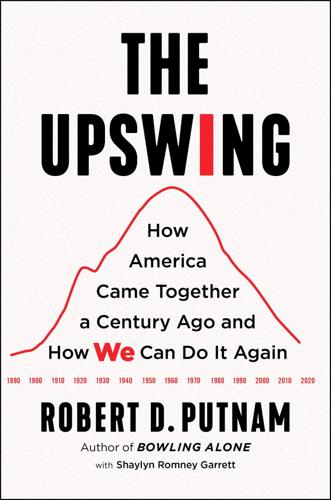
The Upswing: How America Came Together a Century Ago and How We Can Do It Again
by
Robert D. Putnam
Published 12 Oct 2020
And despite having entered the workforce in remarkably large numbers, women still shoulder a far greater share of housework and childcare responsibilities than men.36 Some observers emphasize this imbalance, the limits it places upon women’s ability to work long hours, and the frequency with which women must take breaks from work and career to care for children or elders as major reasons for the stubborn continuation of the pay gap.37 Some pay disparity is also clearly due to discrimination, as women are denied advancement or raises. Women today are about twice as likely to report experiencing such discrimination in the workplace as men, 38 and economists often note a certain percentage of the gender pay gap that is “unexplained” by all other factors. But by far the biggest reason for the narrowing but still significant gender pay gap has been the persistent reality of occupational segregation. Occupational segregation is tracked using a measure called the Index of Dissimilarity, which calculates how equally distributed between men and women is employment in a given job category.
…
Gender Segregation in the Labor Market and the Gender Wage Gap,” September 2010, https://iwpr.org/wp-content/uploads/wpallimport/files/iwpr-export/publications/C377.pdf. 36 Julie Brines, “Economic Dependency, Gender, and the Division of Labor at Home,” American Journal of Sociology 100, no. 3 (1994): 652–88, doi:10.1086/230577. 37 Claudia Goldin et al., “The Expanding Gender Earnings Gap: Evidence from the LEHD-2000 Census,” American Economic Review 107, no. 5 (2017): 110–14, doi:10.1257/aer.p20171065; Erling Barth and Claudia Olivetti, The Dynamics of Gender Earnings Differentials: Evidence from Establishment Data, vol. 23381 (Cambridge: National Bureau of Economic Research, 2017). 38 Nikki Graf, Anna Brown, and Eileen Patten, “The Narrowing, but Persistent, Gender Gap in Pay” (Pew Research Center, March 22, 2019), https://www.pewresearch.org/fact-tank/2019/03/22/gender-pay-gap-facts/. 39 Francine D. Blau, Peter Brummund, and Albert Liu, “Trends in Occupational Segregation by Gender 1970–2009: Adjusting for the Impact of Changes in the Occupational Coding System,” Demography 50, no. 2 (April 2013): 471–92, doi:10.1007/s13524-012-0151-7. Sources for Figure 7.8: Matthew Sobek, Historical Statistics of the United States, Earliest Times to the Present: Millennial Edition, Table Ba4207-4213; US Census (1950–2000; Steven Ruggles, Katie Genadek, Ronald Goeken, Josiah Grover, and Matthew Sobek, Integrated Public Use Microdata Series: Version 7.0 [dataset] (Minneapolis: University of Minnesota, 2017); American Community Survey (2001–2016); Ruggles et al. (2017) as calculated by Kim A.
…
Siegel, Directions in Sexual Harassment Law (New Haven: Yale University Press, 2004), 8–11. 54 Ariane Hegewisch and Emma Williams-Baron, “The Gender Wage Gap by Occupation 2016; and by Race and Ethnicity” (Institute for Women’s Policy Research, April 4, 2017), https://iwpr.org/publications/gender-wage-gap-occupation-2016-race-ethnicity/. 55 See Ruth Milkman, On Gender, Labor, and Inequality (Chicago: University of Illinois Press, 2016). 56 Katz, Stern, and Fader, “Women and the Paradox of Economic Inequality in the Twentieth-Century.” For a discussion of the ways in which greater flexibility in work schedules could result in finally closing the gender pay gap, see Goldin, “A Grand Gender Convergence: Its Last Chapter.” See also Francine D. Blau and Lawrence M. Kahn, “The Gender Wage Gap: Extent, Trends, and Explanations,” Working Paper 21913 (National Bureau of Economic Research, January 2016), doi:10.3386/w21913; and Youngjoo Cha and Kim A. Weeden, “Overwork and the Slow Convergence in the Gender Gap in Wages,” American Sociological Review 79, no. 3 (June 2014): 457–84, doi:10.1177/0003122414528936. 57 Sources for Figure 7.9: 1920–1936: J.
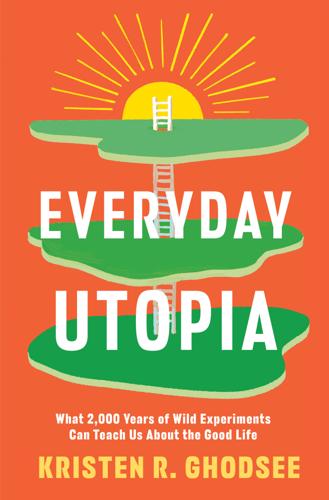
Everyday Utopia: What 2,000 Years of Wild Experiments Can Teach Us About the Good Life
by
Kristen R. Ghodsee
Published 16 May 2023
In contrast to men who prioritize their professional ambitions, the study noted that: “Women in academic couples report that their partner’s employment status and opportunities are important to their own career decisions,” with the number one reason women academics gave for refusing an external offer of employment being that their male partners “were not offered appropriate employment at the new location.”33 The availability of a job for their partners outweighed other key considerations such as salary, benefits, research funds, or opportunities for promotion. And since getting a decent raise in academia usually requires moving to a new university, women’s relative immobility exacerbates the gender pay gap. Whether it is in academia, in the military, or within the corporate world, women are more likely to follow their partners to a new city or country. When a couple needs to decide whether or not to take a job in a new place, it makes sense to invest in the career prospects of the partner with the higher salary.
…
For a comprehensive list of locations of any word or phrase, use your reading system’s search function. Page numbers in italics refer to illustrations. abortion, 94, 95, 152, 213 Abundance (Diamandis), 14 academia, academic studies, 37, 69–70 blue sky thinking and, 16 farming taught alongside, 121–22, 126–27 gender pay gap in, 20–21 valued above manual labor, 118, 121 Acts 2, 142, 154 Acts 4, 142 adoption, 221, 222–23, 224 Agriculture Department, US, 71 Albigensians, 142, 143 alloparents, alloparenting, 30, 181, 221, 222, 229 among nonhuman primates, 182–83 nuclear-family households as deterrent to, 185, 218, 226–27 state-funded, 213 All the Single Ladies (Traister), 197 Amazon, Indigenous tribes of, 186 Amazon (company), 67 Amazons (Greek mythology), 2, 26, 233 American Revolution, 144 Amish America website, 154 Anabaptists, 144, 153–54, 254 anarchists, anarchism, 8, 150–52 private property and, 140, 145 see also Kropotkin, Peter; Proudhon, Pierre-Joseph Anarchy, State, and Utopia (Nozick), 149 Ancient Society (Morgan), 152 Andover Theological Seminary, 80 Animal Farm (Orwell), 243–44 Anna Karenina (Tolstoy), 201 Another Community, 162 Apartment List website, 51 Apologia per Galileo (Apology for Galileo) (Campanella), 7 Appel d’une femme au peuple sur l’affranchissement de la femme (Appeal of a Woman to the People on the Enfranchisement of Women) (Démar), 208–9 Apple, Think Different slogan of, 15 Aristophanes, 11, 204 Arnold, Brother, 154–55 Arthur, Chester, 192 artificial intelligence (AI), 14 artificial life, 16 Asexual Visibility and Education Network (AVEN), 224 Association for Library Service to Children, Newbery Medal of, 244 Atarashiki-mura community, 162 Athens, ancient: monogamy in, 189, 202 Peloponnesian War defeat of, 4, 76 property owners in, 139–40 wealth inheritance in, 188–89 see also Greece, ancient BabyCenter website, 18 Babyjahr (baby year), 95 Baden-Württemberg, Campus Galli in, 36–37 banks, 57, 147–48 Bastani, Aaron, 14 Baugruppen (building groups), 56–57, 62 Bebel, August, 91, 210, 211, 246 nuclear family rejected by, 211–12 as proponent of gay rights, 211, 216 Social Democratic Party founded by, 210 women as viewed by, 210–11 Becker, Gary S., 188 Beguines, beguinages, 32, 38–39 castigated as heretics, 39, 254 modern, 57 women’s autonomy in, 38 Belgrade, University of, 47 Benedictine monasteries, 35, 36 Benedict of Nursia, Saint, 35 Berlin, cohousing projects in, 56 Berlin Senate Department for Urban Development, 57 Bernard, George W., 36 Bernard, Zoë, 50 Bertelsmann Foundation, 73 besprizornye, bezprizorniki (unattended ones), 114–15 Betzig, Laura, 190 Bezos, Jeff, 67 Bible, 143 see also New Testament; Old Testament Bible communism, 141–42, 153–57, 166 bihon lifestyle, 216 birth control, 152, 186, 215 birth rates, decline of, 75, 152, 216, 236 BirthStrike, BirthStrikers, 25, 257 Bjerre, Britta, 54–55 Blair, Eric (George Orwell), 243–44 Bloch, Ernst, 238 militant optimism and, 234–35, 240 Blount, Elizabeth, 190 blue sky thinking, 15–17, 24, 108, 239 see also dreamers, dreaming; hope, hopefulness; imagination bofællesskab (Danish communal housing projects), 53–57 Bogdanov, Alexander, 9 Bogomils, Bogomil sect, 142–44, 253 celibacy practiced by, 142, 205, 258 women’s equality in, 142, 154 Bolsheviks, 46, 93–94, 179 Boo, Katherine, 177–78 Book of the City of Ladies, The (Pizan), 38 Boomers, home ownership among, 51 Bowles, Samuel, 105 Boyd, Hal, 178 Boyd, Robert, 195 Boym, Svetlana, 47 Braff, Danielle, 220 Brancolini, Fabio, 129 Braun, Lily, 91–92 Brave New World (Huxley), 241–44, 245, 250 Bregman, Rutger, 14, 260 British Palestine, kibbutzim in, 86 Brooks, David, 177–78 Bruderhof colonies, 156–57 Brunswick, Maine, Two Echo Cohousing in, 52–53, 53 Bucur, Maria, 216 Buddha, 35, 167 Buddhists, Buddhism, 35, 141, 162 celibacy practiced by, 204, 258 Bulgaria: public education in, 118–19 “Unity in Diversity” project in, 130 see also Bogomils, Bogomil sect Bulgarian Women’s Committee, 96 Bureau of Labor Statistics, US, 106 Burkart, Judith M., 180–81 Burkina Faso, polygamy in, 187 California, three-parent adoption in, 224 California, University of: at Davis, 180 at Santa Cruz, 29, 200 Callenbach, Ernest, 9, 12 Cambridge University Center for Climate Repair, 16 Campanella, Tommaso, 6–7, 7, 112–13, 130, 132 Campus Galli, 36–37 Canada: Hutterite communities in, 154 patrilineal naming conventions imposed on Indigenous peoples in, 19–20 Canadian Cohousing Network, 66 Canterbury College, 37 capitalist realism, 240 capitalists, capitalism, 167, 214, 246 condition of women’s lives under, 10 early industrial, 8–10 hereditary transfer of wealth in, 29–30, 33–34, 144–49, 168, 188–90, 207–8 nuclear family structure and, 247–49 private property and, 145 public schools and, 105–8 wealth accumulation as prime concern of, 141, 145–46, 167 Carolingian monasteries, 36–37 Çatalhöyük, 32–33, 34 Cathars: Catholic Church and, 143, 253–54, 258 celibacy practiced by, 205, 253–54 women considered equals by, 142–44, 154 Catherine of Aragon, 190 Catholic Inquisition, 13 Catholics, Catholic Church, 4, 37 Albigensian Crusade of, 143 Beguines castigated as heretics by, 39, 254 Cathars despised by, 143, 253–54, 258 celibacy practiced by priests and nuns in, 205, 258 divorce prohibited by, 190 godparents and, 222 Hutterites persecuted by, 154 monogamy enforced by, 190, 218 tithes collected by, 143 vast land holdings of, 143 celibates, celibacy, 205, 219 of Bogomils, 142, 205 of Cathars, 205, 253–54 as challenge to monogamy, 204–5 in monastic communities, 32, 35, 205 of Shakers, 154–55, 205 cenobites, cenobitic monasticism, 35–36, 38–39, 141 celibacy practiced by, 32, 35, 205 property held in common by, 35, 141 Centers for Disease Control, 74, 176 “Century of Women,” 216 Ceresco (Wisconsin Phalanx), 42 Chana, Ziona, thirty-nine wives and ninety-four children of, 187 Chernyshevsky, Nikolai, 8 childcare, 21, 262 as commodity vs. public good, 100 nonparental, 74 state-supported, 10, 72–73, 92–95, 96–101 universal, 75, 79, 99, 237 worldwide disparity in access to, 96 childcare, communal, 43, 75, 76, 80, 101, 163, 178, 228 benefit to mothers of, 21, 88, 91, 98 benefit to parents of, 10, 21, 75–76, 90 developmental benefit to children of, 86, 90–91, 97–99, 237 on kibbutzim, 87–88, 89–90 childcare, in nuclear families, 73–74, 100, 256 Covid-19 pandemic and, 218, 257 by unpaid mothers, 10, 20–21, 25, 31, 56, 59, 68, 73, 77, 94, 128, 160 child labor, 79 child-rearing, 14, 25, 177–78, 180, 217–18 alloparenting in, see alloparents, alloparenting disparity in access to, 96 multi-parenting in, 223–26 platonic parenting in, 223 as public service, 76 public support for, 10, 72 women’s careers in conflict with, 21, 70–75 child-rearing, collective, 17, 24, 221, 237, 258 alloparenting in, see alloparents, alloparenting children’s long-term development benefited by, 90–91, 97–99 in cohousing, 52–53, 60 as essential for women’s incorporation in the labor force, 91 in Godin’s Familistery, 43 in kibbutzim, 86–91 Kollontai’s vision for, 92–95 Marx and Engels on, 79–80 in Oneida community, 81–85, 95 state-supported, 93–95 child-rearing, in nuclear families: diminishing multigenerational support in, 74, 177 financial cost of, 71–76 by unpaid mothers, 10, 20–21, 25, 31, 56, 59, 73–74, 78, 94 children: carbon footprint of, 228 collective rearing as beneficial to, 86, 90–91, 97–99, 237 with DNA of three parents, 223 early developmental needs of, 74 early immunity as beneficial to, 98 fathers’ surnames taken by, 18 as historically owned and controlled by men, 22, 137, 249 in polyamorous families, 224–25 as public goods, 76 “Children Should Have One Hundred Parents” (Graae), 54 chimpanzees, 180, 182–83 China, 49, 162 alloparental relationships in, 222 polygyny outlawed in, 190 Chomsky, Noam, 250 Christians, Christianity, 167 “Bible communism” and, 141–42, 153–57 communal sects of, 35–36, 153–57 godparents and, 222 monastic tradition in, see monastics, monasticism nuclear family and, 218–19 “Perfectionism” doctrine of, 80, 87 Churchill, Winston, 86 Church of England, 190 Church of Jesus Christ of Latter-day Saints (Mormons), plural marriage practiced among, 191–92 Cigna US Loneliness Index, 31 Cistercians, 35 Cities of Ladies (Simons), 38 Città del Sole, La (The City of the Sun) (Campanella), 6, 112–13 civil rights movement, US, 9 Cleveland, Grover, 192–93 climate crisis, 13, 127, 257 Coalition for Radical Life Extension, 16 cohousing, 52–57, 59, 65–66, 250–51 all-female, 57–58 architecture and design of, 59–60 children raised in, 52–53, 60; see also child-rearing, collective conflict resolution in, 64 conflicts in, 63–67 division of housework in, 59–60, 167 economic advantages of, 59, 61–62, 67 environmental benefits of, 62, 67, 167 loneliness and isolation mitigated in, 63, 67 for seniors, 57–58, 71 Cohousing Association of America (CohoUS), 66 Cold War, 3, 9, 86, 123, 231 Coldwell, Will, 50 Colgate University, 47 co-living, 49–52, 250–51 colleges and universities: communal living at, 29, 66 as historically male spaces, 38 Colombia: civil war in, 58 matriarchal ecovillage in, 57–58 Common (company), 50 communal living, 17, 25, 136 co-living, 49–52, 250–51 on college campuses, 29 economic advantages of, 31, 59, 61–62, 67 environmental advantages of, 31, 32 shared responsibilities in, 32 social connections in, 31 see also cohousing; kibbutzniks, kibbutzim “commune,” as pejorative term, 161 #communelife, 251 communism, communists, 8, 145, 150–51 anarchism vs., 151–52 1898 collapse of, 235 “Communist Confession of Faith” (Engels), 79 Communist Manifesto, The (Marx and Engels), 79–80, 107, 167, 209, 245–46 communities, 14, 17, 32, 37, 74 agricultural, 153 intentional, see intentional communities Community Playthings, 157 compadres (co-parents), 222 compersion, 221 Condition of the Working Class in England, The (Engels), 79 Congress, US, 123, 158–59, 192 Conly, Sarah, 77 Connelly, Rachel, 99 Conquest of Bread, The (Kropotkin), 9 Constitution, US, 2 contraception, 152, 186, 215 convents, 32, 38–39 Cooper, Davina, 237, 240–41 cooperation, 24, 68, 100, 105, 112, 114, 126–27, 202, 207 competition valued above, 121–22, 126 in conflict resolution, 64 as innate human tendency, 9 as learned trait, 65 Copenhagen, University of, Royal Academy of Art and Architecture at, 58 Copernicus, 6 Corinthians, First Epistle to, 205 corporations, blue sky thinking and, 15–16 Council of Vienne (1311), 39 COVID-19 pandemic, 13, 67, 128, 155 homeownership and, 51 isolation and loneliness exacerbated by, 31, 218 parents of young children and, 257 rise of domestic violence during, 175–76, 195 Cowden, Jonathan, 194 crime: income inequality and, 196 violent, 175–76, 195–96 see also domestic violence Cristina (Ghodsee’s grandmother), 171–72, 173, 175, 225 Cutas, Daniela, 223–24, 225 Cybele (fertility goddess), 204 Dakota people, 191 Dalai Lama, 141 Davis, Wade, 15 Dawn of Everything, The (Graeber and Wengrow), 235 Dead Sea Scrolls, 141 debt, financial, 30–31, 106–7, 129, 147–48, 256 Defense Department, US, “death gratuity” of, 76 De Leon, Daniel, 212, 215, 246 Démar, Claire, 208–9 Denmark, cohousing in, 53–54, 60 De revolutionibus orbium coelestium libri vi (Six Books Concerning the Revolutions of the Heavenly Orbs) (Copernicus), 6 Diamandis, Peter, 14 “Dictatorships & Double Standards” (Kirkpatrick), 247–48 Dishotsky, Jon, 50 Dispossessed, The (Le Guin), 9 divine right of kings, 7, 144 divorce, 160, 215, 222–23, 236, 250, 262 in ancient Athens, 188–89 no-fault, 24 in France, 18, 208–9 prohibited in Bible, 190 in Soviet Union, 94–95, 213, 215 domestic relations, see private lives, private sphere domestic violence, 173–76, 195 hidden in single-family homes, 176 rise in, during pandemic, 175–76, 195 US levels of, 176 Dominican order, 35–36 domus (nuclear family), 34 dreamers, dreaming, 11–12, 26, 255, 262 see also blue sky thinking; imagination Duolingo, 129 Durango, Colo., cohousing in, 60 Durrett, Charles, 58 dwelling, see communal living; homes, single-family; housing Dyson, Freeman, 23 dystopia, dystopian fiction, 124–25, 231 capitalist realism mindset in, 240 change as portrayed in, 245–47, 249–54 destruction of traditional family as portrayed in, 241–45 fear deployed in, 26, 240–47, 250, 260–61 taught to children, 244–45, 262 in US high school curricula, 241, 243, 262 as warning against totalitarianism, 243 Dzerzhinsky Commune, 117 Eastern Europe: collapse of socialism in, 64, 196 state-funded childcare in, 95–96 East Germany: state-supported childcare in, 99–100 state-supported maternity leave in, 95–96 economic inequality, 179, 188, 195 homicide rates and, 196 nuclear family and, 196–97 Ecotopia (Callenbach), 9, 12 Ecovilla Gaia, 160 ecovillages 57–58, 160–61, 163, 168, 221, 252, 254, 259 ectogenesis, 25 Edinburgh, University of, 120 Edmunds Anti-Polygamy Act (US; 1882), 192, 193 education: adult, 129–33, 259 higher, see higher education public, see public education Education for Self-Reliance (Nyerere), 121 Education with Production (EWP), 122 edX courses, 129 Einstein, Albert, 27–28, 109 elder care, public support for, 10 Emile (Rousseau), 108 Encyclopaedia Britannica, 149 Enfantin, Barthélemy Prosper, 207–8, 209, 254 Engels, Friedrich, 78–80, 91, 151, 209, 212, 245–46, 251, 253 as advocate for universal child-care and education, 79, 85 as advocate for women’s rights, 152–53 Familistery criticized by, 45 Fourier’s influence on, 40, 251 England: same-sex marriage in, 216 see also United Kingdom Enquiry Concerning Political Justice and Its Influence on Morals and Happiness (Godwin), 146, 206–7 environmental utopias, 9 Epistle of James, 35 Equal Rights Amendment, 2 Essenes, 141, 253 Europe, see Eastern Europe; Western Europe Expatriation Act (US; 1907), 19 Fair Housing Act, US, 65 Families First Coronavirus Response Act (US; 2020), 220 Familistery, 42–46, 45, 47, 253 family, non-traditional, 14 blended, 222 chosen, 218–23 polyamorous, 224–25 redefining and expanding of, 25, 180, 226–29 family, nuclear, 54, 169, 175–80, 197–98, 219, 226, 246 as adapted to protect the wealthy, 196–97, 249 capitalist defenders of, 247–49 dystopian fears of destruction of, 241–45 governments’ vested interest in upholding, 255–56 monogamy in, 219, 255 myth of inevitability of, 186, 236 parenting in, see childcare, in nuclear families; child-rearing, in nuclear families persistent ideal of, 177–78, 193, 201–2, 217, 236 see also homes, single-family; marriage, traditional; monogamy, monogamous societies family abolitionism, 217 famulus (servant or slave), 34 fear: of being alone and unloved, 240–41 of change, 15, 236–37, 250, 260 dystopian, 26, 240–47, 250, 260–61 of failure, 239 hope vs., 240 of non-monogamy, 194 of violence, 201 weaponized to benefit status quo, 16–17, 241 fearmongering, 250, 260 by organized religious denominations, 247 FedCon Star Trek convention, 234 Federal Employees Family Friendly Leave Act (US; 1994), 220 femininity, stereotypes about, 25 feminism, word coined by Fourier, 40 feminists, cohousing promoted by, 54, 67 Fern, Jessica, 178 fertility rates, decline in, 73, 227 Festival Filosofia (Festival of Philosophy), 129–30, 130 feudalism, 7 financial crisis (2008), 51, 162 Finkel, Eli, 25 Firestone, Shulamith, 217, 241 First Amendment, 192 1st Indigenous Ecovillage, 160 Fisher, Mark, 240, 246 FitzRoy, Henry, 190 501(d) organizations, 158–60 Folbre, Nancy, 76 Fortunato, Laura, 189 Foundation for Intentional Community, 66 Fourier, Charles, 14, 24, 253 Engels and Marx influenced by, 40, 251 passionate attraction theory of, 8 secular phalanstery envisioned by, 40–42, 41 France, 188 Albigensians in 142, 143 Cathars in, see Cathars divorce outlawed in, 208 state-supported childcare in, 97, 100 utopian socialists in, 10 Franciscans, 35–36 freecycling, 164, 168 free-market societies, 150, 247 see also capitalists, capitalism free rider problem, 11 free stores, 168 French Civil Code, 208 French Revolution, 7–8, 40, 144–45, 146, 208 Friedman, Milton, 106–7 Fully Automated Luxury Communism (Bastani), 14 future, 12, 76, 132–33, 234–38, 258 commitment to, 26 dystopian visions of, see dystopia, dystopian fiction fear and, 152, 241, 260 hope and, 238–39, 260 imagining, 14, 253, 260 militant optimism and, 26, 234–38, 240, 258, 262 positive vision of, 27–28, 233, 260 as unknowable and uncertain, 250, 256 utopian visions of, see utopia, utopian ideas Galeano, Eduardo, 238 Galileo Galilei, 6–7 Gandhi, Mohandas K.
…
Bradford, 178 Wilkinson, Richard, 196 Wisconsin Phalanx (Ceresco), 42 Woman Under Socialism (Bebel), 211–12, 246 women: adverse affects of private property on, 152–53 in ancient Greece, 110, 203–4 Bebel’s views on, 210–11 in beguinages, 37–38, 39 in Bruderhof community, 157 children vs. career as conflict for, 21, 70–75; see also childcare; child-rearing domestic violence against, see domestic violence economic independence of, 197, 216 gender pay gap and, 20–21, 73, 215 as historically subjugated by men, 8, 11, 18–19, 22, 38, 44, 137, 145, 185, 197, 207, 209–10, 212–13, 216, 249 husbands’ surnames taken by, 18, 19 Industrial-era working-class, 78–80, 91–95, 211 Kollontai’s advocacy for, 212–15 life expectancy of men vs., 57, 61 More’s vision for, 5, 111, 206 in Mosuo community, 22 Plato’s vision for, 5, 77–78, 110, 122, 202–3 in polygynous societies, 194–95 pressured by governments to have children, 152, 217 in Saint-Simonian community, 208–9, 250 in Shaker communities, 154 socialist policies and, 10, 47–49, 91–96 as unpaid caregivers, 10, 20–21, 25, 31, 56, 59, 73–74, 78, 94 utopian visions for, 8, 9, 17, 40, 77, 110, 145 viewed as equal by Bogomils, 142 viewed as equals by Cathars, 142–44 women’s rights, in US, 216 women’s suffrage, in US, 19 Wonder Woman (char.), 1, 2, 9, 26, 27, 232 Worden, Harriet, 83 “Working Woman and Mother” (Kollontai), 92–93 World Bank, 96 World Habitat Awards, 58 XPRIZE, 14 Yale Divinity School, 80 Yale University, 127 Yoga Sutras, 141 Young, Brigham, fifty-plus wives of, 187 “Young Children Develop in an Environment of Relationships” paper, 74 Zachrisson, Henrik, 98 Zetkin, Clara, 24, 91–92 Zinn, Howard, 258–59, 262 Žižek, Slavoj, 250 List of Figures Figure 1.1.

Billionaire, Nerd, Savior, King: Bill Gates and His Quest to Shape Our World
by
Anupreeta Das
Published 12 Aug 2024
In 2018, some of the biggest Wall Street banks agreed to publicly share the progress they had made to close the gender pay gap, largely due to the efforts of Lamb. But her firm would get stonewalled just as often. Also that year, it had filed a shareholder proposal to get Comcast to conduct an independent board investigation into allegations of workplace sexual harassment, but the company had refused, and other shareholders had not sided with the firm. Arjuna had also teamed up with Time’s Up in 2019 to push Microsoft for a fuller disclosure of racial and gender pay gap disparities, but the not-for-profit, which focuses on creating a safer and more equitable workplace for women, secured a grant from Pivotal Ventures, the firm run by French Gates, around the same time and dropped out of the campaign.
…
As social issues began to drive consumer decisions, forcing corporate America to brush up on the language of diversity and inclusion, and burnish their earth-friendly credentials, big investors were suddenly paying attention. Investing with an eye to ESG was becoming popular, and Lamb found herself becoming an “influencer.” The overwhelming support from shareholders for her proposal forced Microsoft to agree to an independent investigation, and to do more to reduce racial and gender pay gaps. The law firm that conducted the investigation recommended that Microsoft strengthen its sexual harassment and gender discrimination policies. Microsoft said it would strengthen its policies, including making executives undergo training and promoting more women to senior roles. “What galvanized the support from investors was that there was this a-ha moment, not only about Epstein but also Gates’s employee relationships and whether there was more, and questions around how the board addressed these allegations and whether his departure was on a voluntary basis,” Lamb reflected.

Posh Boys: How English Public Schools Ruin Britain
by
Robert Verkaik
Published 14 Apr 2018
To illustrate the point Spence refers to an incident involving alt-right polemicist and former Breitbart News editor Milo Yiannopoulos, who he describes as ‘a YouTube phenomenon who has built his reputation on deeply misogynistic views’. Spence recalls: ‘[He] was asked by the boys running the Economics Society to give a talk here on the myth of the gender pay gap. For the first time in my career as headmaster I said, “He’s not coming.” I thought his presence would be incendiary and not help sensible debate at a time when we had just created an equality society [looking seriously and sensitively at questions of gender and at gender politics] – the boys understood my decision.’
…
Goodall wrote: ‘If we actually talked or even cared about this peculiar taboo, we might begin to see one of the reasons the gender and race pay gaps exist in the first place. Just think about that. If you send your child to private school it increases their chances of being one of the biggest names in TV and media by a factor of six.’ He added: ‘The gender pay gap may be too large but it’s not nearly as big as the class pay gap for the people who never made it in the first place because of their background. The injustice is pretty overwhelming: after all, are we really saying that those who are lucky enough to be born into households which can afford to pay for private school fees are six times more talented?
…
INDEX Abbott, Diane 181 Abromovich, Roman 197 abuse 207–20, 254 Adams’ Grammar School 172–3, 184 Addrison, John 210 Adonis, Andrew 240–1, 333 Africa 53–4, 314–15 Ahmad, Muhammad 37, 38–9 Aitken, Jonathan 255 Aldridge, Sir Rod 318 Alexander, Danny 148 Alfred the Great, King 14 Allan, Tim 169 Alpha Plus 316–18 Ametistova, Ekaterina 200–1 Ampleforth College 219, 237, 250–1 Anderson, Bruce 146 Andersdon, Dr Eric 105, 106, 115, 137 Anne, HRH Princess 110 Anthony, Vivian 108–9 Apostles Club 306 aristocracy 18, 22, 28 Arkwright, Richard 32 Arnold, Matthew 66 Arnold, Thomas 31, 67 Aspinall, John 156 Asquith, Herbert 64 al-Assad, Bashar 128, 196, 202 Attlee, Clement 87, 88, 89, 99, 180 Augustine, St 13–14 Australia 283 Baddiel, David 263–5 Bailey, Mark 227 Balfour, Arthur 33 Ball, Peter 216–19 banking 295–9 Banks, Arron 163, 164, 165 Bannon, Steve 164, 282 Barrington, Robert 202 Barton, Laura 305 Barttelot, Sir Brian 38, 40–1 Barttelot, Maj Edmund Musgrave 38–40 Barttelot, Sir Walter 40–1, 60–1 Bash camps 212–13, 216 BBC 298–300 beatings 21, 30, 211, 213–14, 215 Beckett, Andy 304–5 Bedales 182–3 Beefsteak Club 291–2 Bellak, Benjamin 138 Benn, Melissa 255, 268, 323–4, 339 Benn, Tony 96–7, 174, 175, 176, 180, 255–6 Bennett, Alan 1, 336–7 Bentham, Jeremy 66 Berezovsky, Boris 199 Beveridge, William 89 Blackadder Goes Forth (TV show) 62 Blair, Tony 103–6, 107, 109, 111, 179, 180–1 Blunkett, David 106–8, 109, 111 Blunt, Anthony 133 Bo Xilai 198 Board of Education 68–9, 69 ‘Boarding School Syndrome’ 270–1 Boarding Schools Corporation 98 Boer War 40, 52–4 Bonar Law, Andrew 64 Borwick, Tom 165 Bracken, Brendan 85–6 Brexit 127, 151, 161–3, 164–70; see also Farage, Nigel Bridgeman, Luke 292–3 British Army 36, 40–2, 55–64, 72–3, 224, 225 British Empire 30, 32, 33–5, 36–7, 38–40, 42–3, 44–5 and Second World War 74–5 British Expeditionary Force (BEF) 52 Brodie, Stanley 116 Brooke, Rupert 62 Brook’s 291 Brooks, Charlie 147 Brougham, Henry 29 Brown, Gordon 107, 287 Bruce, Charles 136 Brunel, Isambard Kingdom 32 Bryant, Chris 128 Buchanan, Mike 119 Buffet, Warren 329 Bullingdon Club 137, 141–2, 306 bullying 271, 273 Burgess, Guy 133 bursaries 226–35, 321–2, 332 Butler, Rab 77, 78–9, 81, 82 Butler, Robin, Lord 193 Byers, Stephen 107–8 Cable, Vince 167 Caldicott prep school 209–10, 215, 219 Callaghan, James 99, 180 Cambridge Analytica (CA) 164–6 Cambridge, HRH Catherine, Duchess of 191 Cambridge Spy Ring 133 Cambridge University 1, 25 Cameron, David 6, 105, 133–8, 139, 140, 274 and ‘big society’ 313, 315 and Conservative Party 143, 144–8 and Eton 119, 190 and EU Referendum 127, 161, 162, 166–7, 169, 170 and government 148–54 and Oxford 141–2, 143 and psychology 271, 273 and Russia 132 camps 212–16 Canning, George 33 Card, Tim 61 Cardigan, James Brudenell, 7th Earl of 56 Carey, George, Lord 217 Carpenter, John 17 Carswell, Douglas 161 Cash, Bill 161 Castle House Preparatory School 172 Catling, Susan 95, 96 Chakrabarti, Shami 181–3 Chamberlain, Neville 72 chantry schools 15, 24, 26 Charitable Uses Act (1601) 109 Charities Act (2006) 114–16, 223 charity 17, 47, 88–9, 114–21, 341 and law 109–10, 111 Charles, HRH Prince of Wales 105, 110, 143, 216, 217, 283 Charterhouse School 19–20, 195–6, 233, 257 China 197–8, 200, 203, 204 Christianity 13–14, 15, 24, 215–16 and muscular 35–8, 44, 67, 211 church, the 2, 13–15, 24, 211–19 Churchill, Winston 40, 72, 74, 78, 84, 286 and Bracken 86 and Eden 91 and Harrow 33, 77, 82–3 City, the 4, 292–3, 295–7 City of London School 17, 181 Clarendon, George Villiers, 4th Earl of 48, 49–51 Clark, Alan 62 Clark, Ross 194 Clarke, Kenneth 146, 147 class 22, 65–6, 86–7, 95, 237–8, 315–16 and the army 55–6 and government 91–3 and grammar schools 67–8 and the media 298–300 classics 30–1 Clegg, Nick 147–8, 181, 209–10, 327–8 Clifford, Adm Sir Augustus 34 Clive, Robert 42–3 Comenius, John 27 comprehensive schools 94–5, 255–6 Conrad, Joseph 39–40 conscription 52–3 Conservative Party 69, 86, 90, 92, 99–100, 101–2 and Cameron 143, 144–8 Cook, Henry 169 Cooke, Alistair 143 Coombs, Mark 163 Corbet, Richard 23 Corbyn, Ben 178 Corbyn, Jeremy 17, 121, 171–5, 176–80, 186, 314 Corbyn, Sebastian 178 corporal punishment 21 Cranmer, Thomas 11–12, 14 Crawford, David Lindsay, 27th Earl of 59–60 Crimean War 56 Cromwell, Oliver 27 Crosland, Anthony 95–6, 97, 255 Cruz, Ted 164 Cumberbatch, Benedict 252 Cummings, Dominic 165–6 Cust, Sir Lionel Henry 222 Czerin, Peter 144 Dacre, Paul 147 Daffarn, Edward 318 Dalton, Hugh 180 Damasio, Antonio 276 D’Ancona, Matthew 144 Darwin, Charles 30–1 Davidson, Jim 261–3, 266–7 Davison, Dick 108 De Carvalho, Alexander 168–9 De Freitas, Geoffrey 89 Deakin, Chloe 157, 158 Dean, Victoria 169 Debrett’s 289 Derham, Patrick 120 Dimbleby, David 149, 251 Disraeli, Benjamin 42 Doggart, Simon 215 donations 228–9 Dorries, Nadine 250–1 Dowding, Hugh 83 Duff, Grant 47–9, 50 Duffell, Nick 271, 272–3, 276–7, 284 Dulwich College 90, 156–61, 181–2, 192, 248, 330–1 and overseas franchises 203, 204 and sponsorships 239–42 Duncan, Alan 167 Eden, Anthony 64, 90–2 Edinburgh Academy 47 Edmiston, Robert, Lord 163 education 11–12, 13–15, 27, 321–4, 327–9 and Ragged Schools 37 and reforms 65–6 and rights 337–8 and Scotland 43–4 see also grammar schools; public schools; state schools Education Acts: 1902: 69 1918: 65 1944: 82, 87, 93 Education Review Group 117 Edward III, King 16 Edward IV, King 26 11-plus exam 82, 93 Elizabeth I, Queen 18, 19 Elizabeth II, Queen 133 Elliott, Matthew 165 Emms, David 157 employment 341–3 End of the ‘Old School Tie’, The (Worsley) 75–6 Endowed Schools Commission 50 English Civil War 27 entry requirements 18–19 Establishment, the 125–6 Eton College 3, 17, 19, 22, 204, 278–9 and admission 189–90 and alumni 33, 140–1 and bursaries 228–9, 230 and Cameron 119, 136–8, 140 and charity 99, 115, 221–3, 235–6 and Eden 91, 92 and exams 257 and fees 113, 188–9, 227 and foundation boys 50 and Goldsmith 155 and government 134 and grants 238 and international students 198–9 and Leggatt 293 and masters 46–7 and Oxbridge 25, 301 and poor boys 28–9 and Putin 127–32 and reforms 26–7 and Rifles 52, 53, 59 and sponsorships 242 and sport 35 and town 187–8 and Wellington 33, 41–2 see also Old Etonians EU Referendum 127, 150–1, 161–3, 164–70 Evans, Chris 298–9 exams 82, 93, 257, 267–8 Fabian Society 180 fagging 22, 29, 98, 104 faith schools 180–1 Fallon, Michael 62 Faraday, Michael 32 Farage, Nigel 156–9, 160–1, 162, 163, 167, 169, 248 and the establishment 283 and psychology 273 and Trump 282 Farr, Clarissa 278 Farron, Tim 153 fascism 157, 158 federations 238 fees 13, 19, 67, 69, 111–13, 194 and Eton 188–9 and subsidies 221–2, 224–35, 245–9 and university 260–1 Fettes College 103–6, 211 Finkelstein, Daniel 146 Finland 268, 344 First World War 54–64, 65–6 Fisher, Herbert 68–9 Fleming, David Pinkerton, Lord 79–81, 90 Fletcher, David 200, 201 Fletcher, Frank 68, 69 Foot, Michael 106, 180 Fox, Edward 156 Fox, Laurence 252–3 France 268–9 Fraser, Giles 211, 216 free scholars 16, 17, 18, 23, 50–1 Freemasons 193 French, John 61 French Revolution 28 Freud, Matthew 147 Gaitskell, Hugh 180 Galsworthy, John 66–7 Gascoigne, Michael 104 Gates, Bill 329 Geelong Grammar School 283 GEMS Education 111, 113–14, 204–6 gender pay gap 298, 299 gentlemen’s clubs 143–4, 169, 291–2 Germany 196, 268–9, 344 Ghosh, Helen 149 Gibb, Dame Moira 217, 218 Gill, Ameet 168 Girls’ Public Days School Trust 68 girls’ schools 229 Girls’ Schools Association 108 Gladstone, William 33, 37, 48 Goldsmith, James 155–6 Goodall, Lewis 298–9 Goodhart, David 320–1 Gordon, Gen Charles 36–8, 53 Gordonstoun 110, 211 Goschen, Giles, Viscount 135–6 Gove, Michael 144, 149, 161, 282, 322 and Brexit 166, 168 and psychology 273 and sponsorships 238 and subsidies 247–9 government 4–5, 6, 148–54 Gracie, Carrie 298 grammar schools 14, 15, 24, 30, 44, 56–7 and grants 93–4, 100–1 and Labour 183–5 and reforms 49–50, 67–8 Granville, Granville George Leveson-Gower, 2nd Earl of 48 Gray, Herbert Branston 45 Grayling, Chris 161 Great Depression 69–70 Green, Francis 307 Green, Michael 145 Greenwood, David 208, 219 Gregory, Pope 13 Grenfell Tower 316, 317–19 Greville, Fulke 22 Guppy, Darius 289–90 Guru-Murthy, Krishnan 234–5 Haberdashers’ Aske’s 263–5, 300 Haig, Gen Douglas 61 Haileybury College 88, 89 Haldane, Richard Burdon 53 Halfon, Robert 249, 311, 333, 336 Halls, Andrew 194 Hammond, Richard 67 Hancock, Matt 342 Hannan, Daniel 161 Hanson, David 219 Harding, David 163, 168 Hardman, Robert 144 Hargreaves, Peter 163 Harman, Harriet 181 Harrison, Rupert 144, 153, 275 Harrow School 17, 23, 24, 29, 31–2, 68 and alumni 33, 34, 252–3 and bursaries 233–4 and Churchill 83 and foundation boys 50 and overseas franchises 203 and soldiers 52, 53 Hart, Basil Liddel 62 Hasan, Mehdi 327 Hastings, Max 277 Hastings, Warren 43 Haynes, Tim 227 Headmasters’ and Headmistresses’ Conference (HMC) 51, 119 Healey, Denis 175, 176 Heart of Darkness (Conrad) 39–40 Heath, Edward 99, 287 Heath, Lt Gen Sir Lewis ‘Piggy’ Macclesfield 74 Heatherdown 135–6 Henderson, Simon 235 Hendon County Grammar School 183–5 Henry, Hugh 210 Henry VI, King 19, 26, 221, 301 Henry VIII, King 18, 26 Henty, G.A. 53 Heseltine, Michael 145, 167 Higgins, Matthew James 46–7 Hillman, Nick 99, 100, 255, 302–3 Hilton, Steve 144, 153 Hitler, Adolf 3, 73 Hobsbawm, Eric 34 Hoey, Kate 161 Hogg, Charlotte 295–6 Hogg, Dame Mary 294 Hogg, Douglas 294–5 Hogg, Quintin 97, 294, 295 Hogg, Sarah 294–5 Holle, Arnold 196 homosexuality 35–6 Hong Chin 201 Hosking, Jeremy 163 Howard, Adam 283–4 Howard, Michael 146 Howard, Nicholas 152 Howe, Geoffrey 101–2 Howell, Steve 183–5 Hughes, Billy 90 Hughes, Thomas 35 Huhne, Chris 148 Hunt, Jeremy 271, 273 Hurtwood House 225 Hutton, Will 274 Huxley, Thomas 66 Ibori, James 201 immigration 156, 157, 162, 168, 264 imperialism 33–4, 53–4; see also British Empire Independent Inquiry into Child Abuse 210–11 Independent Schools Council (ISC) 110, 113, 116, 120, 288, 325–7 and charity 223, 224, 226 and sponsorships 238 India 42–3, 53 industrial revolution 32 inequality 306–12, 314–16, 321–4, 327–9 initiation ceremonies 21 international students 196–202 internships 341–2 Iremonger, William 91 Itoje, Maro 234 Iwerne Trust 212, 214 Jameson, James Sligo 39 Japan 73–4 Jardine, Cassandra 94–5 Johnson, Boris 6, 31, 128, 142, 150–1, 272 and Brexit 162, 166, 167, 168, 169 and bursaries 321–2 and the Establishment 125–6 and Eton 136, 190 and Guppy 289–90 and psychology 271, 273, 276–7 Johnson, Jo 149 Johnson, Stanley 292 Jones, Owen 274–5, 328 Jonson, Ben 23 journalism 274–5, 297–8 Journey’s End (Sherriff) 58 judiciary 5, 292–3 Keir Hardie, James 180 Kensington Aldridge Academy (KAA) 318–19 KGB 132, 133 King Edward’s School 68, 93–4 Kingston Grammar School 56, 57 Kinnock, Neil 180 Kipling, Rudyard 53, 64 Kitchener, Gen Herbert 54–5, 57 Korski, Daniel 168–9 Kynaston, David 328–9, 337 Labour Party 6, 69, 86–8, 99, 100–1 and Corbyn 171, 174–5, 176–80 and education 180–6, 328–9 see also New Labour Lammy, David 303–4, 343 Lamont, Norman 143, 145 Lampl, Sir Peter 116 Landale, James 150 language 20–1, 277 Lansman, Jon 175–6, 178–9 Lansman, Max 178 Latin 14, 30 Laws, David 148 Leach, Arthur 14, 27 Leach, Sir John 109–10 league tables 267–8 Leanders, Rocky 214–15 Leather, Suzi 114–15, 117 Leggatt, George 292–3 Lenon, Barnaby 226–7, 228, 233–4, 258–61, 279, 303, 325–7 Leonard, Richard 186 Leslie, Chris 179 Letwin, Oliver 148, 149, 271 Levellers 27 Lewis, Sir George 48–9 Li Wei Gao 201 Liddle, Rod 299–300 Lineker, Gary 195, 298–9 literacy 14, 15, 43 Little, Steven 231–2 Little, Tony 190, 193–4, 198, 199, 205–6, 278–9 and assisted places 226, 230, 235 and parents 256 Litvinenko, Alexander 128 Livingstone, David 43, 44 Llewellyn, Ed 144, 148, 152 Lloyd George, David 65 local education authorities (LEAs) 80–1, 89–90, 98 Lockwood, Chris 144 London 316–19, 334; see also City, the London Oratory 180–1 Loom of Youth, The (Waugh) 63, 70 Lyon, John 17 Macdonald, Ramsay 180 McDonnell, John 174–5, 178–9, 186 McGovern, Steph 298 McKenna, Alison 116 Maclean, Donald 133 Macmillan, Harold 92 McNeil, Rosamund 120 Madders, Justin 185, 311–12 Made in Chelsea (TV show) 325 Magnitsky, Sergei 128 Major, John 321 Major, Lee Elliott 305 Mallinckrodt, Edward 135 Manchester Grammar School 27–8, 68 Mandelson, Peter 88, 183 Marathon Asset Management 292–3 Marlborough College 52, 55, 79, 192, 232 Marshall, Patrick 209 Marshall, Sir Paul 167–8 Marxism 177–8 Mason, A.E.W. 53 Masonic lodges 145, 193 May, Theresa 69, 118–19, 121, 127, 129 and internships 341–2 and ‘shared society’ 313–14, 322–3 and sponsorships 243 Meacher, Michael 176 media 297–300 Mercer, Robert 163, 164 Merchant Taylors’ School 17, 21, 28, 42–3, 140, 300–1 Merivale, Charles 22–3 Middleton, Kate, see Cambridge, Duchess of Milburn, Alan 315, 336 Military Cross 59 Millar, Fiona 109, 185–6, 324 Millfield School 247–8 Milne, Seumas 17, 177–9 Milton, John 27 Mitchell, Andrew 237, 271 Momentum 175–7, 178–9 monasteries 14, 15, 18, 24, 25, 26–7 money-laundering 201–2 Montgomery, Bernard 83 Moore, Thomas 42 morality 273–4 Morrison, Herbert 88 Mosley, Oswald 143, 158, 159 Mount, Ferdinand 139, 143 Mount, Harry 328 Mulcaster, Richard 20 Mumsnet 258 Murdoch, Rupert 147, 282–3 Murray, Andrew 178–9 Murray, Charles 334 Murray, Laura 178 Nash, Eric ‘Bash’ 212–13 Nash, Paul 62 National Front 157, 158 Neile, Richard 23 Nelson, Lord Horatio 44 New Labour 105, 106–7, 111 New York Military Academy (NYMA) 280–2 Newbolt, Sir Henry 55 Newmark, Brooks 292 Newsom, Sir John 97, 246 Newsome, David 273 newspapers 46–7, 297–8 Nix, Alexander 164, 165 non-cognitive skills 276 North Foreland Lodge 110 north–south divide 310–11 Norwood, Cyril 67, 70 Notting Hill Prep 316–18 Nyachuru, Guide 215 Oakes, Alex 163, 164 Oakes, Nigel 163–4 O’Brien, James 237, 250–1 Odey, Crispin 163, 167, 193 O’Dowda, Brendan 198 Office of Fair Trading (OFT) 112, 113 Officer Training Corps (OTC) 52, 53, 55, 62 old boys’ networks 21–2, 289–91 Old Etonians (OEs) 136, 140–1, 149, 192, 224, 228–9 Oldfield, Bruce 68 oligarchs 129–30, 140, 194, 197, 199, 202 Olympic Games 36 Onyeama, Dillibe 254 Operation Winthorpe 209 Organ, Bill 111–12 Orwell, George 3, 74, 76, 77, 254 and democracy 286, 309 Osborne, George 6, 144, 146, 147, 148, 153 and Brexit 162 and politics 274–5 and psychology 273 overseas franchises 202–6, 329 Oxbridge 1–2, 5, 264–5, 279, 300–6, 342–3; see also Cambridge University; Oxford University Oxford University 2, 16, 17, 18, 25, 107 and Cameron 141–2 and Union 125–6 Pakenham, Frank 180 Palmerston, Lord 33, 48 parents 194–6, 251–6, 257–8, 261–3, 265–7 and failure 278 and rights 337–8 Parker, Peter 62–3 Parris, Matthew 306, 314–15 Pasha, Emin 39 Patel, Priti 162 Patrick, Andrew 277 Paxman, Jeremy 223–4, 273 pay 298–9, 306–7 Peasants’ Revolt 16 Peat, Sir Michael 205 Peel, Robert 33 Percival, Arthur Ernest 73–4 Perry, Tom 210 Philby, Kim 133 Piers Gaveston Club 137, 141, 142–3 Pitt the Elder, William 28 Plato 313 Pleming, Richard 195 politics 91–3, 271–3, 274–5, 303–5; see also Conservative Party; government; Labour Party poor, the 16–17, 19–20, 22, 24, 28–9 and subsidised places 221–2, 224–7 Portillo, Michael 146 Portland Communications 169 ‘posh bashing’ 252–3 Powell, Enoch 93, 156–7 Powell, Hugh 138–40 prefects 21 Price, Leolin 115–16 Priestley, J.B. 76–7 private education, see public schools Profumo, John 92 property 310 psychology 270–3, 275–7 Public School Lodges’ Council 145, 193 public schools 2–7, 66–7, 258–61, 286–9, 324–5 and abolition 336–44 and abuse 207–20 and actors 252–3 and alumni 1–2, 140 and assisted places 87–8, 90, 101, 321–2, 329–33 and beginnings 15–20 and Brexit 161–2, 163, 165–6, 167, 170 and British Empire 33–4, 41, 42–3, 44–5 and business rates 243–4 and charity 88–9, 107–11, 114–21, 221–35 and class 22–4 and criticism 46–7 and demand 70–1 and entitlement 283–5 and espionage 132–3 and Europe 268–9 and facilities 193–4 and fees 111–14, 245–9 and funding 68–70 and government 91–3 and inequality 306–9 and international students 196–202 and Labour Party 180–3, 185–6 and London 316–18 and the media 297–300 and networks 21–2, 191–3, 289–91 and overseas franchises 202–6 and Oxbridge 300–6 and parents 194–6, 251–2, 253–6, 257–8, 261–3, 265–7 and psychology 270–3, 275–7 and reforms 25–7, 29–32, 47–51, 79–82, 95–100 and revolts 27–9 and Second World War 75–9 and slang 20–1 and society 334–6 and soldiers 52–64 and state schools 236–43, 326–7 Public Schools Act (1868) 51 Public Schools Commission 97–100 Puritans 27 Putin, Vladimir 127–32, 133, 154 Pyper, Mark 110 Queen’s Scholarship 19 Raab, Dominic 322 racism 156, 157, 162 Rae, John 101, 274, 302 Ragged School movement 29, 37, 38 Ranger, Terence 34 Rawls, John 5 Ray, Christopher 115 Reay, Diane 268, 269, 284–5, 335 Reckless, Mark 161 Redwood, John 161 Rees-Mogg, Jacob 31, 154, 161, 193, 251, 282 Referendum Party 155, 156 Reform Act (1832) 47 Reformation, the 26 Remain Vote 162, 163, 166, 168 Renton, Alex 219–20, 254 Repton School 302–3 Reznikov, Peter 131 Rhodes, Cecil 33, 43 Rich, Richard 11–12, 14 Richards, Amy 169 Richardson, Ed 197 Ripon Grammar School 67–8 Roberts, Frederick, Field Marshal Lord 52–3 Rock, Patrick 151–2 Roman Empire 13 Romilly, Peter 135 Rooney, Wayne 191 Rothermere, Jonathan Harmsworth, Lord 147 royal family 133, 134 Royal Military Academy Sandhurst 36, 38, 40, 56 Royal Military Academy Woolwich 36, 56 Royal Navy 44, 73 rugby 35 Rugby School 28, 31, 52, 53, 73 Ruskin, John 66 Russia 127–34, 139–40, 199–200, 202 Ruston, Mark 214 Sainsbury, David 163 St Paul’s School 14, 17, 18, 209, 227 Sandel, Michael J. 315–16 Sandhurst, see Royal Military Academy Sandhurst Sansom-Mallett, David 209 Sassoon, Siegfried 62 Sawar, Anas 186 Schaverien, Joy 270–1 Schellenberg, Walter Friedrich 3 Schneider, James 17, 177 scholarships 226–8, 240 School Teachers Superannuation Act (1918) 68 science 30 Scotland 43–4, 47, 186, 211, 341 Second World War 3, 40–1, 72–9, 82–4, 86–7 secondary schools 82, 90, 94–5 Sedbergh School 85 segregation 316 Seldon, Sir Anthony 192, 230, 242, 261, 331–3 serfdom 15 Sevenoaks School 111–12 sexual assault 207–20 Shaw, George Bernard 66 Shawcross, Hartley 99 Shawcross, William 117 Sherborne School 55, 70 Sherriff, Robert 56–7, 58 Shevkunov, Father Tikhon 130–1 Shrewsbury School 21–2, 30, 58 Shrosbree, Colin 31 Sidney, Sir Philip 21–2 Singapore 73–5 Sked, Alan 155 Smith, Ian Duncan 146, 161 Smith, Zadie 328 Smyth, John 211–12, 213–15, 216, 219 Soames, Nicholas 167 social media 165, 166 social mobility 93–4, 196, 311, 315, 321–2, 330–3 and Commission 336 socialism 86–7, 88, 95–6, 177–8 Socrates 313 song schools 14, 15 Spence, Dr Joseph 159, 160, 204, 241–2, 330–1 Spencer, Charles, 9th Earl 317 Spencer, Herbert 66 Spender, Stephen 70 Spielman, Amanda 252 spies 132–3 sponsorships 238–43 sport 20, 35–6, 233–4, 236–8 Stanley, Henry Morton 39, 40 Starkie, James 169 state schools 2, 6, 68, 83–4, 149, 318–20 and business rates 244 and Europe 268–9 and exams 257 and funds 265, 267 and Oxbridge 301–2 and parents 255–6 and public schools 120, 236–43, 326–7 Stephenson, George 32 Stephenson, Paul 168 Stewart, Rory 292 Stoics Club 142 Stowe School 233 Strachey, Lytton 38 Strategic Communication Laboratories (SCL) 164 Sudan 37, 38–40 Suez Crisis 91–2 super-rich 196–7 Sutton, Thomas 19, 233 Sutton Trust 116, 287, 296, 297, 303 Sweden 344 Taunton Commission 50 Tawney, R.H. 66, 89 taxation 243, 244–7, 248–9, 338–9; see also VAT teachers 257, 340 Thatcher, Margaret 93, 100, 101–2, 136, 138–9, 323 Thorn, John 213, 214 Timothy, Nick 121, 326 Titus Trust 215–16 Tom Brown’s School Days (Hughes) 35 Trades Union Congress 81 Transparency International 201–2 Trump, Donald 127, 163, 164, 280–2, 329 Turner, Andrew 233 Uber 151 UK Independence Party (UKIP) 155, 156, 157, 161 Ukraine 127, 128, 139–40 Ummuna, Chuka 179 United States of America 84, 164, 229, 280–2, 329 universities 260–1, 306, 308, 342–3; see also Oxbridge Utley, Tom 265–6 Vaizey, Ed 99 VAT (value added tax) 69, 107, 121, 183, 243, 247 Vereker, John 72–3 Victoria Cross (VC) 58–9 Villiers, Barbara 91 Villiers, Theresa 161–2 Viner, Katharine 67 Vote Leave 161–3, 164–6, 167–8 Vunipola, Billy 234 Wade, Rebekah 147 Waldegrave, William 342 Wang Sicong 198 Warre, Edmond 53 Warre-Dymond, Capt Godfrey 58 Warren, Justice 116 Wasserman, Gordon, Lord 102 Waterloo, Battle of 33, 42 Watson, Andrew 213 Waugh, Alec 55, 58, 59, 63, 67, 70, 254 wealth gap 309–10 Webb, Sidney 66 Welby, Justin, Archbishiop of Canterbury 79, 193, 212, 214, 216 Weller, Paul 136, 251–2 Wellington, Arthur Wellesley, Duke of 33, 41–2, 53 Wellington College 242 Westminster, Gerald Grosvenor, 6th Duke of 254 Westminster School 17, 18–19, 23, 43, 204 and Oxbridge 300, 302 Whetstone, Rachel 144, 145 Whitehouse, Mary 212 White’s 143–4, 169 Whittingdale, John 161, 177 Who’s Who 289, 292 Wilkinson, Ellen 87–8, 90 Willetts, David 93–4, 307–8 Wilshaw, Sir Michael 120, 205, 240, 340 Wilson, Harold 25, 95, 99, 180, 287 Winchester College 15–17, 23, 28, 81, 257 and abuse 212–14, 215 and bursaries 229, 230–2 and fees 111–12, 113 and international students 199–200 and Oxford 25, 301 and soldiers 52, 53 Witheridge, Rev.

Greater: Britain After the Storm
by
Penny Mordaunt
and
Chris Lewis
Published 19 May 2021
In 2013, the Social Value Act came into force, on the face of it allowing government at all levels to encourage social good. It enabled public sector tenders to consider what else a company might bring other than the most competitive bid. But did the venture support the government’s objectives? Did it employ disabled people? What did its gender pay gap look like? There has been much debate on how to measure social value, and the data on what this change has actually delivered is scant. It should improve, though, following a move by the Cabinet Office in 2019 to explicitly evaluate, as opposed to just vaguely considering, social value in all major government procurements.
…
Yes, it’s a matter of social justice, but for those that understand, it’s about business efficiency as well. There’s clear evidence of gender inequality in the workplace. Only 7 per cent of the FTSE 100 companies have female CEOs, for example.44 The UK’s Gender Equality Monitor clearly shows that the gender pay gap starts at the beginning of working life and it rises steeply as women have children and take time out.45 It continues to increase as women approach fifty and it peaks for those aged fifty to fifty-nine, the prime age for caring for both children and elderly relatives. The gap continues to rise and then turns into a pensions pay gap.
…
#5 Equality Is an Easy Problem to Solve One of the great problems with equality is that it’s difficult to gauge progress. So often, the measures we use to measure quality are in actual fact measures of quantity. So, for instance, a firm might increase the number of female apprentices, which might also increase the gender pay gap. In boardrooms, you can increase the number of women. But so often equality isn’t just about the maths; it’s about the mood. It’s no use having more women in boardrooms if they just behave like the men they replaced. The point about equality is that it should change the way an organisation feels.
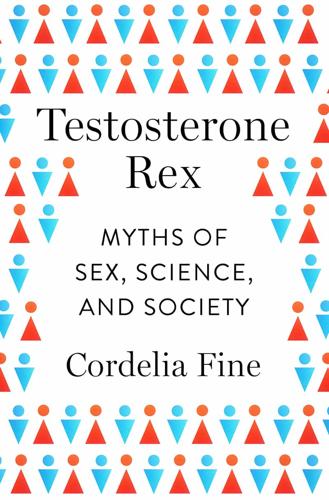
Testosterone Rex: Myths of Sex, Science, and Society
by
Cordelia Fine
Published 13 Jan 2017
A few years ago, in the frenzied lead-up to Christmas, the Australian Greens senator Larissa Waters catapulted herself into the heart of this debate by endorsing a campaign against gendered toy marketing.9 Waters went further than the usual complaint that “no child’s imagination should be limited by old-fashioned stereotypes.” These “outdated stereotypes,” she argued, “perpetuate gender inequality, which feeds into very serious problems such as domestic violence and the gender pay gap.”10 The reaction was a timely reminder that to refer to gender debates as “spirited” can be like describing the surface of the sun as “warm.” Waters was disparaged from the front page of the news to highest political office. The Australian’s Daily Telegraph’s cover headline announced a “Greens war on Barbie,” in which the subheading’s claim of evidence of political party insanity—“Now they’re really off their dolly claiming kids’ toys lead to domestic violence”—was accompanied by an image of Waters and a male Greens MP photoshopped onto the bodies of Barbie and GI Joe.11 Well-known Australian child psychologist Michael Carr-Gregg commented that “these gender differences are hard wired,” adding that “to argue that toys in any way relate to domestic violence is, I think, too far a stretch.
…
So how should we think about those gender-coded toy aisles now—those pink and blue plastic safety knives being sold at the school market? A year on, in the lead-up to the next Christmas, Australian senator Waters drew links a second time between the rigid gender stereotypes promoted by sex-segregated toy marketing, and seemingly far-removed social issues, like the gender pay gap and domestic violence.62 More scorn was poured. But now think about gendered toy marketing not as boy versus girl nature made manifest, but part of the developmental system. At the very time children are laying down cultural meanings and norms in their minds, gendered marketing emphasizes sex as a critically important social divide.63 That booth seller at the local school market overlooked everything her two small customers had in common—their family background, their close age, their ethnicity, the shared fortune of a parent who doesn’t see sliced fingers as an inevitable and important childhood learning experience—and instead emphasized one thing that was different, their genitals.
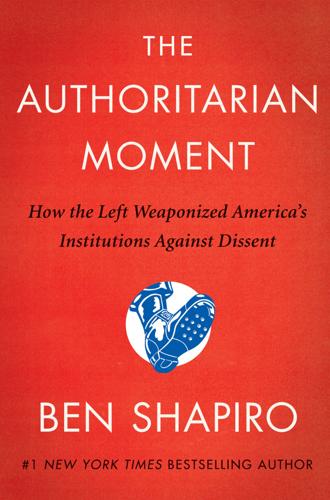
The Authoritarian Moment: How the Left Weaponized America's Institutions Against Dissent
by
Ben Shapiro
Published 26 Jul 2021
Instead, Schwab recommended a “better economic system” rooted not in doing the bidding of shareholders, but in acting in the interest of “stakeholders”—acting “for the public good and the well-being of all, instead of just a few.” What would metrics of success look like? Not profitability. Oh no. The success of companies would revolve around their “gender pay gap,” the diversity of their staff, the reduction of greenhouse gas emissions, the amount of taxes paid. Corporations would no longer be so low-minded as to focus on producing goods and services at the best possible price for the most possible consumers. Now corporations would be in the do-gooding business.21 This commitment to “stakeholder capitalism” versus “shareholder capitalism” has become increasingly popular in the business world.
…
Instead of recognizing its own complicity in #MeToo, Hollywood celebrities began lecturing the rest of America about the country’s inherent sexism. The cause quickly morphed from the universally praised attempt to end sexual harassment and assault into broader left-wing talking points: criticism of the supposed gender pay gap, for example, or attempts to lecture Americans about heteronormativity. At the Oscars, Jimmy Kimmel—who used to star on a television show, The Man Show, featuring women bouncing on a trampoline, and who infamously wore blackface on Comedy Central—lectured America, “the truth is if we are successful here, if we can work together to stop sexual harassment in the workplace, if we can do that, women will only have to deal with harassment all the time at every other place they go.”
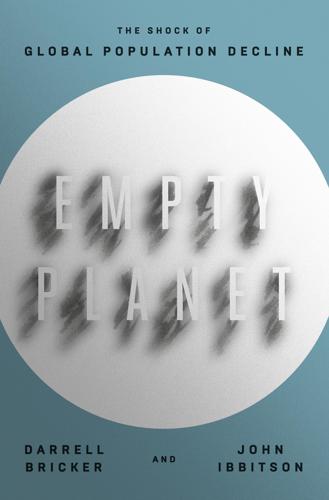
Empty Planet: The Shock of Global Population Decline
by
Darrell Bricker
and
John Ibbitson
Published 5 Feb 2019
.: Pew Research Center, 8 March 2014). http://www.pewresearch.org/fact-tank/2014/03/06/womens-college-enrollment-gains-leave-men-behind 163 “Growth in the Proportion of Female Medical Students Begins to Slow” (London: General Medical Council, October 2013). http://www.gmc-uk.org/information_for_you/23490.asp 164 “Women Still Underrepresented in STEM Fields,” USA Today, 21 October 2015. http://www.usnews.com/news/articles/2015/10/21/women-still-underrepresented-in-stem-fields 165 Claire Cain Miller, “The Gender Pay Gap Is Largely Because of Motherhood,” New York Times, 13 May 2017. https://www.nytimes.com/2017/05/13/upshot/the-gender-pay-gap-is-largely-because-of-motherhood.html 166 “Project on Student Debt: State by State Data 2015” (Washington, D.C.: Institute for College Access and Success, 2015). http://ticas.org/posd/map-state-data-2015 167 “Social Indicators of Marital Health and Well-Being,” State of Our Unions, 2011. http://www.stateofourunions.org/2011/social_indicators.php 168 Joyce A.
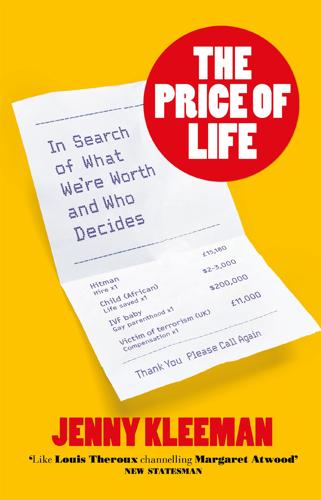
The Price of Life: In Search of What We're Worth and Who Decides
by
Jenny Kleeman
Published 13 Mar 2024
This is about what the rest of the family needs to survive without a massive loss of lifestyle if one of the breadwinners gets seriously ill or dies. It’s the sort of thing you’d chat through with a broker when you decide what level of cover you need and can afford; it might explain the discrepancy between the average levels of coverage between men and women: men value themselves more highly than women do. There is some logic to this: the gender pay gap means that women are paid 14.9 per cent less than men on average, and are more likely to take time away from paid work after they have their first child. But it’s strange to think that becoming a mother might diminish the value of a woman’s life when viewed in terms of insurance coverage. The other perspective, Simone says, is that of the insurer, who is interested in how likely it is that they are going to have to pay up – or rather, how likely it is that you’re going to die before the end of the policy.
…
Makan, Sunil, ‘13 Celebrities With Insured Body Parts That Are Worth More Than Your House’, Elle (11 February 2019). https://www.elle.com/uk/life-and-culture/articles/a30167/mariah-carey-jennifer-lopez-doly-parton-celebrities-insured-body-parts/ Cadbury owner Mondelez announced ‘Chocolate scientist has taste buds insured for £1m’, BBC News (6 September 2016). https://www.bbc.co.uk/news/av/uk-england-birmingham-37287937 insured for £10 million Sayid, Ruki, ‘Coffee taster Gennaro Pelliccia insures tongue for £10m’, Mirror (9 March 2009). https://www.mirror.co.uk/news/uk-news/coffee-taster-gennaro-pelliccia-insures-381336 £80,485 in 2021 ‘Payouts for bereavement, illness, and injury claims top £18.6 million a day’ Association of British Insurers (21 May 2022). https://www.abi.org.uk/news/news-articles/2022/05/payouts-for-bereavement-illness-and-injury-claims/ that figure is £116,414 ‘Employees Benefit as Group Risk Industry Pays Out Record Amount in Claims During 2021’ Group Risk Development (12 May 2022). https://grouprisk.org.uk/2022/05/12/employees-benefit-as-group-risk-industry-pays-out-record-amount-in-claims-during-2021 €291,162 for men ‘Men in Ireland Value Themselves 64% More than Women’, Royal London (June 2021). https://www.royallondon.ie/siteassets/site-docs/press/2021/why_are_men_in_ireland_valued_more_than_women.pdf have their first child Francis-Devine, Brigid, ‘The gender pay gap’, House of Commons Library (1 December 2022). https://commonslibrary.parliament.uk/research-briefings/sn07068/ reviewed every year ‘Code on Genetic Testing and Insurance’, Department of Health and Social Care (23 October 2018). https://www.gov.uk/government/publications/code-on-genetic-testing-and-insurance Chapter 5 on 3 June 2017 The timings in this chapter all come from the inquest into the London Bridge attacks of 2017, reported here: Siddique, Haroon, ‘London Bridge attacks: how atrocity unfolded’, The Guardian (28 June 2019). https://www.theguardian.com/uk-news/2019/jun/28/london-bridge-attacks-how-atrocity-unfolded at the northern end of London Bridge Anderson Q.C., David, ‘Attacks in London and Manchester March‒June 2017: Independent Assessment of MI5 and Police Internal Reviews’, Home Office (December 2017). https://assets.publishing.service.gov.uk/government/uploads/system/uploads/attachment_data/file/664682/Attacks_in_London_and_Manchester_Open_Report.pdf a few hours earlier Dodd, Vikram, ‘Family had reported London Bridge attacker to police, inquest hears’, The Guardian (28 May 2019). https://www.theguardian.com/uk-news/2019/may/28/london-bridge-attacker-job-carrying-out-security-checks-london-underground weighed down with bags of gravel Jackson, Marie, ‘Chaos and killings: 10 minutes at London Bridge’, BBC News (28 June 2019). https://www.bbc.co.uk/news/uk-48619714 Molotov cocktails and blowtorches Dodd, Vikram, ‘London Bridge: more arrests as police tell how terrorists wanted to use truck’, Guardian (10 June 2017). https://www.theguardian.com/uk-news/2017/jun/10/worse-terror-attack-on-london-bridge-foiled-by-chance-police-say she told the inquest From the inquest and reported here: Gibbons, Katie, ‘Survivor tells of premonition of London Bridge terror attack’, The Times (10 May 2019). https://www.thetimes.co.uk/article/survivor-tells-of-premonition-of-london-bridge-terror-attack-3h3ns7npq before their rampage Weaver, Matthew, ‘London Bridge attack trio “had taken large quantities of steroids”’, The Guardian (9 February 2018). https://www.theguardian.com/uk-news/2018/feb/09/london-bridge-attack-trio-had-taken-large-quantities-of-steroids-inquest two miles downstream Jackson, Marie, ‘Chaos and killings: 10 minutes at London Bridge’, BBC News (28 June 2019). https://www.bbc.co.uk/news/uk-48619714 the bridge’s central reservation From the inquest and reported here: Siddique, Haroon, ‘London Bridge attacks: how atrocity unfolded’, The Guardian (28 June 2019). https://www.theguardian.com/uk-news/2019/jun/28/london-bridge-attacks-how-atrocity-unfolded in Tyler’s arms ‘London Bridge attack inquest: Court hears of victims’ final moments’, BBC News (7 May 2019). https://www.bbc.co.uk/news/uk-48185656 away from the crash site ‘London Bridge attack inquest: Sara Zelenak “slipped” before attack’, BBC News (13 May 2019). https://www.bbc.co.uk/news/uk-48252390 tried to find her From the inquest and reported here: McLaughlin, Chelsea, ‘“I didn’t know where she was.”
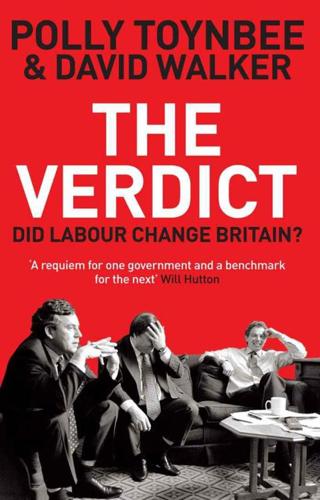
The Verdict: Did Labour Change Britain?
by
Polly Toynbee
and
David Walker
Published 6 Oct 2011
Towards the end, equalities – the era preferred the plural – came together as the party’s deputy leader Harriet Harman brought in an omnibus Act putting inequality based on class and material deprivation on the same footing as that related to gender and race. It imposed new duties on public bodies over pregnancy and maternity, sexual orientation, gender reassignment and religion and belief. In a contested move, it required big private-sector employers (a tiny proportion of firms) to audit their gender pay gap. As if to acknowledge all that Labour had failed to do and say, the Act required all public authorities to act to reduce class inequality. Passed in Labour’s last week, the Act was a mocking afterthought, a ghost of all that might have been. The inequality that hardly dared speak its name was social class.
…
Index 9/11 attacks, 1, 2, 3, 4, 5, 6, 7, 8, 9 A levels, 1 Aberdeen, 1 abortion, 1, 2, 3 Abuhamza, Junaid, 1 AC Milan, 1 Acme Whistles, 1 Action for Children, 1 Adams, Douglas, 1 Adonis, Andrew, 1 Advisory, Conciliation and Arbitration Service, 1 Afghanistan, 1, 2, 3, 4, 5, 6, 7, 8, 9 Helmand province, 1, 2, 3, 4, 5, 6 Africa, 1, 2, 3 after-school clubs, 1, 2, 3 Age of Stupid, 1, 2 Ahern, Bertie, 1 Ahmadinejad, Mahmoud, 1 Ainsworth, Bob, 1 aircraft-carriers, 1 Al Qaeda, 1, 2, 3, 4 Albania, 1 alcohol consumption, 1, 2 and crime, 1, 2, 3 Alexander, Professor Robin, 1 Alzheimer’s disease, 1 Amritsar massacre, 1 Amsterdam summit, 1, 2 Anderson, Lance Corporal George, 1 animal welfare, 1, 2 anti-social behaviour orders (Asbos), 1, 2, 3 apprenticeships, 1, 2 Arafat, Yasser, 1 archaeological artefacts, 1 Arctic Monkeys, 1 Armistice Day, 1 arms trade, 1, 2 Armstrong, Franny, 1 arts budget, 1 Ashmolean Museum, 1 asthma, 1, 2 asylum seekers, 1, 2, 3, 4 Attenborough, Richard, 1 Attlee, Clement, 1 August, Kathy, 1 Austin, Richard, 1 Australia, 1, 2, 3 Austria, 1 autism, 1 aviation, 1 Aylesbury, 1 Baghdad, 1 Baker, Mike, 1 Bakewell, Joan, 1 Bali, 1 Balls, Ed, 1, 2, 3 Bank of England, 1, 2 Barber, Sir Michael, 1 Barker, Kate, 1 Barnardo’s, 1 Barnet Hospital, 1 Barton, Geoff, 1 Basildon and Thurrock Hospital, 1 Basra, 1, 2, 3 Bean, Richard, 1 Beattie, Captain Doug, 1 Beckham, David, 1 Belarus, 1 Belfast, 1, 2, 3 Belgium, 1 Belize, 1 Benn, Hilary, 1, 2 Bennett, Alan, 1 Berlusconi, Silvio, 1 Beveridge, William, 1 Bichard, Sir Michael, 1 Big Brother, 1, 2 Bilbao, 1 Billington, Michael, 1 bin Laden, Osama, 1, 2 Bingham, Lord, 1 Birk, Andy, 1, 2, 3 Birmingham, 1, 2, 3, 4, 5 Aston, 1, 2, 3 Longbridge car plant, 1 and transport policy, 1, 2 birth rate, 1 Black Wednesday, 1 Blackburn, 1, 2 Blackpool, 1 Blair, Cherie, 1 Blair, Tony, 1, 2 and asylum seekers, 1, 2 and child poverty, 1, 2, 3, 4 and climate change, 1, 2 and constitutional reform, 1, 2 and crime, 1, 2, 3 and cultural policies, 1, 2, 3, 4, 5 and economic policies, 1, 2, 3, 4, 5 and education, 1, 2, 3, 4, 5, 6 and Europe, 1 and fairness, 1, 2, 3 foreign policy and Iraq war, 1, 2, 3, 4, 5, 6, 7, 8 and health, 1, 2, 3, 4, 5 and Northern Ireland, 1 and Princess Diana, 1, 2 public apologies, 1 and public sector reform, 1, 2 and religion, 1 and ‘respect’ agenda, 1 style of government, 1 technophobia, 1, 2 and transport, 1, 2 Blears, Hazel, 1, 2 Bloody Sunday inquiry, 1 Bloomberg, Michael, 1 Bloxham, Tom, 1 Blunkett, David, 1, 2 and crime, 1, 2, 3, 4 and education, 1, 2, 3, 4, 5, 6 and migration, 1 BMW, 1 Bobbitt, Philip, 1 Boddingtons’ brewery, 1 Bolton, 1 Boothroyd, Betty, 1 Bosnia, 1 Boston, Lincolnshire, 1, 2, 3, 4 Bowman, Philip, 1 Boyle, Danny, 1 Bradford, 1, 2, 3, 4, 5 Bradford and Bingley, 1 Bradshaw, Ben, 1 Branson, Richard, 1 Brassed Off, 1 Brazil, 1 breastfeeding, 1, 2 Brent, 1 Brighton, 1, 2 Brindle, David, 1 Bristol, 1 Bristol Royal Infirmary, 1 Britain’s Got Talent, 1 British Airways strikes, 1 British Association of Aesthetic Plastic Surgeons, 1 British Energy, 1 British Film Institute, 1 British Medical Association, 1, 2 British Museum, 1 British National Party (BNP), 1, 2, 3 Brixton, 1 broadband services, 1 Brown, Gordon, 1, 2, 3, 4 and climate change, 1, 2, 3 and constitutional reform, 1 and crime, 1, 2, 3 and cultural policies, 1, 2, 3, 4, 5, 6 and defence policy, 1 and economic policies, 1, 2, 3, 4, 5, 6, 7, 8, 9 and education, 1, 2 and Europe, 1 and fairness, 1 and foreign policy, 1, 2, 3, 4, 5, 6, 7 and G20 summit, 1, 2 and health, 1 and pensions, 1, 2 and PFI, 1 and public sector reform, 1 style of government, 1, 2 and tax credits, 1, 2 and transport, 1 Bruges, 1 Brussels, 1, 2, 3, 4, 5 Bryant, Chris, 1 BSE (mad cow disease), 1, 2 Buffini, Damon, 1 Bulgaria, 1 Bulger, Jamie, 1 Buncefield explosion, 1 Burgess, Graham, 1 Burma, 1, 2 Burnham, Andy, 1 buses, 1, 2 Bush, George W., 1, 2, 3, 4 business, 1 company governance, 1 competition policy, 1 see also manufacturing Business Links, 1, 2 Cable, Vince, 1 Cadbury, 1 Caine, Judy, 1 Callaghan, James, 1 Cameron, David, 1, 2, 3, 4 Campaign for Real Ale, 1 Campbell, Alastair, 1, 2 Campbell, Naomi, 1 Canada, 1 cancer research, 1 cannabis, 1, 2 Cannock Chase Hospital, 1 Capel Manor College, 1 Carbon Trust, 1 Cardiff, 1, 2 Millennium Stadium, 1 see also Welsh assembly Care Quality Commission, 1, 2, 3 carers, 1 Carousel children’s centre, 1 Casey, Louise, 1, 2 casinos, 1 Castle, Barbara, 1 cataracts, 1, 2 Cator Park School, 1 CCTV, 1, 2, 3 celebrity culture, 1 Central Office of Information, 1 Ceuta, 1 Charity Commission, 1 Charleroi, 1 Chase Farm Hospital, 1, 2, 3 Cheltenham, 1 Cheney, Dick, 1 Chicago, 1 Chilcot inquiry, 1, 2, 3, 4 Child Maintenance and Enforcement Commission, 1 child poverty, 1, 2, 3, 4, 5, 6, 7, 8, 9, 10, 11 Child Support Agency, 1 child trafficking, 1 Child Trust Funds, 1, 2 childcare, 1, 2, 3, 4, 5, 6 children, 1 in care, 1 and crime, 1, 2 and pre-school education, 1 and reading, 1, 2 and safety, 1 and targets, 1 children’s centres, 1, 2, 3 Chile, 1 China, 1, 2, 3, 4, 5, 6, 7 and foreign policy, 1, 2, 3, 4 Chinese cockle pickers, 1 Christian Voice, 1 Chumbawamba, 1 Church of England, 1 Churchill, Winston, 1 cigarette smoking, 1, 2, 3, 4, 5, 6 see also smoking ban citizenship curriculum, 1 City of London, 1, 2, 3, 4, 5, 6, 7 City of London police, 1 civil partnerships, 1 civil service, 1 Clapham Common, 1 Clapham Park estate, 1, 2 Clarke, Charles, 1 Clarke, Ken, 1, 2 Clarke, Michael, 1 Clarkson, Jeremy, 1, 2 ‘clean technologies’, 1 Cleveland Way, 1 climate change, 1, 2, 3, 4, 5 and transport and energy policies, 1 Climbié, Victoria, 1 Clinton, Bill, 1, 2, 3 Clitheroe, 1 cloning, 1 coal, 1 coalition government, 1, 2, 3, 4, 5 Cockermouth, 1 Cohen, Sir Ronnie, 1 Cole, Vanessa, 1 Collins, Colonel Tim, 1 Comer, Beryl, 1, 2, 3, 4 Common Agricultural Policy, 1, 2 community sentences, 1 Confederation of British Industry (CBI), 1, 2, 3, 4, 5, 6 conflict diamonds, 1 Congo, 1 Connelly, Peter (Baby P), 1 Connexions, 1, 2 Contactpoint database, 1 Cook, Robin, 1, 2 Cool Britannia, 1, 2 Cooper, Robert, 1 Cooper, Yvette, 1 Copenhagen summit, 1, 2, 3, 4, 5, 6 Corby, 1, 2 Corn Laws, repeal of, 1 Cornwall, 1, 2 Coronation Street, 1 coroners, 1 Corus, 1 Countryside Alliance, 1, 2 County Durham, 1 Coventry, 1, 2, 3 Cowley, Philip, 1 Cox, Brian, 1 Crawford, Texas, 1 creative industries, 1, 2 credit card debt, 1 Crewe and Nantwich by-election, 1 Crick, Bernard, 1 cricket, 1 Crime and Disorder Reduction Partnerships, 1 crime, 1 car crime, 1 cyber-crime, 1 and demography, 1, 2 and drugs, 1 gun crime, 1, 2 juvenile crime, 1, 2, 3 knife crime, 1, 2 organized crime, 1, 2, 3 street crime, 1 Criminal Records Bureau, 1 Cruddas, Jon, 1 Cullen, Janet, 1, 2, 3, 4 Cumner-Price, George, 1 cycling, 1, 2, 3 Cyprus, 1, 2 Daily Mail, 1, 2, 3, 4, 5 Daily Telegraph, 1 Darfur, 1 Darling, Alistair, 1, 2, 3 Darwen, 1, 2 Darzi, Lord (Ara), 1 Data Protection Act, 1, 2 Davies, Norman, 1 Davies, Ron, 1 Davis, David, 1 Dearlove, Sir Richard, 1 defence policy, 1, 2, 3, 4, 5 Delhi, 1 dementia, 1 demonstrations, policing of, 1 Demos, 1 Denham, John, 1 Denison, Steve, 1 Denmark, 1, 2 dentistry, 1 depression, 1 Derby, 1 devolution, 1, 2, 3, 4, 5, 6, 7 Dewar, Donald, 1, 2 diabetes, 1 Diana, Princess of Wales, 1, 2, 3 Dilnot, Andrew, 1 disabilities, 1, 2, 3, 4, 5 disarmament, 1 divorce rate, 1 DNA database, 1 Dobson, Frank, 1, 2 doctors consultants, 1 GPs, 1, 2, 3 night and weekend cover, 1 pay, 1, 2, 3 working hours, 1 domestic violence, 1, 2, 3, 4 Doncaster, 1, 2, 3 Dongworth, Averil, 1 Dorling, Professor Danny, 1, 2, 3 Drayson, Paul, 1 drones, 1 drug dealers, 1, 2 drugs, 1, 2, 3 Dublin, 1 Duffy, Bobby, 1 Dundee, 1 Dunn, John, 1 Dunwoody, Gwyneth, 1 EastEnders, 1 Ecclestone, Bernie, 1 ‘eco towns’, 1 ecstasy, 1 Edinburgh, 1, 2, 3 see also Scottish parliament Edlington, 1 education, 1 further education and training, 1, 2, 3, 4 higher education, 1, 2, 3, 4, 5, 6 nursery education, 1 productivity in, 1 pre-school education, 1 and selection, 1, 2 and social class, 1, 2 spending on, 1, 2 and targets, 1, 2, 3 Welsh Assembly and, 1 see also schools education action zones, 1 Education Maintenance Allowance, 1, 2, 3 e-government, 1, 2 Egypt, 1 electoral reform, 1, 2, 3 electricity generation, 1, 2 Elgar, Edward, 1 Elgin marbles, 1 Elizabeth, Queen, the Queen Mother, 1 Elizabeth II, Queen, 1, 2, 3 employee buy-outs, 1 employment, 1 flexible, and migration, 1 part-time, 1, 2 state and ‘parastate’, 1, 2 women and, 1, 2 working hours, 1, 2 energy policies, 1 English for Speakers of Other Languages, 1 English Heritage, 1 Enron, 1 Environment Agency, 1, 2 equalities legislation, 1, 2, 3 Equality and Human Rights Commission, 1, 2, 3 Ericsson, 1 ethnic minorities, 1 euro, 1, 2 Eurofighter, 1 European Court of Human Rights, 1 European Union, 1, 2 European Union Emission Trading Scheme, 1 Eurostar, 1 Exeter, 1 Fairtrade products, 1 Falconer, Charlie, 1 Falklands War, 1 Family Intervention Projects (FIPs), 1 Farlow, Andrew, 1 farmers, 1, 2 fashion, 1 Feinstein, Professor Leon, 1, 2 Financial Services Authority, 1 financial services, 1, 2, 3 Financial Times, 1 Finland, 1 fire and rescue service, 1 fiscal stimulus, 1 floods, 1, 2, 3, 4 Florence, 1 flu, 1, 2 swine flu, 1, 2 Folkestone, 1 food and drink, 1, 2 foot-and-mouth disease, 1, 2 football, 1, 2, 3 Football Association, 1 forced marriages, 1 foreign policy, 1, 2, 3 France, 1, 2, 3, 4 economy and business, 1, 2 and education, 1, 2 and health, 1, 2, 3 Frankfurt am Main, 1 Franklin, Tom, 1 Frears, Stephen, 1 free speech, 1, 2 freedom of information, 1, 2, 3, 4, 5, 6 Freud, Lord, 1 Full Monty, The, 1 Future Jobs Fund, 1 G20 summit, 1, 2, 3 Gainsborough, 1 Galbraith, J.K., 1 Gallagher, Liam, 1 Gallagher, Noel, 1 gambling, 1 gangmasters, 1, 2 gas, 1 Gates, Bill, 1 Gateshead, 1 Gaza, 1 GCHQ, 1 GCSEs, 1, 2, 3, 4 Gehry, Frank, 1 Geldof, Bob, 1 gender reassignment, 1 General Teaching Council, 1 genetically modified crops, 1 Germany, 1, 2, 3, 4, 5, 6, 7 economy and business, 1, 2, 3, 4 and education, 1, 2 and health, 1, 2 Ghana, 1 Ghandi’s curry house, 1 Ghent, 1 Gladstone, William Ewart, 1, 2 Glaister, Professor Stephen, 1 Glasgow, 1, 2, 3, 4 Gleneagles summit, 1, 2, 3, 4, 5 globalization, 1, 2, 3, 4, 5, 6, 7 and crime, 1 and foreign policy, 1, 2, 3 and inequality, 1 and migration, 1, 2 Gloucester, 1 Goldacre, Ben, 1 Good Friday agreement, 1 Goodwin, Sir Fred, 1 Goody, Jade, 1 Gormley, Antony, 1 Gould, Philip, 1 grandparents, and childcare, 1 Gray, Simon, 1 Great Yarmouth, 1 Greater London Authority, 1, 2 Greater London Council, 1 green spaces, 1 Greenberg, Stan, 1 Greengrass, Paul, 1 Greenspan, Alan, 1, 2 Greenwich, 1 Gregg, Paul, 1 Guardian, 1, 2, 3 Guizot, François, 1 Gulf of Mexico oil spill, 1 Gummer, John, 1 Gurkhas, 1 Guthrie of Craigiebank, Lord, 1 Guy’s and St Thomas’s Hospital, 1 habeas corpus, suspension of, 1 Hacienda Club, 1 Hackney, 1 Hale, Baroness Brenda, 1 Hallé Orchestra, 1 Ham, Professor Chris, 1 Hamilton, Lewis, 1 Hammersmith Hospital, 1 Hammond, Richard, 1 Hardie, Keir, 1 Hardy, Thea, 1 Haringey, 1, 2 Harman, Harriet, 1 Harris of Peckham, Lord, 1 Harrison, PC Dawn, 1, 2 Harrow School, 1 Hartlepool, 1, 2 Hastings, 1, 2 Hatfield rail crash, 1 Hatt family, 1, 2, 3, 4 health, 1 and private sector, 1, 2 and social class, 1 spending on, 1, 2 Health Action Zones, 1 Health and Safety Executive, 1 Heathcote, Paul, 1 Heathrow airport, 1, 2, 3, 4 Hellawell, Keith, 1 Hennessy, Professor Peter, 1 Henry, Donna Charmaine, 1, 2, 3 heroin, 1 Hewitt, Patricia, 1, 2 Higgs, Sir Derek, 1 Hills, Professor John, 1, 2, 3 Hirst, Damien, 1 HMRC, 1, 2, 3 Hogg, John, 1, 2, 3 Hoggart, Richard, 1 Holly, Graham, 1 homelessness, 1, 2 Homerton Hospital, 1 homosexuality, 1, 2, 3 ‘honour’ killings, 1 Hoon, Geoff, 1 hospital-acquired infections, 1 hospitals and clinics, 1, 2, 3, 4 A&E units, 1, 2 closures, 1, 2, 3 foundation trusts, 1, 2, 3, 4, 5 and PFI, 1 House of Commons reforms, 1, 2 House of Lords reforms, 1, 2, 3, 4 housing market, 1, 2, 3 housing policies, 1, 2, 3, 4, 5 Howe, Elspeth, 1 Hoxton, 1 Huddersfield, 1 Hudson, Joseph, 1 Hull, 1, 2, 3 Human Rights Act, 1, 2, 3, 4, 5, 6, 7, 8, 9, 10 Humber Bridge, 1 hunting ban, 1 Hussein, Saddam, 1, 2, 3, 4 Hutton, John, 1 Hutton, Will, 1, 2 identity cards, 1, 2 If (Kipling), 1 Imperial War Museum North, 1 income inequalities, 1, 2, 3 gender pay gap, 1, 2 and high earners, 1 and social class, 1 Independent Police Complaints Commission (IPCC), 1 Independent Safeguarding Authority, 1 independent-sector treatment centres (ISTCs), 1 Index of Multiple Deprivation, 1 India, 1, 2, 3, 4, 5, 6 individual learning accounts, 1 inflation, 1 and housing market, 1, 2 International Criminal Court, 1 International Monetary Fund (IMF), 1, 2, 3 internet, 1, 2, 3 and crime, 1 and cyber-bullying, 1 file sharing, 1 gambling, 1 and sex crimes, 1 Iran, 1, 2, 3 Iraq, 1, 2, 3, 4, 5, 6, 7, 8, 9, 10, 11, 12, 13, 14, 15, 16 arms supplies, 1 Chilcot inquiry, 1, 2, 3, 4 and Territorial Army, 1 and WMD, 1 Ireland, 1, 2, 3 Irish famine, 1 Irvine of Lairg, Lord, 1, 2 Ishaq, Khyra, 1 Islamabad, 1 Isle of Man, 1 Isle of Wight, 1, 2 Israel, 1 Italy, 1, 2, 3 and football, 1 Ivory Coast, 1 Japan, 1, 2, 3, 4 Jenkins, Roy, 1, 2 Jerry Springer: The Opera, 1 Jobcentre Plus, 1, 2 John Lewis Partnership, 1, 2 Johnson, Alan, 1, 2, 3, 4 Johnson, Boris, 1, 2 Judge, Lord (Igor), 1 Judge, Professor Ken, 1 Julius, DeAnne, 1 jury trials, 1, 2 Kabul, 1 Kapoor, Anish, 1, 2 Karachi, 1 Karadžic, Radovan, 1 Kashmir, 1 Kaufman, Gerald, 1 Keegan, William, 1 Keep Britain Tidy, 1 Kelvingrove Art Gallery and Museum, 1 Kensit, Patsy, 1 Keynes, John Maynard, 1 Keys, Kenton, 1 Kidderminster Hospital, 1 King, Sir David, 1, 2 King, Mervyn, 1 King Edward VI School, 1 King’s College Hospital, 1 Kingsnorth power station, 1 Kirklees, 1 Knight, Jim, 1 knighthoods, 1 knowledge economy, 1 Kosovo, 1, 2, 3, 4 Kynaston, David, 1 Kyoto summit and protocols, 1, 2, 3 Labour Party membership, 1 Lacey, David, 1 Ladbroke Grove rail crash, 1 Lamb, General Sir Graeme, 1 Lambert, Richard, 1 landmines, 1 Lansley, Andrew, 1 lapdancing, 1 Las Vegas, 1 Lawrence, Stephen, 1 Lawson, Mark, 1 Layard, Professor Richard, 1 Le Grand, Professor Julian, 1 Lea, Ruth, 1 Lea Valley High School, 1, 2, 3, 4, 5, 6 Leahy, Sir Terry, 1, 2 learndirect, 1 Learning and Skills Council, 1 learning difficulties, 1, 2 learning mentors, 1 Leeds, 1, 2, 3, 4 legal reforms, 1 Leigh, Mike, 1 Lenon, Barnaby, 1 Lewes, 1 Lewisham, 1 Liberty, 1 licensing laws, 1, 2 life expectancy, 1, 2, 3, 4, 5 Life on Mars, 1 Lincoln, 1 Lindsell, Tracy, 1, 2 Lindsey oil refinery, 1 Lisbon Treaty, 1 Liverpool, 1, 2, 3, 4, 5, 6 Liverpool FC, 1 living standards, 1, 2 living wage campaign, 1, 2 Livingstone, Ken, 1, 2, 3, 4, 5 Livni, Tzipi, 1 Loaded magazine, 1 local government, 1, 2, 3 and elected mayors, 1 Lockerbie bomber, 1 London, 1, 2, 3, 4, 5, 6 bombings, 1, 2 congestion charge, 1, 2 detention of foreign leaders, 1 G20 protests, 1 Iraq war protests, 1, 2 mayoral election, 1, 2 and transport policy, 1, 2, 3 London Array wind farm, 1 Longannet, 1 Longfield, Anne, 1 Lord-Marchionne, Sacha, 1 Lorenzetti, Ambrogio, 1 lorry protests, 1, 2 Lowry Museum, 1 Lumley, Joanna, 1 Luton, 1, 2, 3, 4 Lyons, Sir Michael, 1 Macfadden, Julia, 1 Machin, Professor Stephen, 1, 2 Maclean, David, 1 Macmillan, Harold, 1 Macmillan, James, 1 McNulty, Tony, 1 Macpherson, Sir Nick, 1 Macpherson, Sir William, 1 McQueen, Alexander, 1 Madrid, 1, 2, 3 Major, John, 1, 2, 3, 4, 5, 6 Malaya, 1 Malloch Brown, Mark, 1 Manchester, 1, 2, 3, 4, 5, 6 club scene, 1, 2 and crime, 1, 2 Gorton, 1, 2, 3, 4, 5, 6 and local government, 1 and transport policy, 1, 2, 3 Manchester Academy, 1 Manchester United FC, 1, 2 Manchester University, 1 Mandelson, Peter, 1, 2 Manpower Services Commission, 1 manufacturing, 1, 2, 3 Margate, 1 ‘market for talent’ myth, 1 marriage rate, 1 Martin, Michael, 1 maternity and paternity leave, 1, 2 Mayfield, Charlie, 1 Medical Research Council, 1 mental health, 1, 2, 3, 4 mephedrone, 1 Metcalf, Professor David, 1 Metropolitan Police, 1, 2, 3 Mexico, 1, 2 MG Rover, 1 Michael, Alun, 1 Middlesbrough College, 1, 2 migration, 1, 2, 3, 4, 5, 6, 7, 8, 9, 10, 11 Milburn, Alan, 1, 2, 3, 4, 5 Miliband, David, 1, 2, 3, 4, 5, 6 Miliband, Ed, 1, 2, 3 Millennium Cohort Study, 1, 2 Millennium Dome, 1, 2, 3 Miloševic, Slobodan, 1 Milton Keynes, 1 minimum wage, 1, 2, 3, 4, 5, 6, 7 Mitchell, Senator George, 1 modern art, 1 Mohamed, Binyam, 1 Monbiot, George, 1 Moray, 1 Morecambe, 1, 2 Morecambe Bay cockle pickers, 1 Morgan, Piers, 1 Morgan, Rhodri, 1 mortgage interest relief, 1 Mosley, Max, 1 motor racing, 1 Mowlam, Mo, 1 Mozambique, 1 MPs’ expenses, 1, 2, 3, 4, 5 MRSA, 1 Mugabe, Robert, 1 Muijen, Matt, 1 Mulgan, Geoff, 1 Mullin, Chris, 1 Murdoch, Rupert, 1, 2, 3 Murphy, Richard, 1 museums and galleries, 1, 2, 3 music licensing, 1 Muslims, 1, 2, 3, 4, 5 mutualism, 1 Myners, Paul, 1 nanotechnology, 1, 2, 3 National Air Traffic Control System, 1 National Care Service, 1 national curriculum, 1 national debt, 1 National Forest, 1 National Health Service (NHS) cancer plan, 1 drugs teams, 1 and employment, 1, 2 internal market, 1 IT system, 1 league tables, 1 managers, 1, 2 NHS direct, 1 primary care, 1 productivity, 1, 2 and public satisfaction, 1 staff numbers and pay, 1 and targets, 1, 2, 3 waiting times, 1, 2, 3, 4, 5, 6, 7, 8 National Heart Forum, 1 National Institute for Health and Clinical Excellence (NICE), 1, 2 National Insurance, 1, 2, 3, 4, 5 National Lottery, 1, 2, 3 National Offender Management Service, 1 National Savings, 1 National Theatre, 1 Natural England, 1, 2 Nazio, Tiziana, 1 Neighbourhood Watch, 1 Netherlands, 1, 2 neurosurgery, 1 New Deal, 1, 2, 3, 4, 5, 6, 7 New Deal for Communities, 1, 2 New Forest, 1 Newcastle upon Tyne, 1, 2 Newham, 1, 2 newspapers, 1, 2, 3, 4, 5 Nigeria, 1 Nightingale, Florence, 1 non-doms, 1 North Korea, 1 North Middlesex Hospital, 1 North Sea oil and gas, 1 Northern Ireland, 1, 2, 3, 4, 5, 6, 7 Northern Rock, 1, 2, 3, 4, 5 Norway, 1 Nottingham, 1, 2 NSPCC, 1 nuclear power, 1 Number Ten Delivery Unit, 1 nurses, 1, 2, 3, 4 Nutt, Professor David, 1 NVQs, 1 O2 arena, 1 Oakthorpe primary school, 1, 2 Oates, Tim, 1 Obama, Barack, 1, 2 obesity, 1, 2 Octagon consortium, 1 Office for National Statistics, 1, 2 Office of Security and Counter Terrorism, 1 Ofsted, 1, 2, 3, 4, 5 Ofwat, 1 Oldham, 1, 2, 3, 4 O’Leary, Michael, 1 Oliver, Jamie, 1, 2 Olympic Games, 1, 2, 3 Open University, 1 O’Reilly, Damien, 1, 2 orthopaedics, 1 Orwell, George, 1, 2 outsourcing, 1, 2, 3, 4 overseas aid, 1, 2 Oxford University, 1 paedophiles, 1, 2, 3 Page, Ben, 1, 2 Pakistan, 1, 2, 3, 4, 5, 6, 7 Palestine, 1, 2 parenting, 1 absent parents, 1 lone parents, 1, 2 teenage parents, 1 Paris, 1, 2 Park Lane, 1 Parkinson, Professor Michael, 1 particle physics, 1 party funding, 1, 2, 3 passport fraud, 1 Passport Office, 1 Patch, Harry, 1 Payne, Sarah, 1, 2 Peach, Blair, 1 Pearce, Nick, 1 Peckham, 1, 2 Aylesbury estate, 1 Peel, Sir Robert, 1 pensioner poverty, 1, 2 pensions, 1, 2 occupational pensions, 1, 2 pension funds, 1, 2 private pensions, 1 public-sector pensions, 1 state pension, 1, 2 Persian Gulf, 1 personal, social and health education, 1 Peterborough, 1 Peugeot, 1 Philips, Helen, 1 Phillips, Lord (Nicholas), 1, 2 Phillips, Trevor, 1 Pilkington, Fiona, 1 Pimlico, 1 Pinochet, Augusto, 1 Plymouth, 1, 2 Poland, 1, 2 police, 1 and demonstrations, 1 numbers, 1, 2, 3 in schools, 1, 2, 3 pornography, 1 Portsmouth FC, 1, 2 Portugal, 1 post offices, 1 Postlethwaite, Pete, 1 poverty, 1, 2, 3 see also child poverty; pensioner poverty Premier League, 1 Prescott, John, 1, 2, 3, 4, 5 press officers, 1 Preston, 1 Prevent strategy, 1 Primary Care Trusts (PCTs), 1, 2 prisons, 1, 2 Private Finance Initiative (PFI), 1, 2 probation, 1, 2 property ownership, 1 prostitution, 1, 2, 3 Public Accounts Committee, 1 public sector reform, 1, 2 public service agreements, 1 public spending, 1, 2, 3 and the arts, 1 and science, 1 Pugh, Martin, 1 Pullman, Philip, 1 QinetiQ, 1 Quality and Outcomes Framework, 1 quangos, 1, 2 Queen, The, 1 Quentin, Lieutenant Pete, 1, 2 race relations legislation, 1 racism, 1, 2 RAF, 1, 2, 3 RAF Brize Norton, 1 railways, 1 Rand, Ayn, 1 Rawmarsh School, 1 Raynsford, Nick, 1 Reckitt Benckiser, 1 recycling, 1 Redcar, 1 regional assemblies, 1, 2 regional development agencies (RDAs), 1, 2, 3 regional policy, 1 Reid, John, 1 Reid, Richard, 1 religion, 1, 2 retirement age, 1, 2 right to roam, 1 Rimington, Stella, 1 Rio Earth summit, 1 road transport, 1 Rochdale, 1, 2 Roche, Barbara, 1 Rogers, Richard, 1 Romania, 1, 2 Rome, 1 Rooney, Wayne, 1 Roosevelt, Franklin D., 1 Rosetta Stone, 1 Rosyth, 1 Rotherham, 1, 2, 3 Royal Opera House, 1 Royal Shakespeare Company, 1 Royal Society for the Protection of Birds, 1 Rugby, 1 rugby union, 1 Rumsfeld, Donald, 1 rural affairs, 1, 2 Rushdie, Salman, 1 Russia, 1, 2 Rwanda, 1 Ryanair, 1, 2 Sainsbury, Lord David, 1 St Austell, 1 St Bartholomew’s Hospital, 1, 2 St Pancras International station, 1 Salford, 1, 2, 3, 4 Sanchez, Tia, 1 Sandwell, 1 Sarkozy, Nicolas, 1, 2 Savill, Superintendent Paul, 1 Saville, Lord, 1 savings ratio, 1 Scandinavia, 1, 2, 3 Scholar, Sir Michael, 1 school meals, 1, 2 school uniforms, 1 school-leaving age, 1 schools academies, 1, 2, 3, 4 building, 1 class sizes, 1 comprehensive schools, 1, 2 faith schools, 1, 2, 3, 4 grammar schools, 1, 2, 3 and inequality, 1 nursery schools, 1 and PFI, 1, 2, 3 police in, 1, 2, 3 primary schools, 1, 2, 3, 4, 5 private schools, 1, 2 secondary schools, 1, 2, 3 in special measures, 1 special schools, 1 specialist schools, 1 and sport, 1 science, 1, 2, 3, 4, 5 Scotland, 1, 2, 3, 4, 5, 6, 7, 8, 9 and children, 1 devolution, 1 electricity generation, 1 and health, 1, 2, 3, 4, 5 Scottish parliament, 1, 2 Section 1, 2 security services, 1 MI5, 1, 2, 3 Sedley, Stephen, 1 segregation, 1 self-employment, 1 Sellafield, 1 Serious Organized Crime Agency, 1 sex crimes, 1 Sex Discrimination Act, 1 Shankly, Bill, 1 Sharkey, Feargal, 1 Shaw, Liz, 1 Sheen, Michael, 1 Sheffield, 1, 2, 3, 4, 5, 6 Sheringham, 1 Shetty, Shilpa, 1 Shipman, Harold, 1 shopping, 1 Short, Clare, 1 Siemens, 1 Siena, 1 Sierra Leone, 1, 2 Skeet, Mavis, 1 skills councils, 1 slavery, 1 Slough, 1 Smith, Adam, 1 Smith, Chris, 1 Smith, Jacqui, 1, 2 Smith, John, 1, 2 Smithers, Professor Alan, 1, 2 smoking ban, 1, 2 Snowden, Philip, 1 social care, 1, 2, 3 Social Chapter opt-out, 1 social exclusion, 1, 2 Social Fund, 1 social mobility, 1, 2 social sciences, 1 social workers, 1 Soham murders, 1, 2, 3, 4 Solihull, 1, 2 Somalia, 1, 2 Souter, Brian, 1 South Africa, 1 South Downs, 1 Spain, 1, 2, 3 special advisers, 1 speed cameras, 1 Speenhamland, 1 Spelman, Caroline, 1 Spence, Laura, 1 sport, 1, 2 see also football; Olympic Games Sri Lanka, 1, 2 Stafford Hospital, 1 Staffordshire University, 1 Standard Assessment Tests (Sats), 1, 2, 3 Standards Board for England, 1 statins, 1, 2, 3 stem cell research, 1 STEM subjects, 1 Stephenson, Sir Paul, 1 Stern, Sir Nicholas, 1, 2 Stevenson, Lord (Dennis), 1 Stevenson, Wilf, 1 Steyn, Lord, 1 Stiglitz, Joseph, 1 Stockport, 1 Stonehenge, 1 Stoppard, Tom, 1 Straw, Jack, 1, 2, 3, 4, 5 student fees, 1 Stuff Happens, 1 Sudan, 1, 2 Sugar, Alan, 1 suicide bombing, 1 suicides, 1 Sun, 1, 2 Sunday Times, 1, 2 Sunderland, 1, 2 supermarkets, 1, 2 Supreme Court, 1, 2 Sure Start, 1, 2, 3, 4, 5, 6, 7, 8, 9, 10 surveillance, 1, 2 Sutherland, Lord (Stewart), 1 Swansea, 1 Sweden, 1, 2, 3, 4, 5 Swindon, 1 Taliban, 1, 2 Tallinn, 1 Tanzania, 1 Tate Modern, 1 Taunton, 1 tax avoidance, 1, 2, 3 tax credits, 1, 2, 3, 4, 5, 6, 7, 8 council tax credit, 1 pension credit, 1, 2, 3 R&D credits, 1 taxation, 1, 2 10p tax rate, 1 capital gains tax, 1, 2 corporation tax, 1, 2, 3, 4 council tax, 1, 2 fuel duty, 1, 2, 3 green taxes, 1, 2 and income inequalities, 1 income tax, 1, 2, 3, 4 inheritance tax, 1, 2 poll tax, 1 stamp duty, 1, 2, 3 vehicle excise duty, 1 windfall tax, 1, 2, 3 see also National Insurance; VAT Taylor, Damilola, 1 Taylor, Robert, 1 teachers, 1, 2, 3 head teachers, 1, 2 salaries, 1, 2 teaching assistants, 1, 2 teenage pregnancy, 1, 2, 3 Teesside University, 1 television and crime, 1 and gambling, 1 talent shows, 1 television licence, 1, 2, 3 Territorial Army, 1 terrorism, 1, 2, 3, 4, 5, 6, 7 Terry, John, 1 Tesco, 1, 2, 3, 4 Tewkesbury, 1 Thames Gateway, 1 Thameswey, 1 Thatcher, Margaret, 1, 2, 3, 4, 5, 6, 7, 8, 9, 10, 11, 12, 13, 14 Thatcherism, 1, 2, 3 theatre, 1 Thornhill, Dorothy, 1 Thorp, John, 1 Tibet, 1 Tilbury, 1 Times, The, 1 Times Educational Supplement, 1, 2 Timmins, Nick, 1 Titanic, 1 Tomlinson, Mike, 1 Topman, Simon, 1, 2 torture, 1, 2 trade unions, 1, 2, 3 Trades Union Congress (TUC), 1, 2, 3 tramways, 1 transport policies, 1, 2 Trident missiles, 1, 2, 3 Triesman, Lord, 1 Turkey, 1, 2 Turnbull, Lord (Andrew), 1 Turner, Lord (Adair), 1, 2, 3 Tweedy, Colin, 1 Tyneside Metro, 1 Uganda, 1 UK Film Council, 1 UK Sport, 1 UK Statistics Authority, 1 unemployment, 1, 2, 3, 4, 5, 6, 7 United Nations, 1, 2, 3 United States of America, 1, 2 Anglo-American relationship, 1, 2, 3, 4, 5, 6, 7 and child poverty, 1 and clean technologies, 1 economy and business, 1, 2, 3 and education, 1, 2, 3 and healthcare, 1, 2 and income inequalities, 1 and internet gambling, 1 and minimum wage, 1 universities, 1, 2, 3, 4, 5 and migration, 1 and terrorism, 1 tuition fees, 1 University College London Hospitals, 1 University for Industry, 1 University of East Anglia, 1 University of Lincoln, 1 Urban Splash, 1, 2 Vanity Fair, 1 VAT, 1, 2, 3 Vauxhall, 1 Venables, Jon, 1 Vestas wind turbines, 1 Victoria and Albert Museum, 1 Waitrose, 1 Waldfogel, Jane, 1 Wales, 1, 2, 3, 4, 5, 6, 7, 8, 9 and children, 1 devolution, 1 Walker, Sir David, 1 walking, 1, 2 Walsall, 1 Wanless, Sir Derek, 1 Wanstead, 1 Warm Front scheme, 1 Warner, Lord Norman, 1 Warsaw, 1 Warwick accord, 1 water utilities, 1 Watford, 1 welfare benefits child benefit, 1, 2 Employment Support Allowance, 1 and fraud, 1, 2, 3, 4 housing benefit, 1 incapacity benefit, 1, 2 Income Support, 1 Jobseeker’s Allowance, 1, 2, 3 and work, 1, 2 Welsh assembly, 1, 2 Wembley Stadium, 1 Westfield shopping mall, 1 Wetherspoons, 1 White, Marco Pierre, 1 Whittington Hospital, 1 Wiles, Paul, 1 Wilkinson, Richard, and Kate Pickett, 1 Williams, Professor Karel, 1 Williams, Raymond, 1 Williams, Rowan, 1 Wilson, Harold, 1, 2, 3, 4, 5, 6, 7 Wilson, Sir Richard, 1 wind turbines, 1, 2 Winslet, Kate, 1 winter fuel payments, 1 Wire, The, 1 Woking, 1, 2 Wolverhampton, 1 Woolf, Lord, 1 Wootton Bassett, 1, 2 working-class culture, 1 working hours, 1, 2 World Bank, 1 Wrexham, 1 Wright Robinson School, 1, 2, 3 xenophobia, 1 Y2K millennium bug, 1 Yarlswood detention centre, 1 Yeovil, 1 Yiewsley, 1 York, 1, 2, 3, 4 Young Person’s Guarantee, 1 Youth Justice Board, 1 Zimbabwe, 1, 2 About the Author Polly Toynbee is the Guardian’s social and political commentator.
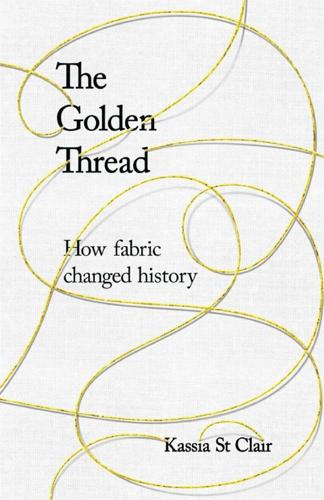
The Golden Thread: How Fabric Changed History
by
Kassia St Clair
Published 3 Oct 2018
, BBC News, 13 August 2016, section Magazine <http://www.bbc.co.uk/news/magazine-37064144> [accessed 10 January 2018] Widmaier, Dan, ‘Spider Silk: How We Cracked One of Nature’s Toughest Puzzles’, Medium, 2015 <https://medium.com/@dwidmaier/spider-silk-how-we-cracked-one-of-nature-s-toughest-puzzles-f54aded14db3> [accessed 6 December 2016] Widmaier, Dan, Co-Founder and CEO of Bolt Threads, phone call with author on 17 February 2017 Wigmore, Tim, ‘Sport’s Gender Pay Gap: Why Are Women Still Paid Less than Men?’, New Statesman, 5 August 2016 <https://www.newstatesman.com/politics/sport/2016/08/sport-s-gender-pay-gap-why-are-women-still-paid-less-men> [accessed 11 January 2018] Wilder, Shawn M., Rypstra, Ann L., and Elgar, Mark A., ‘The Importance of Ecological and Phylogenetic Conditions for the Occurrence and Frequency of Sexual Cannibalism’, Annual Review of Ecology, Evolution, and Systematics, 40 (2009), 21–39 William of Newburgh, History, v <https://sourcebooks.fordham.edu/basis/williamofnewburgh-five.asp> [accessed 19 May 2017] ———, History, iv <http://sourcebooks.fordham.edu/halsall/basis/williamofnewburgh-four.asp#7> [accessed 4 May 2017] William of St Thierry, ‘A Description of Clairvaux, C. 1143’ <https://sourcebooks.fordham.edu/Halsall/source/1143clairvaux.asp> [accessed 19 May 2017] Williams, Wythe, ‘Miss Norelius and Borg Set World’s Records in Winning Olympic Swimming Titles’, New York Times, 7 August 1928, p. 15 Williamson, George C., Lady Anne Clifford, Countess of Dorset, Pembroke & Montgomery 1590–1676.
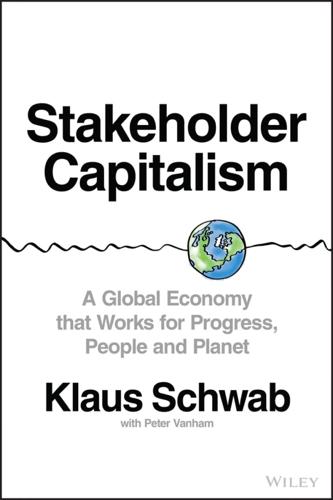
Stakeholder Capitalism: A Global Economy That Works for Progress, People and Planet
by
Klaus Schwab
Published 7 Jan 2021
Ultimately, it is actions, rather than words, that make the difference in becoming a stakeholder company. For Benioff, this implied actions on at least two fronts. First, realizing that Silicon Valley, including his company, had a diversity problem, Benioff brought in an outside advisory firm to review the company's salaries and HR practices. It revealed a gender pay gap at Salesforce and led management to adjust the contracts of those paid less for similar work. And second, as he was confronted with the reality of homelessness in San Francisco, the city that he and his family had grown up in, Benioff decided to speak out in favor of a tax on large tech companies such as his own, which could help finance a structural solution for the homeless in the city.
…
As I mentioned several times earlier in this book, in September 2020, my belief that a more virtuous capitalist system is possible was reaffirmed by the “Stakeholder Capitalism Metrics” initiative of the Forum's International Business Council led by Brian Moynihan of Bank of America. These are non-financial metrics and disclosures that will be added (on a voluntary basis) to companies’ annual reporting in the next two to three years, making it possible to measure their progress over time. Doing so will allow us to answer questions such as: What is the gender pay gap in company X? How many people of diverse backgrounds were hired and promoted? What progress has the company made toward reducing its greenhouse gas emissions? How much did the company pay in taxes globally and per jurisdiction? And what did the company do to hire and train employees? But why did this project come to fruition now?
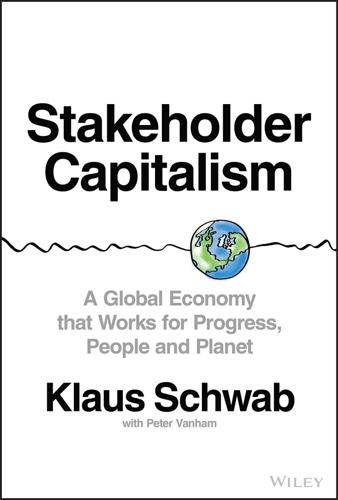
Stakeholder Capitalism: A Global Economy That Works for Progress, People and Planet
by
Klaus Schwab
and
Peter Vanham
Published 27 Jan 2021
Ultimately, it is actions, rather than words, that make the difference in becoming a stakeholder company. For Benioff, this implied actions on at least two fronts. First, realizing that Silicon Valley, including his company, had a diversity problem, Benioff brought in an outside advisory firm to review the company's salaries and HR practices. It revealed a gender pay gap at Salesforce and led management to adjust the contracts of those paid less for similar work. And second, as he was confronted with the reality of homelessness in San Francisco, the city that he and his family had grown up in, Benioff decided to speak out in favor of a tax on large tech companies such as his own, which could help finance a structural solution for the homeless in the city.
…
As I mentioned several times earlier in this book, in September 2020, my belief that a more virtuous capitalist system is possible was reaffirmed by the “Stakeholder Capitalism Metrics” initiative of the Forum's International Business Council led by Brian Moynihan of Bank of America. These are non-financial metrics and disclosures that will be added (on a voluntary basis) to companies’ annual reporting in the next two to three years, making it possible to measure their progress over time. Doing so will allow us to answer questions such as: What is the gender pay gap in company X? How many people of diverse backgrounds were hired and promoted? What progress has the company made toward reducing its greenhouse gas emissions? How much did the company pay in taxes globally and per jurisdiction? And what did the company do to hire and train employees? But why did this project come to fruition now?

Mexico - Culture Smart!
by
Maddicks, Russell;Culture Smart!;
Published 15 Nov 2023
However, the number of women employed at middle-management level has grown significantly over the last five years; women are increasingly overtaking their male counterparts in the number of higher degrees they are attaining, and female entrepreneurs are making their mark in a wide range of industries. However, in 2022 less than half of Mexican women of working age were participating in the labor market, compared to 76 percent for men, and on average female employees earned 16 percent less than their male coworkers, although the gender pay gap is less pronounced in larger corporations. As a foreign woman doing business in Mexico, you are unlikely to encounter any problems but you may find some of the attitudes toward women old-fashioned, even quaint, and some of the comments you receive may border on flirtatious. The key is to keep things professional, friendly, and polite.
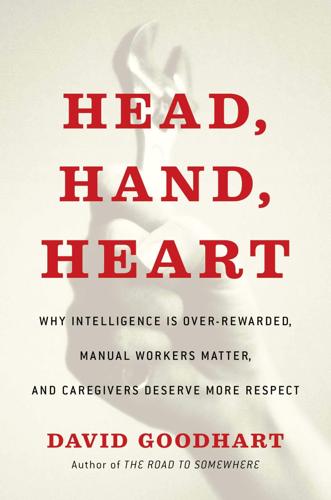
Head, Hand, Heart: Why Intelligence Is Over-Rewarded, Manual Workers Matter, and Caregivers Deserve More Respect
by
David Goodhart
Published 7 Sep 2020
This goal has been substantially achieved, according to Wolf, with women, as already noted, now accounting for half of all members of the top—professional and managerial—social class in the United Kingdom, even if they are still largely absent from the very pinnacle of the professional and business tree. There is only a very small gender pay gap, as such; rather there remains a motherhood penalty caused by women with children working part-time or not at all, breaking their careers and so losing out on top positions. Much policy effort has been expended trying to ensure that the careers of professional women are held back as little as possible by motherhood.
…
S., 93 emotional intelligence (EQ), 13, 67, 71, 137–38, 168, 233, 237–38, 257–58, 299 Employer Skills Survey (UK), 198 Engels, Friedrich, The Condition of the Working Class in England, 33 England, see United Kingdom (UK) Enlightenment, 40, 42, 45, 48 eugenics, 63–64, 73 European Union (EU): popularity of, 167 see also Brexit Britain and names of specific countries EY, 271 Facebook, xiii, 16, 33, 273 family background: assortative mating and, 79–83 cognitive class and, 48, 115, 118, 125–26, 156 family breakdown and, 220, 221–25, 292–93 meritocracy vs., 6–9, 41, 77, 115, 118, 125–26, 156 socioeconomic status and cognitive aptitude, 78–82, 83–84 family policy, 161, 163 Fidoe, Ed, 300 Fletcher, Jason, 83 Florida, Richard, 224n Flynn, James, 6, 63, 67–68 Flynn effect, 6, 63, 67–68 Fortnite (computer game), 195 France: apprenticeships in, 117 baccalauréat and, 35, 117–18 decline of skilled workers, 139, 198 elite selection method, 66 Exposition Universelle (Paris, 1867), 46–47 geographic mobility and, 18, 288 higher education system, 44, 48, 53, 81, 102–4, 110, 117–18, 120, 126, 141, 156 professions/professional exams, 44 social mobility research in, 81 vocational training in, 117–18 Frank, Robert J., The Winner-Take-All Society (with Cook), 142 Franklin, Benjamin, 43 French, Marilyn, The Women’s Room, 247 Fried, Erich, 277 Friedan, Betty, 247 Fry, Martin “Mini,” 173 further education (FE) colleges (UK), 105–6, 108–10, 115 future: “Future of Work” transformation and, 143–44 of knowledge economy, 143–44, 253–74 need for cognitive diversity, 88–89, 281–84 of nursing, 232–42 rebalancing of Hand, Head, and Heart work, ix–xiii, 4–5, 20–29, 257–58, 275, 277–78, 284–301 of the university, 298 Gabbard, Keith, 290 Galton, Francis, 74n Gardner, Howard, 67 Gates, Bill, 33 gender: androgyny and, 223–24 assortative mating and, 79–83 cognitive class and, 32–33 Covid-19 crisis and, xii domesticity and, 27, 32–33, 226–32, 242–43, 293 feminism and, 79–80, 160–61, 224, 228–29, 231, 244, 247, 249 gender divide in status, 190–92, 213–14 gender equality and, 16, 32–33, 226 gender pay gap, 141, 152, 163 Hand (manual) work and, 190–94 Heart (care) work and, 4–5, 26–27, 226–32, 242–45, 249, 293–94 involved fathers, 243, 293 job status and, 190–92, 213–14 in knowledge economy, 151–52 #MeToo movement, 26 professional women and, 26 traditional masculinity and, 190–94, 243–44 General Certificates of Secondary Education (GCSEs, UK), 95–96, 141, 192, 198, 262 general intelligence (g), 56–71 measuring, 56, 61–71, see also IQ/IQ-type tests nature of, 57, 61, 62–63 geographic mobility, 17–19, 125–31, 273–74, 287–91 Germany: adult social care in, 218, 239 apprenticeships, 105, 112, 119–21, 198–99 decline of skilled workers, 139, 198 elite selection method, 66 geographic mobility and, 18, 288, 290 globalization and, 259 higher education system, 48, 50, 53, 102–4, 110, 117–21, 126, 156 immigration policy, 162 professions/professional exams, 44 social mobility research in, 81 vocational training in, 24, 35, 47, 117–19 Gest, Justin, The New Minority, 205 Gharbi, Musa al-, 283 GI Bill (1944, US), 43–44, 66, 96, 115 Gidron, Noam, 204 Gilens, Martin, 160 Gladwell, Malcolm, Outliers, 68 Glass-Steagall Act (1933, US), 284 globalization: centrifugal vs. centripetal forces and, x, 278 “Future of Work” transformation and, 143–44 Hand (manual) work and, 194–95, 198–206, 258–61 Head (cognitive) work and, 24, 258–62 hyper-globalization (Rodrik), ix lowest-cost approach and, x new version of, ix–x, 258–61 political cognitive domination and, 161–62, 175 training/retraining failure in developed countries, 111–17 world trade trends and, x see also immigration Goldie, Julie, 235–36 Goldin, Claudia, 117 Goldthorpe, John H., 75–76, 268, 269 Goleman, Daniel, 67 Goodman, David, 85n Google, 16, 33, 70 Gordon, Robert J., The Rise and Fall of American Growth, 122 Gottfredson, Linda, 57, 70–71 grammar school education, 46, 58, 65, 82, 98, 100 grandes écoles (France), 44, 48, 81, 102, 118, 141, 156 Gray, John, 166, 279 Great British Class Survey, 191, 191n great compression, 134 great divergence, 134–41 Green, Francis, 208–9 Greening, Justine, 17 grit (Duckworth), 67 groupthink, 20 Guilluy, Christophe, 126 Guyatt, Richard, 182 Hacker, Andrew, 82 Haidt, Jonathan: Heterodox Academy (US), 282–83 The Righteous Mind, 70 Hakim, Catherine, 248–49 Haldane, Andy, 255–58, 262, 298 Hall, Peter, 204 Hanbury, Jonathan, 238–39 Hand (manual) work, 189–215 Anywhere-Somewhere divide and, 12–20, 27 careers vs. jobs and, 211–12 Covid-19 crisis and, 7, 23, 26, 203, 277–78 craft skills, 114, 194, 195, 256–57, 294–96, 299–300, 301–2 decline of shop and home economics classes, 195–97 declining status of, 4–5, 13, 15, 189–95, 203–15 gender and, 190–94 globalization and, 194–95, 198–206, 258–61 immigration and, 194–95, 198–206 income divergence with Head (cognitive) work, 133–41 job/income decline and, 193–95, 199–200, 209, 210 new technologies in, 192, 198, 199 nostalgia for, 193, 194, 201–3 productivity in, 16–17 rebalancing with Head and Heart work, ix–xiii, 4–5, 20–29, 257–58, 275, 277–78, 284–301 as route to theoretical understanding, 196–97 scientific management and, 97, 260 separation from Head (cognitive) work, 97–99 skilled trades worker shortages, 15, 197–203 union membership decline and, 139–40 work satisfaction and, 208–11 see also apprenticeships Hankin, Steven M., 133, 142 happiness research, 11, 16–17, 220, 288, 302–3 Harari, Yuval Noah, 21, 36, 218–20, 299 Hardy, Thomas, Jude the Obscure, 47 Hargreaves, James, 42 Harrington, Mary, 248 Haskins, Ron, 82 Head (cognitive) work: Anywhere-Somewhere divide and, 12–20, 27 artificial intelligence (AI) and, 23–25 cognitive-analytical ability as gold standard of human esteem, 3–5, 11–12, 28 Covid-19 crisis and, 7, 23, 62, 277–78 crisis of meaning vs.
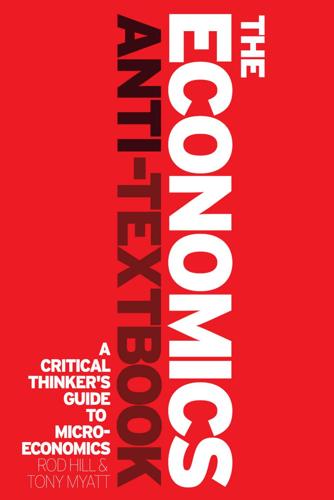
The Economics Anti-Textbook: A Critical Thinker's Guide to Microeconomics
by
Rod Hill
and
Anthony Myatt
Published 15 Mar 2010
In this more general model, the wage offered by other firms is determined within the model itself (Card and Krueger 1995: 379). It turns out that even if workers and firms are identical to begin with, wages will end up differing systematically across firms in equilibrium. Third, Manning (2003: ch. 7) argues that monopsony is an important cause of the gender pay gap. He cites evidence that women place a higher value than men on the non-wage aspects of a job, such as relationships with co-workers. As a result, the labour market for women is more monopsonistic than that for men, allowing employers to pay them less. Is the dynamic monopsony model more empirically relevant than the fairness and status models?
…
M., 114 Friedman, Milton, 38, 78 204–7; influenced by business, 251; intervention by, 15, 71, 86, 135, 143, 165, 169, 196–218, 249, 256, 262 (in finance sector, 258); smaller, preferred, 249 Gramm, Phil, 262 green-washing of companies, 254 greenhouse gases, emissions of, 152, 153, 154–7, 231; pricing of, 155 growth, 10, 21, 135; endogenous, 211; fetish of, 150 Guatemala, coup d’état in, 240 Galbraith, James K., 115, 142, 166, 169 Galbraith, John Kenneth, 18–20, 115, 194; The Affluent Society, 79, 87 game theory, 129 gasoline: oligopolistic industry, 61; prices of, 73 gender pay gap, 189 General Agreement on Tariffs and Trade (GATT), 224 George, David, 42, 204 Gini coefficient, 200–1 Gintis, Herb, 1 Glass-Steagal Act, 259; repeal of, 260–1 global trading system, agreements, 224 global warming, evidence of, 156 globalization, 229–31; analysis of, 219–42 Gomory, R. E., 229 Goodwin, N., 74, 218 government: and determination of market outcomes, 13; and equity, 13–14; and externalities, 154; bias against, habit formation, 12 happiness, 246; maximization of, 10, 12; measurement of, 88–9 see also wellbeing and utility Harberger, A.
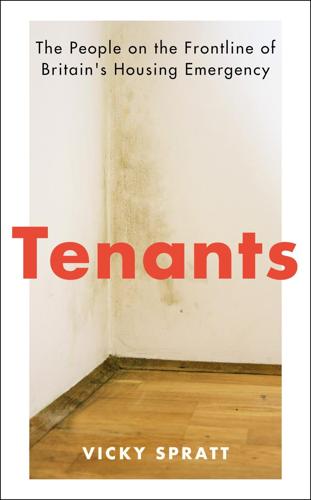
Tenants: The People on the Frontline of Britain's Housing Emergency
by
Vicky Spratt
Published 18 May 2022
There is no official data as to how many grew up in social housing or in houses that were rented as opposed to owned by their families, but, based on these statistics, it’s fair to say that anyone who did so would not be in the majority on any given desk in any given newsroom. Even the BBC has a serious class problem and, while much has been (rightly) made of the corporation’s gender pay gap audit, by contrast relatively little attention has been given to its class gap. On the list of Auntie’s highest-paid staff, no fewer than 45 per cent went to private schools. Beyond the BBC, only 11 per cent of journalists are from a working-class background and, according to research from City University, 94 per cent are white.
…
, www.bankofengland.co.uk/monetary-policy/quantitative-easing only 7 per cent of the British population go to private school: Elitist Britain 2019: The educational backgrounds of Britain’s leading people, Sutton Trust/Social Mobility Commission (2019). Available at www.suttontrust.com/our-research/elitist-britain-2019/ no fewer than 45 per cent went to private schools: Lewis Goodall, ‘The BBC gender pay gap is bad – but its class gap is worse’, Sky News, 23 July 2017, news.sky.com/story/the-bbc-pay-gap-is-bad-its-class-gap-is-worse-10957166 ‘You can only break out of the circle’: Pierre Bourdieu, On Television, tr. Priscilla Parkhurst Ferguson (1996; New York: The New Press, 1998). ‘stealing their children’s future’: In 2010, David Willetts wrote The Pinch: How the Baby Boomers Took Their Children’s Future – And Why They Should Give It Back (London: Atlantic Books, 2010).

The Lonely Century: How Isolation Imperils Our Future
by
Noreena Hertz
Published 13 May 2020
‘Forced out: The cost of getting childcare wrong’, Trades Union Congress, 4 June 2020, https://www.tuc.org.uk/research-analysis/reports/forced-out-cost-getting-childcare-wrong. 94 Brian Wheeler, ‘Why Americans don’t take sick days’, BBC News, 14 September 2014, https://www.bbc.co.uk/news/world-us-canada-37353742. 95 Harriet Meyer, ‘Part-time workers ‘trapped’ in jobs with no chance of promotion’, Guardian, 8 July 2013, https://www.theguardian.com/money/2013/jul/08/part-time-workers-trapped-jobs; Richard Partington, ‘Mothers working part-time hit hard by gender pay gap, study shows’, Guardian, 5 February 2018, https://www.theguardian.com/society/2018/feb/05/mothers-working-part-time-hit-hard-by-gender-pay-gap-study-shows; Paul Johnson, ‘We must not ignore plight of low-paid men as once we ignored that of working women’, Institute for Fiscal Studies, 12 November 2018, https://www.ifs.org.uk/publications/13706. 96 See for example Ariane Hegewisch and Valerie Lacarte, ‘Gender Inequality, Work Hours, and the Future of Work’, Institute for Women’s Policy Research, 14 November 2019, https://iwpr.org/publications/gender-inequality-work-hours-future-of-work/. 97 Dominic Walsh, ‘Centrica staff get extra paid leave to care for sick relatives’, The Times, 7 May 2019, https://www.thetimes.co.uk/article/centrica-staff-get-extra-paid-leave-to-care-for-sick-relatives-6397f7vs8. 98 Joe Wiggins, ‘9 Companies That Offer Corporate Volunteering Days’, Glassdoor, 6 May 2019, https://www.glassdoor.co.uk/blog/time-off-volunteer/. 99 Kari Paul, ‘Microsoft Japan tested a four-day work week and productivity jumped by 40%’, Guardian, 4 November 2019, https://www.theguardian.com/technology/2019/nov/04/microsoft-japan-four-day-work-week-productivity.
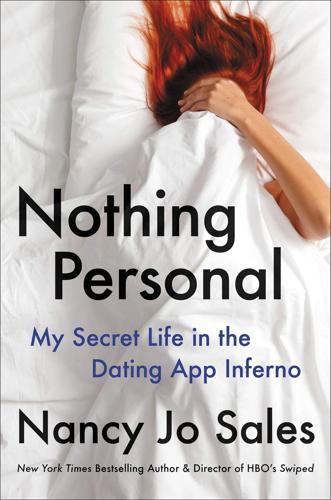
Nothing Personal: My Secret Life in the Dating App Inferno
by
Nancy Jo Sales
Published 17 May 2021
This salary discrepancy was explained to me by the fact that these men “had families,” which actually not all of them did. And then when I got pregnant and asked for a raise, I was told, “Nancy Jo, you can’t get a raise just because you’re pregnant.” It was frustrating. And when can women expect the gender pay gap to close? Apparently not for another 257 years, according to a 2019 study from the World Economic Forum. And do people really think this has no effect on how men see women in the workplace? The atmosphere in the offices of New York made Sterling Cooper Draper Pryce (the ad agency in Mad Men) look woke.
…
Washington Post, June 24, 2016. www.washingtonpost.com/posteverything/wp/2016/06/24/princess-culture-is-bad-for-girls-now-theres-proof/. Hauck, Grace. “When Will Women Get Equal Pay? Not for Another 257 Years, Report Says.” USA Today. Last modified December 22, 2019. www.usatoday.com/story/news/nation/2019/12/20/gender-pay-gap-equal-wages-expected-257-years-report/2699326001/. Hay, Mark. “Why Are the Japanese Still Not Fucking?” Vice, January 22, 2015. www.vice.com/da/article/7b7y8x/why-arent-the-japanese-fucking-361. Hecht, Andrew. “Social Distancing Looks Good on IAC.” Seeking Alpha, April 23, 2020. https://seekingalpha.com/article/4339435-social-distancing-looks-good-on-iac.
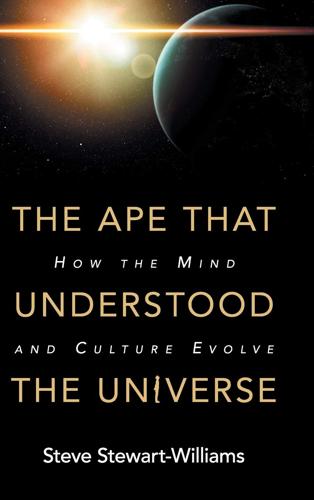
The Ape That Understood the Universe: How the Mind and Culture Evolve
by
Steve Stewart-Williams
Published 12 Sep 2018
As evolutionary psychologist David Buss points out, women can normally land a more attractive partner if they offer sex without commitment, whereas men can land a more attractive partner if they offer commitment as well.55 Men are more likely than women to give potential sexual partners gifts such as flowers and extravagant meals.56 Men are virtually the sole consumers of prostitutes, and prostitutes are overwhelmingly women; as the sociologist Pierre van den Berghe observed, “The male prostitute, unless he caters to homosexuals, is an economic redundancy, constantly undercut by eager amateur competition.”57 And female porn stars are paid more than the males – a genuine gender pay gap.58 The radical feminist Andrea Dworkin summed it up well: A man wants what a woman has – sex. He can steal it (rape), persuade her to give it away (seduction), rent it (prostitution), lease it over the long term (marriage in the United States) or own it outright (marriage in most societies).59 The conclusion is hard to duck.
…
Boyd, 48 Einstein, Albert, 68, 229, 233, 235, 280, 300 El Mouden, Claire, 218 elephant seals, 66, 67, 68, 75, 103–104, 105, 148, 166, 167 elephants, 57, 61, 108, 136, 238 Ellis, Bruce, 83 environment of evolutionary adaptedness (EEA), 38, 47, 50–51, 143, 209 equivalence of inclusive fitness and group selection, 211–212 Esperanto, 226 eternal recurrence, 292, see also Sisyphus Ethical Slut, The, 146 ethnocentrism, 135, 143, 270, 289 Ethnographic Atlas, 166 eugenics, 125, 283 eusocial insects, 24–26, 138, 176, 185, 209, 212, 216, 288 evolutionary medicine, 54–56, 213 evolutionary mismatch, 4–5, 38, 45–56, 143, 240–241, 270ADHD, 56 birth control, 51, 53 breast cancer, 54–55 junk food, 52, 53, 54, 55 mental illness, 55–56 non-kin altruism, 51, 209 obesity, 52–53, 209, 290291 phobias, 51, 53–54 postpartum depression, 55–56, 209 school, 54, 56 skin color, 51 smoking, 51, 53 evolutionary psychology, overview, 11–12, see also common misunderstandings of evolutionary psychology; criticisms of evolutionary psychology evolutionary tree(s) of descent, in biological evolution, 16 in cultural evolution, 220, 230–231 extreme altruism, 206, 207, 208 faith, 265 Farrell, Warren, 91 fascism, 267 Fat Acceptance Movement, 53 fear, 11, 36, 37, 39, 40, 156, 280, see also phobias Feldman, Marcus, 298 female orgasm, 58–59, 291 feminism, 56, 63, 64, 84, 90, 93, 99, 112, 114, 117–118, 122, 144, 255, see also patriarchy; sexism fertility norms, 247–248, 257 Feynman, Richard, 13 fight-or-flight response, 37, 143 Fischer, Edward, 144 Fisher, Helen, 138–139, 142 Fitzgerald, Carey, 187 Fletcher, Garth, 119 food preferences, 4, 36, 42, 45, 52, 60, 87, 112, 122, 196, 231, 261, see also conditioned taste aversions free riders, see problem of cheating Freud, Sigmund, 10, 27, 106, 252, 286 Friedman, Milton, 228 Frost, Peter, 277 functional analysis, 35–36, 38, 40–41, 119–120, 221222, 244, 248, 263264 fur seals, 66, 91, 136 Gaiman, Neil, 138 Gardner, Martin, 295 Gates, Bill, 245 gazelles, 17, 19 gender differences, see sex differences gender pay gap, 84, 102 gene–culture coevolution, 49–50, 222, 241, 268–279art, 277–278 cooking, 268, 272, 273–274 humor, 277–278 intelligence, 272, 274–275, 276 lactose tolerance, 50, 269–272, 275, 276, 298 language, 275–276 music, 277–278 religion, 276–277 salivary amylase, 50, 272 throwing, 273 See also gene–technology coevolution gene–meme hybrids, 14, 218, 280 gene’s-eye view of evolution, 12, 27–31, 120, 137, 156, 157, 178, 186, 213, 237, 244, 250, 253relationship to group selection, 33 relationship to inclusive fitness, 29–30 gene–technology coevolution, 272–273, 275, 278–279 genetic determinism, see criticisms of evolutionary psychology genetic drift, 17, 28, 34 geniuses, 235–236, 267 ghosts, 298–299 gibbons, 43, 73, 74, 77, 148, 149, 170 God, 8, 223, 229as adaptation, 259–260 cultural group selection, 248–249, 253 meme’s-eye view, 259–260, 261, 265 See also religion God Delusion, The, 265 Goodall, Jane, 19, 170, 231 gorillas, 64, 66, 68, 73, 74, 75, 116, 158, 160, 166, 167, 169–170 Gottfredson, Linda, 275 Gottschall, Jonathan, 96–97, 99, 144–145 Gould, Stephen Jay, 49, 57, 290–291 Graham, Paul, 252 group selection, 29, 31–34, 204, 243, 249altruism, 31–33, 205–213 equivalence to inclusive fitness, 211–212 relationship to gene’s-eye view, 33 See also cultural group selection groupishness, 206–207, 209–210, 211 Hahn-Holbrook, Jennifer, 55–56 Haidt, Jonathan, 208 Hames, Raymond, 200 Hamilton, William, 25, 26–27, 28, 178, 181, 183–185, 187, 191, 192, 193, 251 Hamilton’s rule, 183–184 happiness, 29, 155–156, 176, 193, 252 Hardin, Garrett, 198 Hardy-Weinberg equilibrium, 48 Harford, Tim, 155 Harpending, Henry, 49, 271 Harris, Frank, 98 Haselton, Martie, 55–56 Hawkes, Kristen, 204 Hawking, Stephen, 1 Heartburn, 148 Heisenberg’s uncertainty principle, 260 helping at the nest, 175, 185, 216 Henrich, Joseph, 223, 238, 240, 244–247, 322n11 heritability, 44, 256, 283 Hinduism, 10 hipster effect, 240 history, 208, 266–267, 268 History of Human Marriage, The, 133 hoax computer virus warnings, 221, 222, 249, 297 Hobbes, Thomas, 10, 194 Hollywood, 124, 144, 145 Holzer, Jenny, 144 homicide, 102, 103, 108, 138, 146, 147, 158–160, 163–164, 188–189, 202, 246, 291, see also Cinderella effect homosexual necrophilia, 66 homosexuality, see same-sex sexual orientation horizontal meme transfer, 230, 257 hormones, 55, see also sex differences; testosterone How the Mind Works, 41, 300 Hrdy, Sarah, 65, 77 Hughes, Jonnie, 267 human nature, 10, 12, 39, 40, 42, 54, 122, 146, 167, 173, 186, 187, 196, 214, 245–246, 249, 256, 259, 260, 280, 285–286, 289–290 humans as gene machines, 12, 14, 31, 33, 34, 39, 41, 45, 237, 249, 266 humans as meme machines, 14, 266–267, 296 humor, 8gene–culture coevolution, 277–278 operant conditioning, 225–226 sexual selection, 22, 43–45, 277 hunger, 11, 35, 38, 39 hunter-gatherers, 13, 46, 47–48, 49, 50–51, 54, 55–56, 111, 140, 151, 159, 161, 204, 241, 244, 245, 247–248, 272, 279, see also big-game hunting Huxley, Julian, 279 hybridization in cultural evolution, 230 hydra, 292, see also eternal recurrence hyenas, 110 hypercooperativeness, 206–208, 209–210, 233 illusion of intelligent design, 18, 35, 221, 223–224, 225–226, 227, 228, 229, 237, 246–247, 252, 253, 264–265, 266 imitation, 233, 238, 239, 240, 246, 256, 289 inbreeding depression, 131, 136 incest avoidance, 12, 39–43, 129–137, 186, 255, 287cross-cultural universality, 42, 135–136 cultural evolution, 135 emergence despite social pressure, 134 evolutionary explanation, 41, 130–131 in nonhuman animals, 43, 131–132, 136–137 in plants, 136–137 nature vs. nurture, 135–137 inclusive fitness, 24–28, 29, 31, 131, 201, 218, 237–238, 241, 256, 271, 288equivalence to group selection, 211–212 relationship to gene’s-eye view, 29–30 individualism, 143, 144, 214, 238 infanticide, 158, see also Cinderella effect infidelity, 40, 41, 65, 79, 85, 89, 128, 134, 135, 146, 151–152, 165–166, 239, 284in nonhuman animals, 73, 148–149, 166 sexual vs. emotional, 150–151 See also jealousy Inge, William Ralph, 237 in-group–out-group bias, 33, 208, 243, 249, 255, 285, see also groupishness inheritance records, 187–188, 189 intelligence, 1, 9, 13, 61, 76, 210, 223–224, 232–233, 234–236, 242, 256, 283, 285gene–culture coevolution, 272, 274–275, 276 sexual selection, 43, 44–45 intelligent design, see creationism; illusion of intelligent design Internet, 59, 143, 222, 226, 230, 233, 234, 237, 254, 257, 266 IQ, see intelligence Ismail the Bloodthirsty, 69, 77, 82, 245, 310n15 jacanas, 72–73 Jainism, 258 James, William, 34, 154, 250, 301 Jankowiak, William, 144, 190 jealousy, 6, 11, 39–43, 145–152, 169, 172, 173, 178, 197, 280, 287cross-cultural universality, 42, 146–147, 151 evolutionary explanation, 41, 147–150, 152 in nonhuman animals, 43, 147–149 nature vs. nurture, 146–147 See also sex differences in jealousy Jesus, 72, 74, 255, 257258, 299, 300 jewel beetles, 66, 91 John, Elton, 129–130 Judaism, 258 Julius Caesar, 136 junk food, 4, 5, 45, 52, 53, 54, 55, 60, 242, 251, 261–262 just-so stories, 135, 197, see also criticisms of evolutionary psychology kangaroos, 67, 116 karma, 10, 249 Kenrick, Douglas, 97 kibbutzim, 114, 133, 190 kin altruism, 7, 11, 12, 36, 42, 47, 77, 134, 174–175, 177–192, 193, 201, 205, 243, 280, 287, 288cross-cultural universality, 177178, 187, 190, 192 emergence despite culture, 190 in bacteria, 191 in nonhuman animals, 24–26, 43, 175–176, 177, 185–186, 191–192, 317n23 in plants, 43, 191, 192 nature vs. nurture, 176–177, 190–192 kin recognition, 132–134, 189in nonhuman animals, 132, 185–186 kin selection, 25–26, 131, 134, 177–192, 197, 202, 204, 206–, 288, 290, see also kin altruism; kin recognition; relatedness Kindchenschema, see baby schema King Solomon, 166167, 246 Kissinger, Henry, 98 Klingon, 226 Krakauer, David, 235 Kurzban, Robert, 292 lactose tolerance, 50, 269–272, 275, 276, 298 Laland, Kevin, 268, 294, 308n23 language, 8, 9, 13, 15, 47, 116117, 210, 221, 233as parasite, 251–252 biological evolution, 226, 261, 275, 287, 321n88 cultural evolution, 226–227, 230–231, 234 gene–culture coevolution, 275–276 meme’s-eye view, 261, 298, 301 sexual selection, 43–44, 276 See also color terms langur monkeys, 158, 161 Laozi, 214 Le Bon, Gustave, 64 learning biases, 222, 238–241, 242–243content biases, 238–239, 255 frequency-dependent biases, conformist bias, 240–241 rarity bias, 240 model-based biases, prestige bias, 239, 242–243 similarity bias, 239 Leibniz, Gottfried, 234 lemmings, 32, 33, 195 Lewontin, Richard, 57 Lieberman, Daniel, 55 lions, 17, 18, 19, 34, 36, 37, 40, 42, 149, 158, 161, 193194, 209, 210, 279 longevity, see sex differences in longevity love, 6, 11, 12, 15, 34, 39, 40, 76, 83, 86, 87, 91, 121, 130, 133, 134, 137–145, 147, 150, 165, 168, 172, 189, 197, 208, 218, 256, 280, 287, 290companionate love, 140–141 cross-cultural universality, 140, 144–145 evolutionary explanation, 141–143 nature vs. nurture, 144–145 romantic love, 137–140, 203 sociocultural explanation, 143–144 symptoms, 138–140 love birds, 73, 74 Love You Forever, 152–153 Lumsden, Charles, 238, 251 lust, see sexual desire Lykken, David, 108109 Lynch, Aaron, 257 Mach, Ernst, 301 MacLeane, Shirley, 146, 147 Madonna, 86 Mahdists of Sudan, 256 Maher, Bill, 83 maladaptive culture, 9, 14, 240–243, 244, 249, 251–252, 253, 296, 297, 302–303, see also memes as parasites male nipples, 58 male parental care, 5, 12, 45, 47, 62, 74, 76–77, 85, 9899, 105, 110111, 129, 141–142, 152, 153, 154–155, 170–172in nonhuman animals, 147–148, 170 See also biparental care male physique, 75, 77, 99, 105–106, 128, 130, 167 Malthus, Thomas, 236 Man a Machine, 18 Marks, Jonathan, 283 martyrdom, 2425, 262, 300, 302, 303 Marxism, 255, 267 mate guarding, 147–148, 149, 152, see also mutual mate guarding mate preferences, 6, 11, 39–43, 75, 120–129, 165as a cause of evolution, 21, 22, 44, 71, 75–76, 77, 101–102, 105, 160, 203, 277 cross-cultural universality, 42, 124, 127–128, 129, 203, 288, 290 evolutionary explanation, 41, 93, 124–125 facial femininity, 126–127, 128 fertility, 41, 43, 93, 94, 95–96, 122, 124–125, 126, 127, 129, 147, 161, 178, 312n85 good genes, 43, 45, 70, 91, 93, 98–99, 124–125, 126, 202, 204 health, 39, 40, 41, 43, 70, 93, 98, 124–125, 126, 127, 129, 202, 245 in nonhuman animals, 43, 91, 93, 98, 121–122, 126, 129 masculinity, 128–129 nature vs. nurture, 122–124, 129 sociocultural explanation, 122, 129 symmetry, 6, 39, 40, 41, 43, 60, 93, 125–126, 130 virginity, 288 voice pitch, 105106, 125, 128, 129 waist-to-hip ratio (WHR), 77, 127–128, 130, 314n16 youthfulness, 6, 40, 41, 69, 93, 94, 127, 128 See also sex differences in mate preferences; sex differences in the importance of good looks and youthfulness in a mate; sex differences in the importance of wealth and status in a mate materialism, 10, 18 mating displays, see sexual ornaments Mating Mind, The, 202 mating opportunity cost, 111–112, 171 mating systems, 128, 172–173, see also monogamy; polygyny; promiscuity Maugham, Somerset, 141 maximum offspring number, see sex differences in maximum offspring number McElreath, Richard, 238, 240 MCFC (males-compete/females-choose) model, 2223, 72, 73 McLaughlin, Mignon, 79 Mead, Margaret, 146 media, 64, 94, 95, 97, 124 medicine, 47, 59, 111, 262, 284 Meme Machine, The, 254 memeplexes, 252, 253, 257–258, 263–264, 265, 266, 269 memes as parasites, 251–252, 259, 261–263, 271 memetic adaptations, 257–258, 264–266 memetic drift, 254 memetic mismatch, 240–241, 267 memetics, 13–14, 144, 218–223, 249–268apple pie and ice cream, 251, 261–262, 303 calculus, 252, 267 celibacy, 256, 257, 262, 302, 303 chain letters, 219–222, 249, 253, 261–262, 297 cocooning, 257 color terms, 254–255 earworms, 14, 252, 253, 254, 259, 262, 263, 271, 296, 297 faith, 265 fertility norms, 257 God, 259–260, 261, 265 hoax computer virus warnings, 221, 222, 249, 297 language, 251–252, 261, 298, 301 martyrdom, 262, 300, 302, 303 morality, 14, 264, 301 mudslinging, 258 music, 252, 260–261, 262–263, 300, 301, 302 political ideologies, 222, 252, 255, 256, 258, 263, 266–267 proselytizing, 257–258 religion, 14, 222, 252, 255, 256, 257–258, 262, 263–265, 266, 295, 296, 299, 300, 301 science, 268, 300 smoking, 252, 253, 296, 297, 303 See also criticisms of memetics Mencken, H.
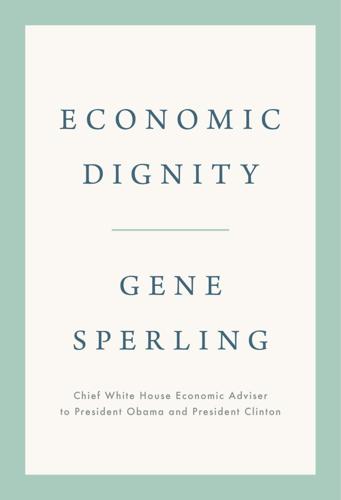
Economic Dignity
by
Gene Sperling
Published 14 Sep 2020
Sperling, “Judicial Right Declaration and Entrenched Discrimination,” Yale Law Journal 94, no. 7 (1985), https://digitalcommons.law.yale.edu/ylj/vol94/iss7/9; and Gene Sperling, “Does the Supreme Court Matter?” American Prospect, December 5, 2000, https://prospect.org/justice/supreme-court-matter/. 8. “The Gender Pay Gap by the Numbers,” Lean In, accessed January 19, 2020, https://leanin.org/equal-pay-data-about-the-gender-pay-gap#endnote3. 9. “The Wage Gap for Black Women: Working Longer and Making Less,” National Women’s Law Center, August 19, 2019, https://nwlc.org/resources/the-wage-gap-for-black-women-working-longer-and-making-less; and “Equal Pay for Latinas,” National Women’s Law Center, November 13, 2019, https://nwlc.org/resources/equal-pay-for-latinas. 10.
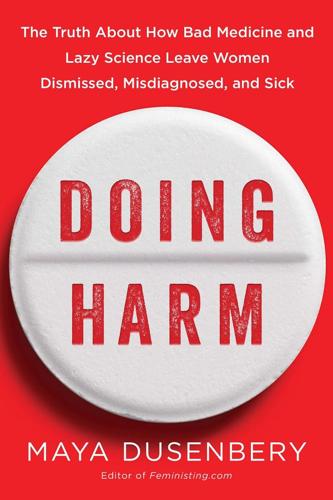
Doing Harm: The Truth About How Bad Medicine and Lazy Science Leave Women Dismissed, Misdiagnosed, and Sick
by
Maya Dusenbery
Published 6 Mar 2018
Women doctors also earn less than their male counterparts. According to a 2016 study published in JAMA: The Journal of the American Medical Association of roughly 10,000 physician faculty members at twenty-four medical schools, the women earned over $50,000 less per year, on average, than their male colleagues. This gender pay gap is often blamed on the fact that the primary care specialties that women often go into tend to be lower paying. But even after adjusting for specialty and several other factors that affect pay—including age and experience—there was still a difference of almost $20,000 that wasn’t explained. In fact, some studies suggest that the gap has actually been increasing in recent years.
…
abortion, 16–17, 23, 26, 63 addiction, 47, 55 Addison’s disease, 148 adverse childhood experiences (ACE), 89 Affordable Care Act (ACA), 13–14, 17 Albee, Robert, Jr., 224 allergies, 297–98 All in My Head (Kamen), 195 Alzheimer’s disease, 3, 20, 27, 47, 243 Ambien (zolpidem), 43–44 American Association of Clinical Endocrinologists, 160 American Autoimmune Related Diseases Association (AARDA), 2, 138, 140, 142, 144, 145, 147, 148 American College of Obstetricians and Gynecologists, 26, 52 American College of Rheumatology, 200 American Gynecological Society, 214 American Heart Association, 110 American Medical Association (AMA), 7, 16, 52, 141; AMA Journal of Ethics article, 77; English’s open letter, 263; JAMA studies on gender pay gap and gender bias, 10 American Psychological Association (APA), Personality Characteristics of Patients with Pain, 195 American Thyroid Association, 159 anesthesia, 43, 53 anti-NMDA receptor encephalitis, 167–69 anxiety, 50, 70, 91; misdiagnosis of other diseases as, 122–24, 146, 151, 154, 159; panic disorder, 124–25, 277; POTS undifferentiated from, 277; somatization and, 78, 82, 89, 92; symptoms attributed to, 61–62, 78, 80–82, 89, 122–24, 126–29, 151, 199 Aronowitz, Robert A., 288 arrhythmias, 110–11 Association of American Medical Colleges, online curriculum database, 54 asthma, 41, 73, 241, 242, 297, 302 Atkins, Chloë, My Imaginary Illness, 102, 103 attention deficit disorder, 117 Aucott, John, 291–92 Authors of Our Own Misfortune?
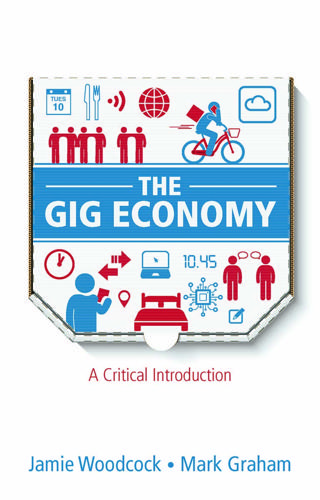
The Gig Economy: A Critical Introduction
by
Jamie Woodcock
and
Mark Graham
Published 17 Jan 2020
As Anderson (2000: 1) has argued, ‘domestic work is vital and sustaining, and it is also demeaned and disregarded.’ The pressures of unpaid domestic work increase the likelihood of women working in ‘non-standard’ jobs (Fredman, 2003). This means that women are much more likely to end up in segregated jobs, with a gender pay gap and fewer social protections throughout the life course, amongst other negative outcomes. Similarly, when it is ‘paid domestic work in private households’, it ‘is disproportionately performed by racialized groups’ (Anderson, 2000: 1). The racialization of work has its roots in slavery, which played a key role in financing the industrial revolution.
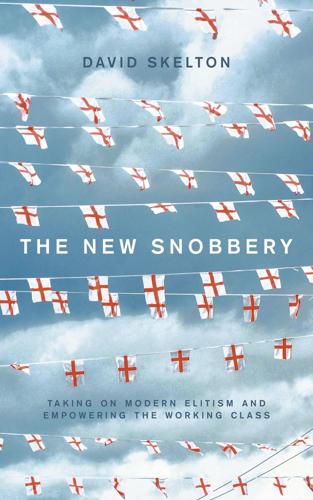
The New Snobbery
by
David Skelton
Published 28 Jun 2021
It’s essential that big business begins to show that it is taking diversity of economic and class background seriously. Boosting employment of women, LGBT and BAME people is important, but employing more black people from working-class backgrounds is very different to employing more BAME Etonians. Large businesses, who are already expected to file a gender pay gap report annually, should also be expected to report on how they are increasing socio-economic diversity. They should consider increasing the proportion of entry-level jobs offered to non-graduates and also changing recruitment practices to adopt methods such as the ‘CV free’ recruitment utilised by the likes of The Spectator.
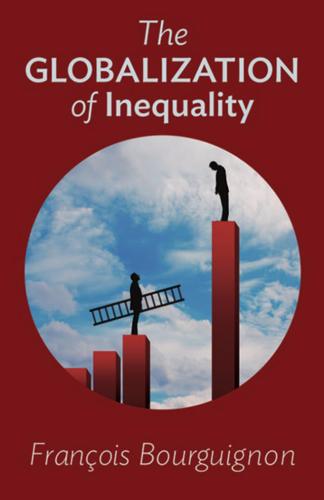
The Globalization of Inequality
by
François Bourguignon
Published 1 Aug 2012
As with the gap between men and women, the rate of the reduction of racial inequality in wages has slowed since the mid-1980s, as differences in educational levels between blacks and whites have progressively declined. More generally, see the survey by Dominique Meurs and Sophie Ponthieux, “Gender Inequality” in Atkinson and Bourguignon (eds.), Handbook of Income Distribution, vol. 2, chapter 12. For the United States, see Francine Blau and Lawrence Kahn, “The U.S. Gender Pay Gap in the 1990s: Slowing Convergence,” Industrial & Labor Relations Review 60, no. 1 (2006): 45–66. 13 66 Chapter 2 Discrimination against migrants can be observed in most countries, even after controlling for differences in age, education, and occupation with respect to the native population or the dominant race or ethnicity.
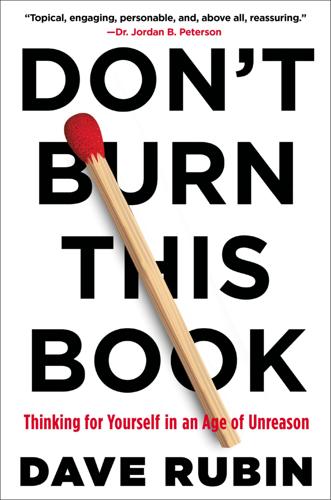
Don't Burn This Book: Thinking for Yourself in an Age of Unreason
by
Dave Rubin
Published 27 Apr 2020
But if one still needs a reason to justify being a militant feminist, then head over to the Middle East. That’s where you’ll find real misogyny, which is propped up by a proper patriarchy. Happy travels! WAGE GAP There are two things that could survive a nuclear war: cockroaches and the myth of the gender pay gap. Despite being debunked by countless economists (many of whom are women), it’s a statistical lie that never dies. So let’s check the facts . . . First, the claim women earn 79 cents for every man’s dollar is pure spin. The figure is an aggregate one, which compares the median of all women’s earnings with the equivalent for all men, but this ignores job type, experience, and hours worked.
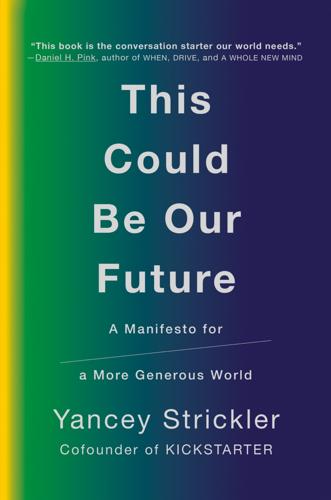
This Could Be Our Future: A Manifesto for a More Generous World
by
Yancey Strickler
Published 29 Oct 2019
He hosts on his website the PDFs of all the Business Roundtable’s previous statements (http://www.ralphgomory.com). “production distribution activities”: From The Value of Everything by Mariana Mazzucato (page 160). executive compensation has soared 1,000 percent: Statistic on the 1,000 percent rise in executive compensation comes from Bloomberg Businessweek (“American CEO Pay Is Soaring, but the Gender Pay Gap Is Drawing the Rage,” August 2018). CHAPTER FIVE: THE TRAP It was Harvard Business Review: The Harvard Business Review cover is from October 2015. attitudes of America’s college students: UCLA’s Higher Education Research Institute’s CIRP Freshman Survey reports, going all the way back to 1966 to today, can be found online at https://heri.ucla.edu/publications-tfs/.
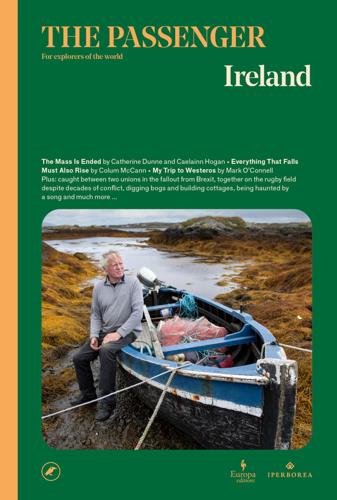
The Passenger
by
The Passenger
Published 27 Dec 2021
There are many other inequalities to be addressed, too, not least the treatment of refugees and asylum seekers in our current profit-making system of Direct Provision (see ‘Asylum Seekers in a Land of Emigration’ on page 26), a system that the UNHCR has condemned as recently as October 2020. It has called for immediate, urgent reforms to be implemented in all aspects of this inhumane system. There is still a gender pay gap. Our health service is straining at the seams, particularly since Covid-19. Mental health services, for young people in particular, are inadequate. Housing is the biggest single issue for young people today, with average rents per month for a modest apartment in the capital – where most of the jobs are – costing between €1,500 and €2,000 ($1,730–$2,300).
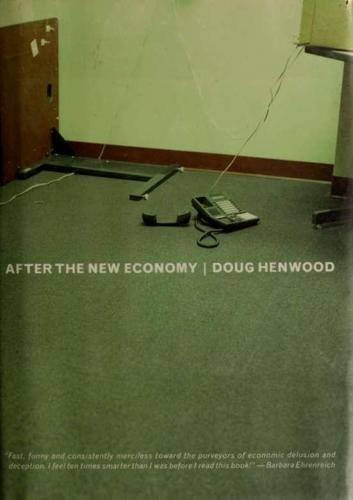
After the New Economy: The Binge . . . And the Hangover That Won't Go Away
by
Doug Henwood
Published 9 May 2005
"Productivity Is at Center of New Economy Debate," San Jose Mercury Neu/5,July3,2000. Blanchflower, David G., and Andrew J. Oswald, "Well-Being Over Time in Britain and the USA," National Bureau of Economic Research Working Paper 7487, January <www.nber.org/papers/w7487>. Blau, Francine D. (1996)."Where Are We In the Economics of Gender? The Gender Pay Gap," National Bureau of Economic Research Working Paper 5664, July <www.nber.org/ papers/w5664>. Blau, Francine D, and Lawrence M. Kahn (1992). "Race and Gender Pay Differentials," National Bureau of Economic Research Working Paper 4120, July <www.nber.org/ papers/w4120>. (2000). "Gender Differences in Pay," National Bureau of Economic Research Working Paper 7732,June <www.nber.org/papers/w7732>.
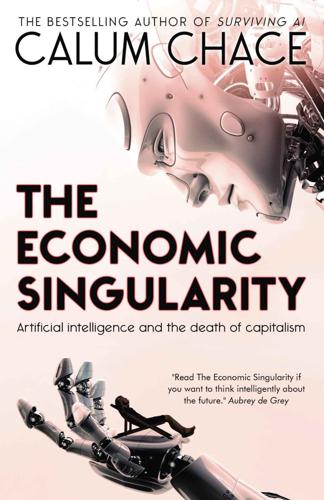
The Economic Singularity: Artificial Intelligence and the Death of Capitalism
by
Calum Chace
Published 17 Jul 2016
UBI involves payments to people who really don't need them, while NIT could stigmatise recipients. The benefits claimed for UBI address issues which concern both the political left and right. Left-wing proponents see it as a mechanism to eradicate poverty and redress what they view as growing inequality within societies. They sometimes argue that it tackles the alleged gender pay gap, and redistributes income away from capital and towards labour. It has also been held out as a partial solution to the alleged generational theft whereby relatively wealthy pensioners are receiving income generated by taxes on young workers who have no assets, and who may not themselves receive similar benefits in later life because the welfare system looks increasingly unaffordable.
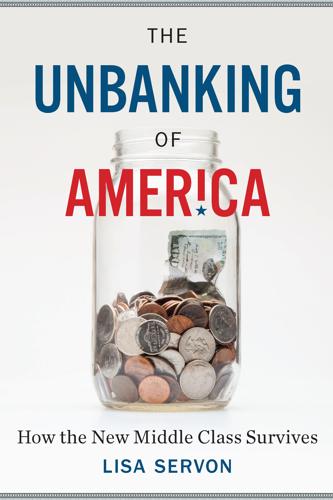
The Unbanking of America: How the New Middle Class Survives
by
Lisa Servon
Published 10 Jan 2017
Other members of her generation are beset by worry: 39 percent of millennials say they worry once a week or more about their financial future, and women worry more than men. Only 2 percent of millennial women claim that they never worry about money, whereas 20 percent of men say they’re worry-free. This is at least partially financial; while millennial women are making gains in closing the gender pay gap, they still earn about eighty-five cents to the millennial man’s dollar. Most millennials have savings accounts but there’s not much in them. They want to save but there’s nothing left over after paying the bills. More than three-quarters of adults under the age of thirty worry that they aren’t saving or investing enough.
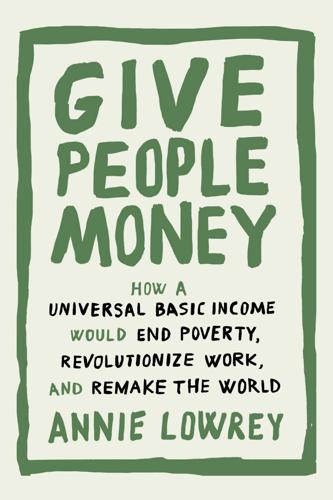
Give People Money
by
Annie Lowrey
Published 10 Jul 2018
the United States’ female labor participation rate: Eleanor Krause and Isabel Sawhill, “What We Know and Don’t Know About Declining Labor Force Participation: A Review” (Washington, DC: Brookings Institution, May 17, 2017). the United States’ fastest-growing job: Karsten Strauss, “Predicting the Fastest-Growing Jobs of the Future,” Forbes, Nov. 7, 2017. “By the time a woman earns her first dollar”: Jessica Schieder and Elise Gould, “ ‘Women’s Work’ and the Gender Pay Gap: How Discrimination, Societal Norms, and Other Forces Affect Women’s Occupational Choices—and Their Pay” (Washington, DC: Economic Policy Institute, July 20, 2016). “pollution theory of discrimination”: Claudia Goldin, “A Pollution Theory of Discrimination: Male and Female Differences in Occupations and Earnings” (NBER Working Paper no. 8985, June 2002).

12 Bytes: How We Got Here. Where We Might Go Next
by
Jeanette Winterson
Published 15 Mar 2021
India is hardly a feminist utopia, but women have been encouraged to take up programming work because it is seen as something a woman can do at home, and that can be fitted in around childcare. Around 34% of tech workers are female, and most of those are under 30. But while the enthusiasm is there, and the capacity is there, the gender pay gap is dramatic. Indian women get hired, but most are not making it past entry roles and into management. A 51% intake of women at entry level translates into 25% at management level, and only 1% at the very top. * * * The great thing is that none of this is fixed. What has been done can be undone At Carnegie Mellon University, Pittsburgh, Pennsylvania, Lenore Blum, a professor of computing science, has increased female enrolment from 8% in the 1990s to 48% now.
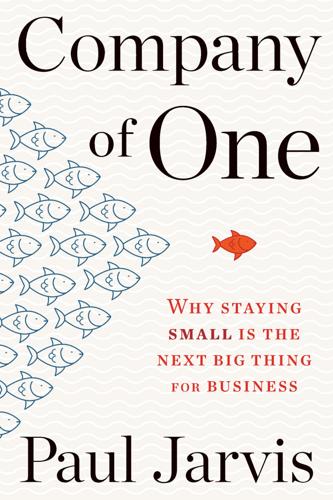
Company of One: Why Staying Small Is the Next Big Thing for Business
by
Paul Jarvis
Published 1 Jan 2019
Traditional banks give 50 percent of their fee to a salesperson as a commission, but WealthSimple and similar robo-management services give bonuses to their advisers based solely on client feedback and happiness. Their fees are published on their websites for anyone to compare to other wealth management services they might wish to use. Ellevest, a wealth management company that has built a new approach to women-focused investing (based on risk preferences, gender pay gaps, and women’s longer life expectancy), has a fiduciary duty to act in their clients’ best interests at all times and to not use their clients’ assets for their own gain. Consumer trust increases when the ulterior motive of selling a product just to make a commission is removed from the transaction.
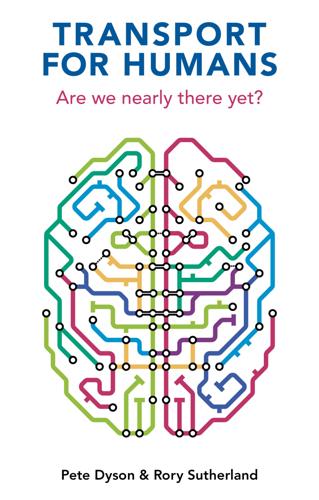
Transport for Humans: Are We Nearly There Yet?
by
Pete Dyson
and
Rory Sutherland
Published 15 Jan 2021
Line-management training and onboarding processes shape the success of diverse hires. Hiring in groups rather than sequentially also increases diversity. It removes the pressure on each candidate to conform to every specified metric.18 In the United Kingdom, the introduction of mandatory annual reporting of gender pay gaps by organizations with more than 250 employees has created reputational incentives to change. This creates an incentive for fairness in promotion. But why stop at gender? The speed and scale of change are of course influenced by labour market forces, but also by the demands of the people working to make better decisions.

Nomadland: Surviving America in the Twenty-First Century
by
Jessica Bruder
Published 18 Sep 2017
.: National Women’s Law Center, 2016. http://nwlc.org/wp-content/uploads/2016/09/Poverty-Snapshot-Factsheet-2016.pdf. 38. Women earning less Social Security than men: Joan Entmacher and Katherine Gallagher Robbins, Fact Sheet: Women & Social Security. Washington, D.C.: National Women’s Law Center, 2015. http://nwlc.org/wp-content/uploads/2015/08/socialsecuritykeyfactsfactsheetfeb2015update.pdf. 38. Gender pay gap: Ariane Hegewisch and Asha DuMonthier, The Gender Wage Gap: 2015. Washington, D.C.: Institute for Women’s Policy Research, 2016. http://www.iwpr.org/publications/pubs/the-gender-wage-gap-2015-annual-earnings-differences-by-gender-race-and-ethnicity. 38. Outliving men by five years: Jiaquan Xu et al., Mortality in the United States, 2015.
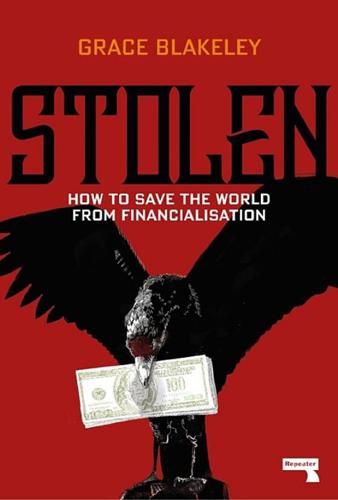
Stolen: How to Save the World From Financialisation
by
Grace Blakeley
Published 9 Sep 2019
The PAM should take up a role as an activist investor in the corporations whose stock it owns. But rather than pressuring companies to maximise shareholder value, it should use its shareholdings to support the objectives of the Green New Deal. For example, encouraging sustainable business practices, promoting internal democracy, reducing pay differentials, closing the gender pay gap, and promoting responsible tax practices. Over the long term, as the PAM increases its holdings over domestic enterprises, it could provide an important role in promoting accountability amongst state- or worker-owned corporations — both promoting efficiency and ensuring these corporations are acting in the interests of stakeholders. 7.
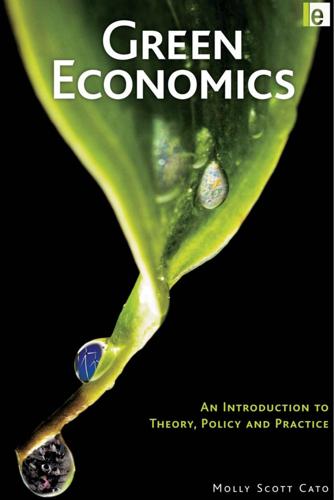
Green Economics: An Introduction to Theory, Policy and Practice
by
Molly Scott Cato
Published 16 Dec 2008
The richest 1 per cent of the population has increased its share of national income from around 6 per cent in 1980 to 13 per cent in 1999. Wealth distribution is more unequal than income distribution, and has continued to get more unequal in the last decade. Between 1990 and 2000 the percentage of wealth held by the wealthiest 10 per cent of the population increased from 47 per cent to 54 per cent. Although the gender pay gap has narrowed, only very slow progress has been made since 1994. In 1994 women in full-time work earned on average 79.5 per cent of what men earned; by 2003 this had only increased to 82 per cent. Deprived communities suffer the worst effects of environmental degradation. Industrial sites are disproportionately located in deprived areas: in 2003, there were five times as many sites in the wards containing the most deprived 10 per cent of the population, and seven times as many emission sources, than in wards with the least deprived 10 per cent.
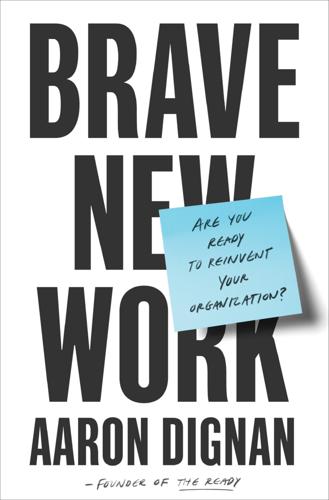
Brave New Work: Are You Ready to Reinvent Your Organization?
by
Aaron Dignan
Published 1 Feb 2019
It’s been a half a century since the Equal Pay Act, but women still face a sizable wage gap, earning somewhere between 78 and 80 cents for every dollar a man earns. Many minorities face similar gaps, which are in some cases actually increasing. These pay gaps are a complex phenomenon, driven in part by discrimination and bias but also by broader educational and sociological patterns. A new study on the gender pay gap in Denmark, one of the world’s most egalitarian societies, reveals that women working full time are still paid 15–20 percent less than men. Surprising, until you realize that pay gap is largely a penalty for childbearing. Women experience a sharp decline of up to 30 percent in their earnings after the birth of their first child.
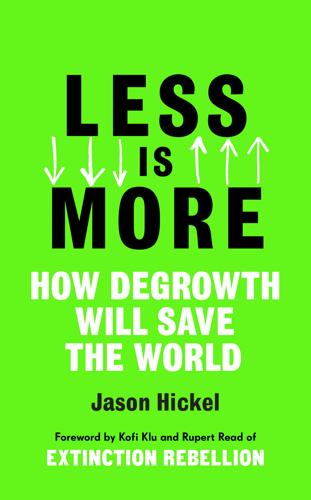
Less Is More: How Degrowth Will Save the World
by
Jason Hickel
Published 12 Aug 2020
Wages rose to levels higher than ever before in recorded history, doubling or even tripling in most regions and in some cases rising as much as sixfold.6 Rents declined, food became cheap, and nutrition improved. Workers were able to bargain for shorter working hours and weekends off, plus benefits like meals on the job and payment for each mile they had to travel to and from work. Women’s wages shot up too, narrowing what under feudalism had been a substantial gender pay gap. Historians have described the period from 1350 to 1500 as ‘the golden age of the European proletariat’.7 It was a golden age for Europe’s ecology, too. The feudal system had been an ecological disaster. Lords put peasants under heavy pressure to extract from the land and forests while giving nothing back.
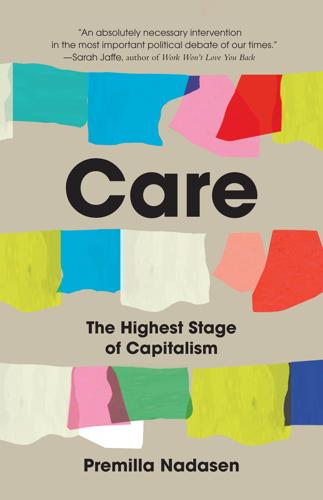
Care: The Highest Stage of Capitalism
by
Premilla Nadasen
Published 10 Oct 2023
One of our first interviews was with a job training program, Women in Construction (WinC), run by the nonprofit Moore Community House in Biloxi. Initiated during Hurricane Katrina, which devastated the Mississippi Gulf Coast, the program enabled poor women on public assistance to access higher-paying construction trades to make a dent in the gender-pay gap. It did so by giving participants practical skills, a stipend, and childcare. About twenty of us were sitting in a circle at Moore Community House—fifteen trainees and five of us from Barnard College. The trainees were mostly African American, with some Latinx and white women. The previous night, the eight students, the course assistant, and I crammed into my Best Western hotel room to review our list of questions.
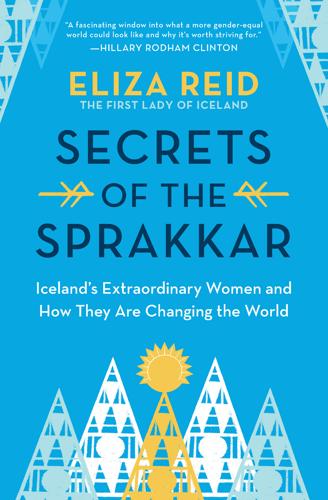
Secrets of the Sprakkar
by
Eliza Reid
Published 15 Jul 2021
It would instead be a “day off.” After all, what employer would not permit his or her employee to take a day off? Many men, it should be noted, were very encouraging of the protest. Despite the impact of the event on society on that day and in subsequent years, at the time of writing forty-five years later, the gender pay gap still has yet to be eliminated, and every few years on October 24, Iceland’s women leave work early at the time they have been paid as much as they should be. On the first day off, that was 2:05 p.m.; in 2016, it was 2:38 p.m., and 3:01 p.m. in 2020. Chapter 9: No Woman Is an Island 42For figures in the United States, see Phillip Connor and Abby Budiman, “Immigrant Share in U.S.
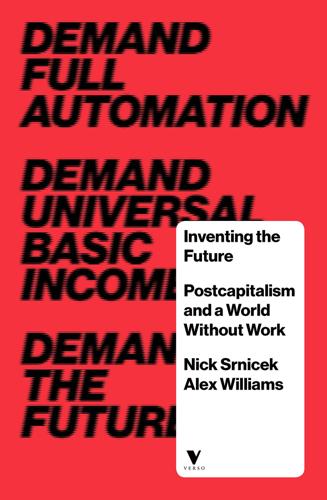
Inventing the Future: Postcapitalism and a World Without Work
by
Nick Srnicek
and
Alex Williams
Published 1 Oct 2015
Contemporary service work heightens this phenomenon. In the absence of clear metrics for productivity, workers instead put on performances of productivity – pretending to enjoy their job or smiling while being yelled at by a customer. Working long hours has become a sign of devotion to the job, even as it perpetuates the gender pay gap.131 With work tied so tightly into our identities, overcoming the work ethic will require us overcoming ourselves. The central ideological support for the work ethic is that remuneration be tied to suffering. Everywhere one looks, there is a drive to make people suffer before they can receive a reward.
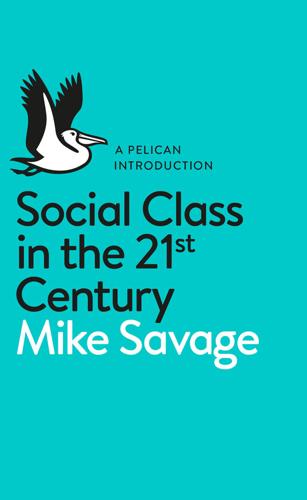
Social Class in the 21st Century
by
Mike Savage
Published 5 Nov 2015
Those occupations directly associated with finance see especially marked differences. Financial intermediaries from higher managerial and traditional professional backgrounds earn on average £24,000, nearly 40 per cent, more than those from routine and semi-routine backgrounds. Let us reflect further on this. We are quite rightly troubled by the existence of a gender pay gap within many occupations, which can be as much as 50 per cent in some managerial occupations. But it also appears that there is a ‘social class background pay gap’. Those who are best paid in many elite occupations are those who come from the most advantaged backgrounds. This ‘class salary gap’ regularly reaches 25 per cent in many of the more affluent occupations, but this has never previously come to light and should also be a cause for concern.
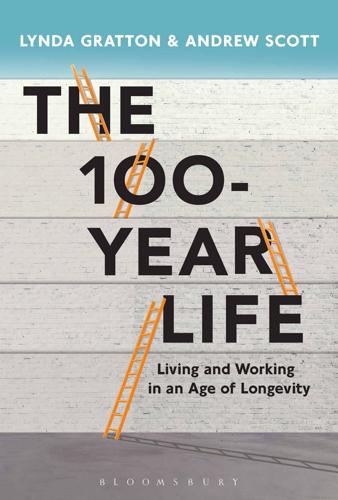
The 100-Year Life: Living and Working in an Age of Longevity
by
Lynda Gratton
and
Andrew Scott
Published 1 Jun 2016
Or Jane could choose another career all together, one that has greater time flexibility, fewer clients and contact hours, more independence in determining tasks, and more projects with discretion over them. These are jobs that have what Goldin calls elasticity and her analysis shows that they are more likely to be found in technology and science, where the gender pay gap is small and does not widen over time. It is interesting, of course, that these are not the occupations to which women are currently flocking. One example would be the profession of pharmacy. Goldin’s analysis shows this is an occupation where there is currently a high degree of substitution, so that if one pharmacist is away, then another can take their place with ease.
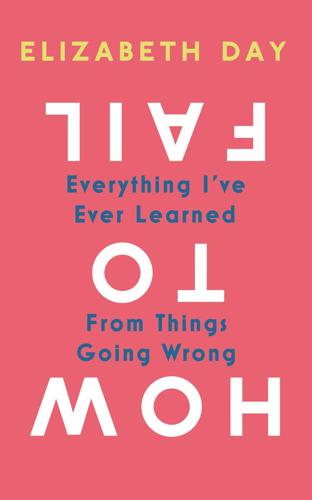
How to Fail: Everything I’ve Ever Learned From Things Going Wrong
by
Elizabeth Day
Published 3 Apr 2019
Among 78 masters-degree students, she found that just 12.5 per cent of women negotiated for their starting salary, versus 52 per cent of men. That led, by her estimate, to as much as $1.5 million in lost income over the woman’s career. That is now changing, thanks to a new generation of women who are less scared than I was to ask for what they deserve, but the pace is slow. The gender pay gap still exists and at the time of writing, female chief executives in the FTSE 100 were outnumbered by CEOs called David. I was at the Observer for eight years. I never once asked for a pay rise, despite considering myself a feminist. Instead, I simply carried on saying yes. I was nodding and pliant and pleasant.
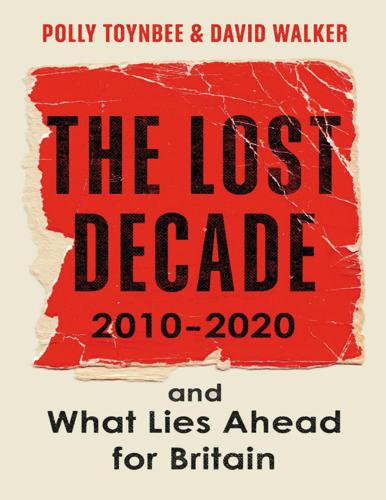
The Lost Decade: 2010–2020, and What Lies Ahead for Britain
by
Polly Toynbee
and
David Walker
Published 3 Mar 2020
You can plot the popularity of Downton Abbey or Peaky Blinders against economic and societal trends (or, in the latter case, against Birmingham’s sense of identity), but the fit isn’t neat. In sports, women’s cricket, football and rugby rose in prominence over the decade, paralleling the response to #MeToo, but a gender pay gap persisted. This chapter tries to match political and economic circumstances to how we produced and consumed culture and what we told pollsters about our state of mind. Courting Failure Headline sporting achievement belied austerity. You won’t get, for example, a Liverpool supporter saying otherwise.
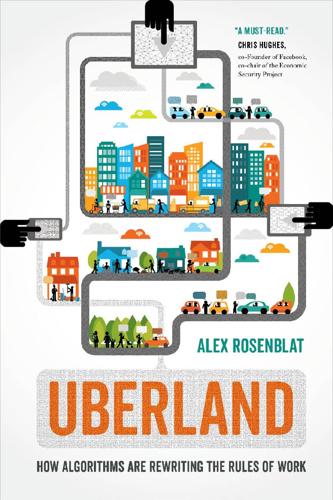
Uberland: How Algorithms Are Rewriting the Rules of Work
by
Alex Rosenblat
Published 22 Oct 2018
In 2017, a New York Times report citing internal documents at Uber indicated that “roughly a quarter of its drivers turn over on average every three months,” and Alison Griswold estimated in her weekly newsletter Oversharing that Uber’s one-year retention rate is between 15 percent and 25 percent.44 The problem of driver churn is complicated by driver motivations, but Uber’s employment model relies on a constant influx of new drivers who can be hired quickly to compensate for poor retention rates. By 2018, Uber published a study on the gender pay gap of its workforce indicating that 68 percent of its U.S. drivers have a six-month attrition rate, and the rate of attrition is higher for women than men.45 Hobbyists like Nathan from L.A., Carol from Charleston, and Steven from Toronto, who continue to drive despite declining earnings, represent workers who are motivated substantially by nonfinancial values and are usually better positioned to absorb pay cuts.

Sex Power Money
by
Sara Pascoe
Published 26 Aug 2019
I now know that erotic capital is a value that we all possess, calculated on our sexual attractiveness and exchangeable for other forms of capital – money or services or goods. As in all economies, some of us are richer than others. It’s not fair. Kalinda made a fascinating point in her dissertation about the gender pay gap being easily bridged by how much more money men are willing to spend on sexy women than women are willing to spend on sexy men. My friend Carla sells her erotic capital in a strip club and makes more than her equally gorgeous sister who works for an insurance company – the latter being an example, for Kalinda, of someone refusing to capitalise on their sexual attractiveness and thus ‘doing themselves a disservice’.
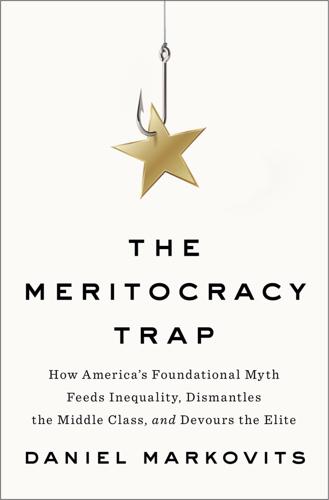
The Meritocracy Trap: How America's Foundational Myth Feeds Inequality, Dismantles the Middle Class, and Devours the Elite
by
Daniel Markovits
Published 14 Sep 2019
Only about 14 percent of the top executives (and just about 8 percent of the highest earners) in Fortune 500 companies are women, and more than a quarter of these companies have no women in top management; Wall Street remains overwhelmingly male-dominated; women make up only 18 percent of equity partners at American law firms; and the gender pay gap among doctors has widened in recent years. The intense personal involvement that elite education now demands, when overlaid on gender norms that distinctively bind mothers to parenting, rationalizes these patterns. The hours that superordinate work requires are incompatible with bearing (let alone raising) children.
…
On the other hand, middle-class men traditionally dominated the jobs—quintessentially in manufacturing—that have been lost or seen wage stagnation in recent decades, even as many of the service jobs that have displaced them are conventionally done by middle-class women. (In fact, progress in diminishing the gender pay gap overall principally comes courtesy of declining wages for men without a college degree.) Moreover, poorer men are less successful than poorer women at acquiring the schooling needed to secure better jobs in a meritocratic labor market: men make up only 42 percent of college students from households with annual incomes below $30,000.
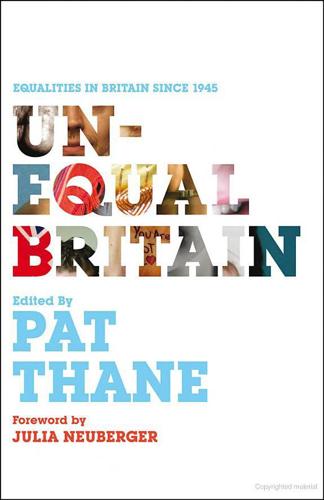
Unequal Britain: Equalities in Britain Since 1945
by
Pat Thane
Published 18 Apr 2010
The comparable figures for other occupations are: local authority chief executives, 13.1/19.5; senior ranks in the armed services, 0.6/0/9; senior police officers, 7.5/11/9; senior judges, 6.8/9.6; civil service top management, 22.9/26.6; head teachers in secondary schools, 30.1 in 2003 and 34.1 in 2006 (2007/8 figures are not available for this group).52 There has been progress, but it is very slow. There is also a continuing gender pay gap at all levels of employment, currently 17 per cent, on average, in the United Kingdom. This is comparable with Denmark (also 17 per cent), Norway (16 per cent) and Sweden (16 per cent), and better than the United States (22.4 per cent), but worse than Australia (14.1 per cent).53 The gaps at specific levels of employment in 2003 are shown in the table below: Table 5.1 Average hourly earnings of full-time employees: 2003 Occupation Managers and senior officials Professionals Administrative and secretarial Skilled trades Personal service Sales and customer service Women (£) Men (£) 15.60 17.47 8.91 7.71 7.19 6.99 21.00 19.12 9.99 9.80 7.90 8.03 Source: Interim Update of Key Indicators of Women’s Position in Britain, Women and Equality Unit (London, Department of Trade and Industry, 2004).
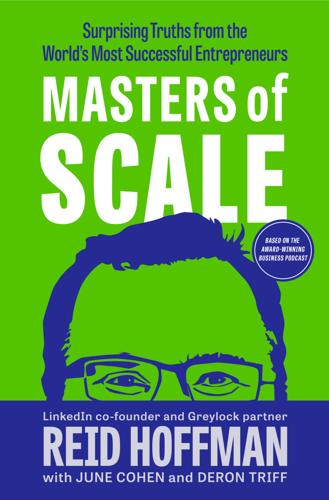
Masters of Scale: Surprising Truths From the World's Most Successful Entrepreneurs
by
Reid Hoffman
,
June Cohen
and
Deron Triff
Published 14 Oct 2021
The idea you were born to do After two decades on Wall Street, Sallie Krawcheck knew that something was missing—and that she might be just the person to create it. As an investment analyst, Sallie became aware of an issue she called “the gender investing gap.” Everyone knows about the gender pay gap, but this was something altogether different, and within it was an opportunity. A woman making $85,000 typically keeps 71 cents of every salary dollar in cash—which means she is investing far less than her male counterpart. “This can cost a woman a million dollars over her life,” Sallie notes.

Corbyn
by
Richard Seymour
But any chance of this becoming an organised breach between the union leadership and the party leadership was neutralised by the decision of the National Policy Forum in Warwick to offer the unions a series of incentives to remain in the fold. The offer was modest, comprising some employment rights such as restrictions on firing striking workers, and a promised review on the gender pay gap.53 But this was the classic quid pro quo for the unions – squeezing for reforms in exchange for loyalty within the overarching policy framework. With this agreement under its belt, the anti-war movement still powerful but receding, and the Tories still stuck with an unpopular Thatcher-era relic as their leader, New Labour could go into the next general election with a war treasury supplied by the unions.
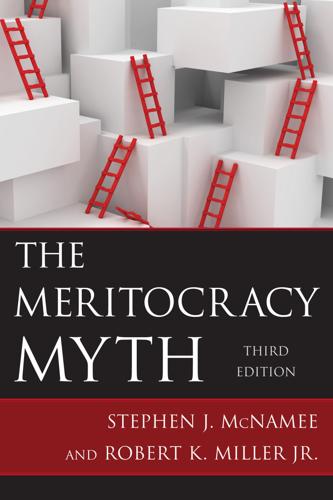
The Meritocracy Myth
by
Stephen J. McNamee
Published 17 Jul 2013
Madison: University of Wisconsin, Industrial Relations Research Association. Blau, Francine D. 2012. “The Sources of the Pay Gap.” In The New Gilded Age: The Critical Inequality Debates of Our Time, ed. David B. Grusky and Tamar Kricheli-Katz, 189–208. Stanford, California: Stanford University Press. Blau, Francine D., and Lawrence M. Kahn. 2006. “The Gender Pay Gap: Going, Going . . . but Not Gone.” In The Declining Significance of Gender?, ed. Francine D. Blau, Mary C. Brinton, and David B. Grusky, 37–66. New York: Sage. Bocian, Debbie Gruenstein, Wei Li, and Keith S. Ernst. 2010. Foreclosures by Race and Ethnicity: The Demographics of a Crisis. Durham, NC: Center for Responsible Lending.
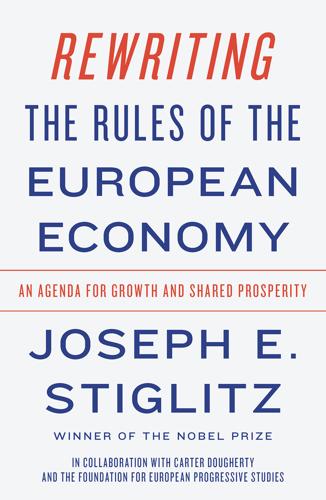
Rewriting the Rules of the European Economy: An Agenda for Growth and Shared Prosperity
by
Joseph E. Stiglitz
Published 28 Jan 2020
in Karl Widerquist, José A. Noguera, and Yannick Vanderborght, eds., Basic Income: An Anthology of Contemporary Research (Oxford: Wiley-Blackwell, 2013), 216–29. CHAPTER 9: LABOR MARKETS, GOOD WAGES, AND WORKING CONDITIONS 1. According to the ILO’s Global Wage Report 2018/19: What Lies behind Gender Pay Gaps (Geneva: International Labour Organization, 2018), the median increase of real wages in northern, southern, and western Europe in the decade 2008–2017 has been 0.7 percent: https://www.ilo.org/global/research/global-reports/global-wage-report/2018/lang--en/index.htm. 2. One of the key reasons for the decline in income (instead of the growth, which was predicted by the Troika) was that lower wages decreased demand for non-traded goods, and the contraction in that part of the economy more than offset any expansion in exports.

The Smart Wife: Why Siri, Alexa, and Other Smart Home Devices Need a Feminist Reboot
by
Yolande Strengers
and
Jenny Kennedy
Published 14 Apr 2020
Without the ability to thrust or move either his groin or tongue, he is unable to provide much in the way of clitoral stimulation or oral sex for women. Henry’s ability to penetrate—with a large penis—is his claim to fame. What’s clearly evident here is how these sexbots are made to serve a relatively narrow range of male pleasure. We’ve all heard of the gender pay gap, but what about the gender orgasm gap: the difference between female and male sexual pleasure? Psychology professor and sex therapist Laurie Mintz devotes considerable attention to this gap in her book Becoming Cliterate.49 “The orgasm gap,” explains Mintz, “refers to the fact that in heterosexual sexual encounters, men have more orgasms than women.”

Exponential: How Accelerating Technology Is Leaving Us Behind and What to Do About It
by
Azeem Azhar
Published 6 Sep 2021
At the same time, governments might explore how to mitigate the growing wage differentials between the richest and the poorest workers. One way to make this more likely would be through greater wage transparency. Firms already disclose how much they pay their top directors, and increasingly share data on the gender pay gap. Encouraging companies to share more information about their wage practices would illuminate the problem of income disparity. This perhaps all sounds utopian. And it’s true: closing the clutch of exponential gaps in the workplace will take great effort. But it is far from impossible. In fact, there are a number of organisations who are already working to close those gaps.
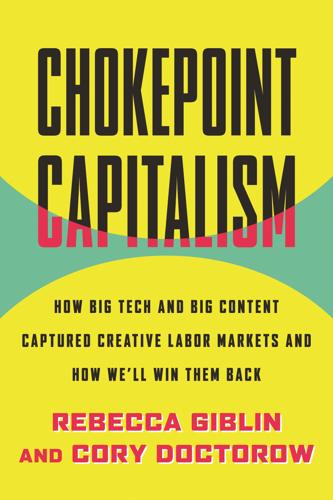
Chokepoint Capitalism
by
Rebecca Giblin
and
Cory Doctorow
Published 26 Sep 2022
And since big companies force other companies in their supply chains to get big too, even if your part of your industry doesn’t look like these labor markets yet, it’s only a matter of time if things keep heading in this direction. There are, in short, thousands of issues waiting to be turned into a movement, and billions of people who stand to benefit from such a coalition. In fact, it’s hard to think of a progressive movement this fight doesn’t touch: worried about racial and gender pay gaps? Well, chokepoint firms preferentially suppress and steal the wages of racialized people and women. Worried about access to healthy food? Chickenizers process food beyond recognition and make it as addictive as possible to weasel themselves between the people who eat it and the farmers who grow it, all to increase their share.
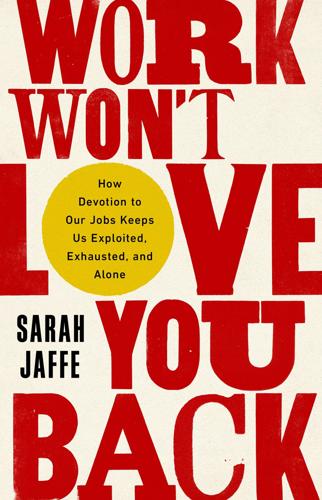
Work Won't Love You Back: How Devotion to Our Jobs Keeps Us Exploited, Exhausted, and Alone
by
Sarah Jaffe
Published 26 Jan 2021
Far from being the “bad mother” of the stereotype, she was making a decision to put her child’s welfare first. 62 But while the nuclear family might be mutating and falling apart, gendered assumptions around unpaid work—and who will do it—have not changed nearly enough. The pesky, persisting gender pay gap is explained in part by women’s continuing responsibility for doing unpaid care work. What sociologist Arlie Russell Hochschild called the “second shift” remains in effect. Research in the United Kingdom in 2016 found that women still did nearly twice as much housework as men. US-based research showed that mothers working outside the home these days spend just as much time caring for children as mothers did in the 1970s, when their only job was in the home.
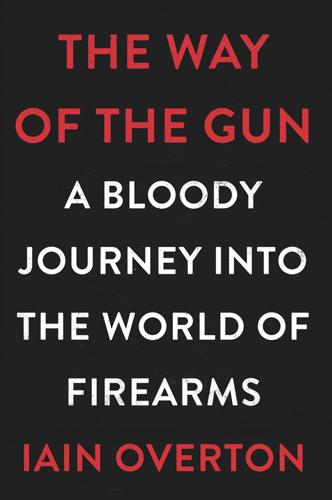
The Way of the Gun: A Bloody Journey Into the World of Firearms
by
Iain Overton
Published 15 Apr 2015
Data from the National Department of Arms and Explosives on applications for firearms licences, 2008–09; http://www.smallarmssurvey.org/fileadmin/docs/A-Yearbook/2013/en/Small-Arms-Survey-2013-Chapter-2-EN.pdf 8. http://www.theguardian.com/money/2013/dec/18/what-are-the-best-paid-jobs-uk-2013 9. Lawrence Mishel, Josh Bivens, Elise Gould, Heidi Shierholz, The State of Working America, 12th edition (Ithaca, NY: Cornell University Press, 2012). 10. http://www.aauw.org/research/the-simple-truth-about-the-gender-pay-gap/ 11. http://youliveyourlife.com 12. http://historynewsnetwork.org/article/154225 13. http://store.waltherarms.com/very-tough-ppx-shirt.html 14. http://www.salon.com/2012/12/17/bushmasters_horrible_ad_campaign/ 15. Small Arms Survey, Unfinished Business (Oxford: Oxford University Press, 2006), p. 317; http://www.smallarmssurvey.org/fileadmin/docs/A-Yearbook/2006/en/Small-Arms-Survey-2006-Chapter-12-EN.pdf 16. http://kdvr.com/2012/12/28/colorado-columnist-assault-rifle-owners-have-tiny-penises/ 17. http://www.bloombergview.com/articles/2013-03-08/how-brazil-exploited-sexual-insecurity-to-curb-guns-an-interview-with-antonio-bandeira 18.
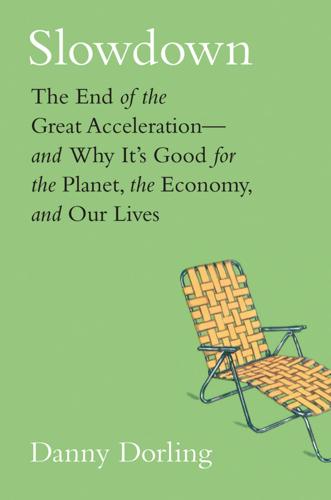
Slowdown: The End of the Great Acceleration―and Why It’s Good for the Planet, the Economy, and Our Lives
by
Danny Dorling
and
Kirsten McClure
Published 18 May 2020
Dayong Zhang, Ziyin Liu, Gang-Shi Fan, and Nicholas Horsewood, “Price Bubbles and Policy Interventions in the Chinese Housing Market,” Journal of Housing and the Built Environment 32 (2017): 133–55, doi:10.1007/s10901-016-9505-6. 40. Francisco Becerril, “The Sign of China’s ‘Rebound’ May Be a Housing Bubble,” Financial Times, 25 April 2019, https://www.ft.com/content/71d237aa-6520-11e9-9adc-98bf1d35a056. 41. International Labour Organisation, Global Wage Report 2018/19: What Lies behind Gender Pay Gaps (Geneva: International Labour Office, 2018), https://www.ilo.org/wcmsp5/groups/public/---dgreports/---dcomm/---publ/documents/publication/wcms_650553.pdf. 42. Bruce Knuteson, “How to Increase Global Wealth Inequality for Fun and Profit,” Social Science Research Network, 12 November 2018, https://papers.ssrn.com/sol3/papers.cfm?

Overwhelmed: Work, Love, and Play When No One Has the Time
by
Brigid Schulte
Published 11 Mar 2014
But for women ages thirty-five to forty-four, the gap widens to 79 percent and expands again for women forty-five to fifty-four to 73 percent, where it stays until age sixty-five. At that point, women earn about 85 percent of what men do. 26. Michelle J. Budig, professor of sociology, faculty associate, Center for Public Policy Administration, University of Massachusetts, Amherst, before the U.S. Joint Economic Committee hearing on “New Evidence on the Gender Pay Gap for Women and Mothers in Management,” September 28, 2010, included in the report, United States General Accounting Office, Invest in Women, Invest in America: A Comprehensive Review of Women in the U.S. Economy, prepared by the majority staff of the Joint Economic Committee, Congress of the United States, December 2010, 124–42.
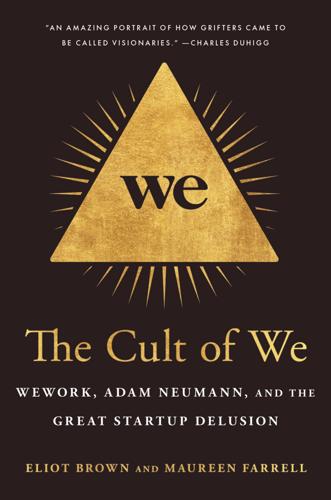
The Cult of We: WeWork, Adam Neumann, and the Great Startup Delusion
by
Eliot Brown
and
Maureen Farrell
Published 19 Jul 2021
In the aftermath of the Anaya suit, some members of senior management sought to make changes to allay the staff’s concerns. They revamped HR and started receiving and investigating far more claims with allegations of incidents similar to those experienced by Anaya. The company sought to examine compensation and improve any gender pay gaps. Still, few saw wholesale change. A lawsuit brought in the spring of 2019 would reveal that fifty-eight executives were given new compensation packages worth more than $1 million. Just three were women. It wasn’t just compensation. The board was all male. Nearly every top executive at the company was a man, and executive activities that involved being around Neumann tended to appeal to men, too.

Like, Comment, Subscribe: Inside YouTube's Chaotic Rise to World Domination
by
Mark Bergen
Published 5 Sep 2022
Its organizers hadn’t stopped at a march but presented five demands, which included an end to pay inequity and an employee seat on the corporate board. Shortly after the walkout Stapleton and a few other women from YouTube held a private meeting with their CEO. Wojcicki had confided to some staff that she knew nothing of charges against Andy Rubin and felt disgusted by them. In this meeting her employees raised concerns about YouTube’s gender pay gaps and its scarcity of Black leadership. Wojcicki indicated ignorance of these gaps and told them YouTube would right these disparities. After the meeting disbanded, a colleague turned to Stapleton and said, “She’s completely lying.” Wojcicki knew the data, they concluded, but was deflecting responsibility.
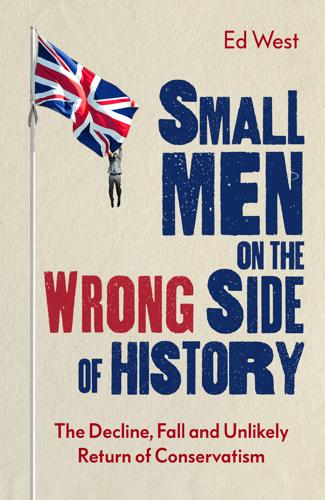
Small Men on the Wrong Side of History: The Decline, Fall and Unlikely Return of Conservatism
by
Ed West
Published 19 Mar 2020
Of course, the problem is that having children is expensive, what the Economist rather strangely called the ‘child penalty’.6 Getting married increases both partners’ long-term financial prospects, acting as a security against poverty, but having children vastly decreases a woman’s income, and is the biggest factor explaining the gender pay gap. Various studies show this fairly conclusively, and that even maternity leave makes little difference, with evidence from several countries all producing the same results, including Denmark, Sweden and New Zealand.7 Every time this issue comes up as a major national scandal a couple of free-market think-tanks will point this out, no one will pay attention, and people will keep on believing it’s just sexism.
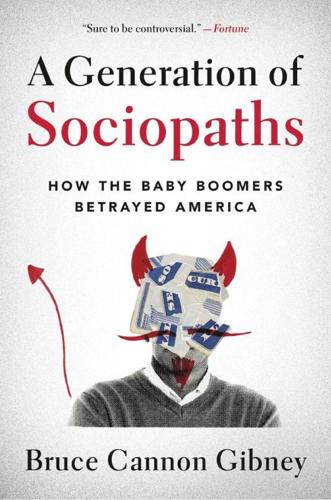
A Generation of Sociopaths: How the Baby Boomers Betrayed America
by
Bruce Cannon Gibney
Published 7 Mar 2017
For a particularly bizarre example of the renewed debate over abortion, there is, of course, the example of Trump. Krieg, Gregory. “Donald Trump’s 3 Positions on Abortion in 3 Hours.” CNN, 31 Mar. 2016, www.cnn.com/2016/03/30/politics/donald-trump-abortion-positions/index.html. 22. White House, Council of Economic Advisors. Issue Brief. “Gender Pay Gap: Recent Trends and Explanations,” April 2015, p. 1, www.whitehouse.gov/sites/default/files/docs/equal_pay_issue_brief_final.pdf. 23. Cooper, Rob. “Inside Apple’s Chinese ‘Sweatshop’ Factory Where Workers Are Paid Just £1.12 Per Hour to Produce iPhones and iPads for the West.” Daily Mail, 25 Jan. 2013, http://www.dailymail.co.uk/news/article-2103798/Revealed-Inside-Apples-Chinese-sweatshop-factory-workers-paid-just-1-12-hour.html (based on reporting originally conducted by Nightline). 24.
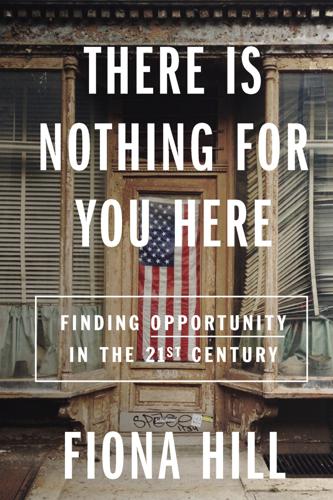
There Is Nothing for You Here: Finding Opportunity in the Twenty-First Century
by
Fiona Hill
Published 4 Oct 2021
I was also a white-collar professional, so already in a different compensation bracket from most women. The situation remained far worse for single women in other jobs, and especially for single mothers. In their case, the wage discrimination and the consequences of years of forfeited earnings from the gender pay gap were passed on to their children, impinging on the opportunities and life chances of the next generation. My Brookings colleague Isabel (Belle) Sawhill devoted her long career as an economist to researching the socioeconomic factors shaping the lives of women and children in America. In a 2018 book, The Forgotten Americans, Belle describes how families and schools become the early determinants of future opportunity for children in the United States.
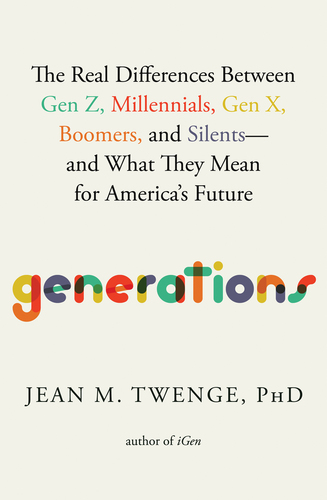
Generations: The Real Differences Between Gen Z, Millennials, Gen X, Boomers, and Silents—and What They Mean for America's Future
by
Jean M. Twenge
Published 25 Apr 2023
And although men still make more money than women, the gender gap in incomes has narrowed considerably. While 25- to 34-year-old women in 1980 made about $25,000 a year less than men, by 2021 they made about $10,000 less than men. This should be good news for most Millennial families, with more money coming in. But the narrowed gender pay gap can create a dilemma for heterosexual couples: If the woman quits her job when children arrive, the family will lose more income than families did in past generations. If she keeps her job, the couple must find childcare—and the price of childcare has far outpaced inflation. So for Millennials to keep the same level of income previous generations did, it’s more likely that both the man and the woman will need to work, and then they are on the hook for childcare.

This Is How They Tell Me the World Ends: The Cyberweapons Arms Race
by
Nicole Perlroth
Published 9 Feb 2021
Our enemies were not just learning from us; they were learning from each other. “Destructive alarm bells should have gone off,” Panetta told me. Instead, the media coverage homed in on the leaked emails, in which Sony executives panned Adam Sandler films and called Angelina Jolie “a minimally talented spoiled brat.” The emails also revealed stunning racial and gender pay gaps. The studio was the victim of the attack, and yet it was the one coming under harsh public scrutiny. Amy Pascal, Sony’s cochairman, resigned in the wake of the attack, after emails showed her mocking the movie-viewing habits of President Obama. The leaked emails were derogatory enough that media outlets ate them up, while repeatedly glossing over their provenance.
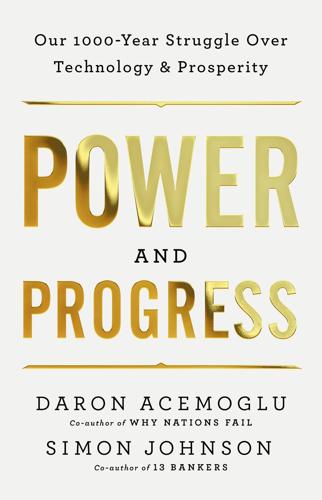
Power and Progress: Our Thousand-Year Struggle Over Technology and Prosperity
by
Daron Acemoglu
and
Simon Johnson
Published 15 May 2023
Many women were still locked in patriarchal power relations within families and their communities. This had begun changing after enfranchisement earlier in the century and then accelerated with the entry of women into the labor force during and after World War II and with broader changes in social attitudes. As a result, in the postwar decades women’s economic conditions improved, and the gender pay gap narrowed. Nevertheless, discrimination in the family, schools, and workplaces continued. Greater gender parity in managerial positions and in terms of pay, as well as greater social liberation, has been slow in coming. Minorities fared worse. Although the economic conditions of Black Americans had started improving and the wage gap between them and White Americans narrowed in the 1950s and 1960s, the US remained a racist society, especially in the South.